

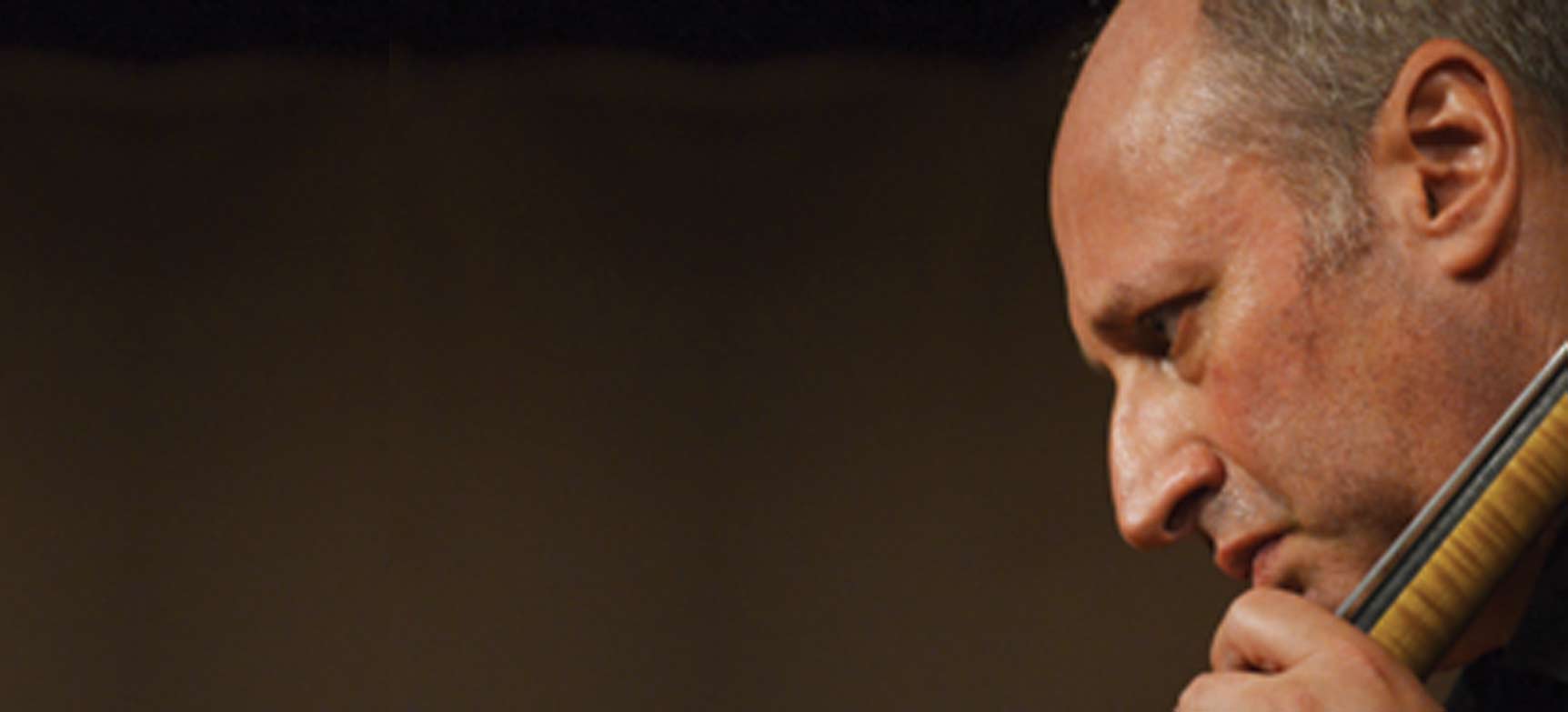
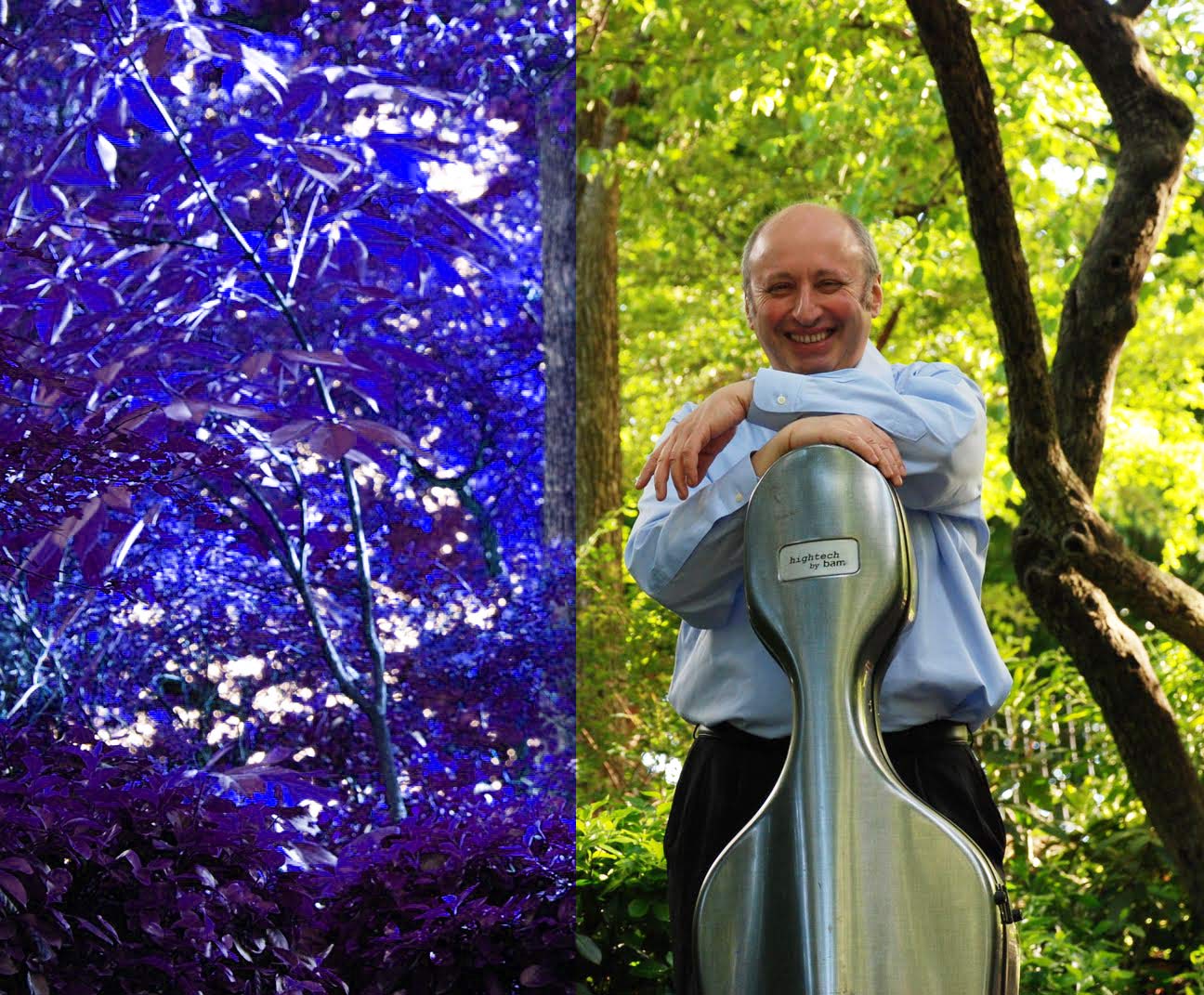
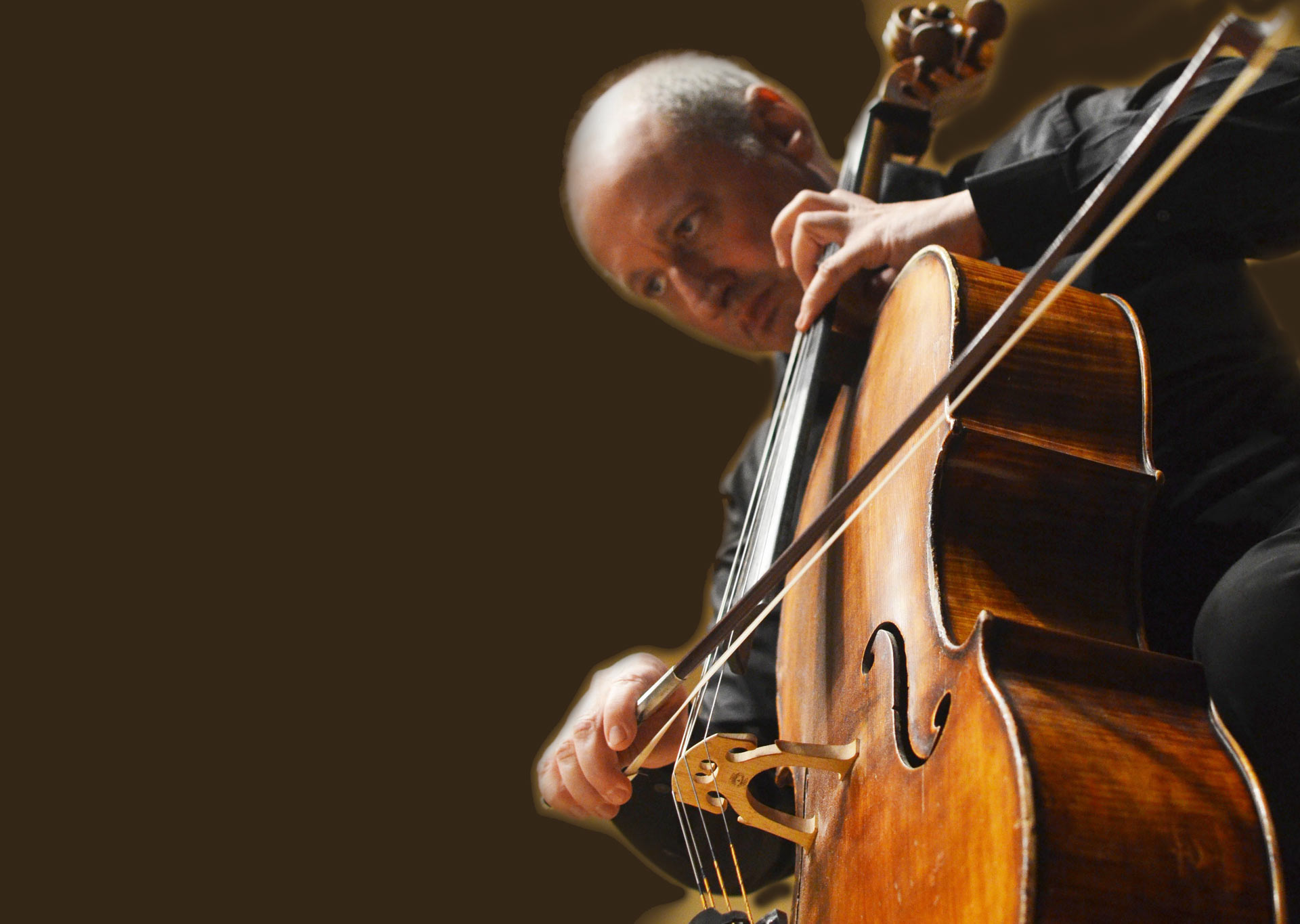
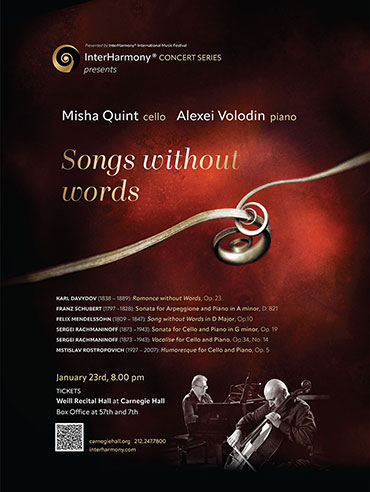

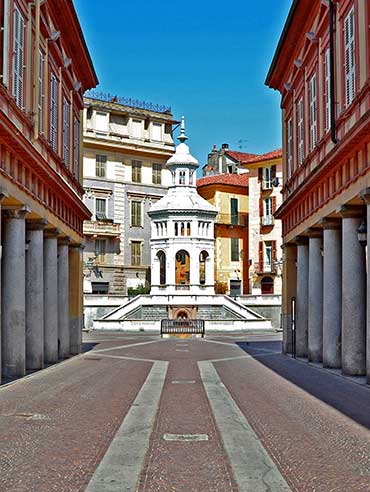
MISHA QUINT was described by the renowned music critic Harris Goldsmith as a "brilliantly accomplished cello virtuoso - an embodiment of interpretive and executive music-making at its rarefied best". Daniel Webster of the Philadelphia Inquirer attested Quint a “fresh voice and “a master of probing sentiment, shaded phrasing, and flawless technique”.
Quint’s repertoire ranges from Bach to the most challenging contemporary composers, including Alfred Schnittke, Sophie Goubadalina, Robert Sirota, Shulamit Ran, Steven Gerber, Nathan Davis, Ezra Laderman, and Stepan Lucky.
Recent engagements include appearances with the San Remo Symphony in Italy, the Thüringen Symphony Orchestra in Rudolstadt, performing with Nikoaj Szeps-Znaider, Guy Braunstein, Alexei Volodin, Saleem Ashkar, Andrey Baranov, Daniel Stewart, and Oliver Weder. He has given numerous solo recitals and master classes in the leading halls of England, Germany, Switzerland, Ireland, Russia, Latvia, Georgia, Belorussia, Romania, Italy, and the US.
Quint has performed at Lincoln center Avery Fisher Hall, Carnegie Hall, Alice Tully, Lincoln center with the New York Chamber Symphony, Metropolitan Symphony, the London Soloists Chamber Orchestra at Queen Elizabeth Hall, Brooklyn Philharmonic, Settlement Music School in Philadelphia, Leningrad Philharmonic Orchestra, Moscow State Symphony Orchestra, Leningrad State Orchestra, Orchestra of Classical and Contemporary Music, National Irish Symphony, the Orquestra Sinfônica do Teatro Nacional do Brasilia and with the Symphony Orchestras of Latvia and Georgia among others. He is founder of InterHarmony Concert Series at Carnegie Hall New York.
He has worked with distinguished conductors including Maxim Shostakovich, Paul Lustig Dunkel, Colman Pearce, Sidney Harth, Ravil Martinov, Yakov Bergman, and Ira Levin. Quint is an active chamber musician and has performed with such artists as Nikolai Znaider, Vadim Repin, Shlomo Mintz, Bela Davidovich, Bruno Canino, Julian Rachlin, Jean-Bernard Pommier, Sherban Lupu, Boris Kushnir, and Mikhail Kopelman.
Quint’s recording of Tchaikovsky’s Valse Sentimentale is featured in the 2022 Italian Netflix production of Fedeltà. Quint captured the gold medal in the March 2016 Global Music Awards for his recording, Matryoshka Blues, on the Blue Griffin label in three categories: instrumentalist, album, and new release, and was featured in the top five spring albums in Global Music Awards. Quint’s discography includes Live Cello Recitals and Valse Sentimentale on the Volshebnik Productions Label, and the 2014 release of Tempo Trapezio and 2016 release of Matryoshka Blues on the Blue Griffin Label.
As a special guest artist, Misha Quint has been a performer in broadcast performances in Westchester, NY; "The Jewish Entertainment Hour"; German Television, Italian Television, RTN/WMNB; and live radio broadcast recitals on WQXR's "The Listening Room", WGBH (Boston), WMNB (NJ), WNYC (NY).
Misha Quint is deeply committed to teaching and is Music Director and Founder of InterHarmony International Music Festival. He has been on the faculty of the International Institute of Music in Marktoberdorf, Germany, and was Music Director and Founder of the Soesterberg International Music Festival in Holland from 1998 – 2007, the Intensive Cello Studies Abroad in Blonay, Chalet de lacroix at the Hindemith Foundation in 1997, InterHarmony International Music Festival in Geneva, Switzerland in 2000, The Berkshires, Massachusetts from 2007 – 2008, San Francisco, California in 2009, Hinterzarten, Schwarzwald, Germany from 2008 – 2011, in Tuscany, Italy from 2012 – 2016, presently in Acqui Terme, Italy since 2017, and since 2005 in Sulzbach-Rosenberg, Bavaria, Germany.
A graduate of the Leningrad Special School for the Gifted and the Leningrad State Conservatory, Misha Quint made his orchestral debut at the age of 13 after winning first prize at the Boccherini Competition in St. Petersburg (then Leningrad). He gained international recognition after capturing top prizes in the 1975 International Competition in Prague and the Russian National Competition. Quint made his orchestral debut in Avery Fisher Hall at Lincoln Center in 1992. Quint studied with Emmanuel Fishman, Natalia Gutman, Boris Pergamenshikov, and Daniil Shafran. Quint captured first prize of the CRS National competition in 2009, was a featured performer at The Festival of the Musical Citadel in Brasov, Romania in August 2013 and 2014. www.interharmony.com, www.srimf.com
Quint validated his confidence in his own art...a master of probing sentiment, shaded phrasing, and flawless technique. by Jerry Ben Asher, Metro West
The player's virtuosity provided a fresh voice...The Russian School of string playing has taken on a different light with Quint. by Daniel Webster, The Philadelphia Inquirer
Misha Quint, performs with strikingly virtuosic aplomb. Furious runs up and down the fingerboard, doublestops of flawless intonation, harmonic effects, huge vibrato and a compelling grasp of the possibilities of musical form characterizes his interpretations. by Helmut Fisher, Sulzbach-Rosenberg Zeitung
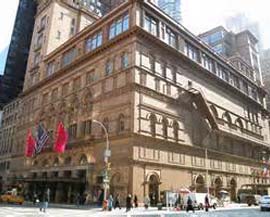
























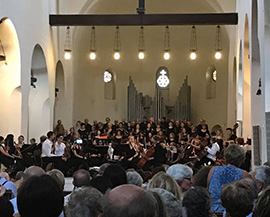



















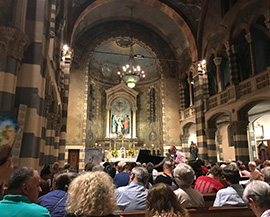


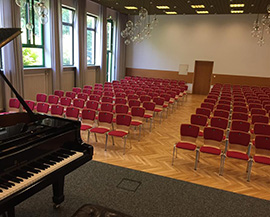




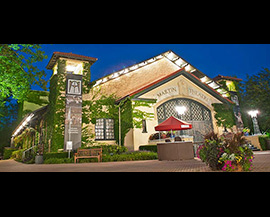

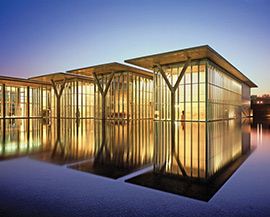

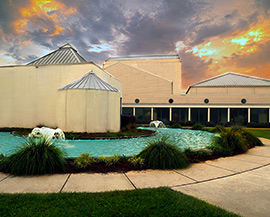

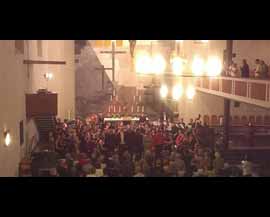
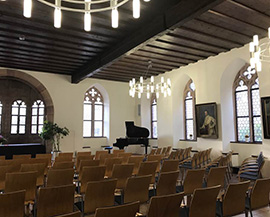





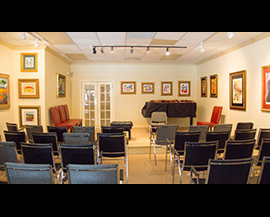
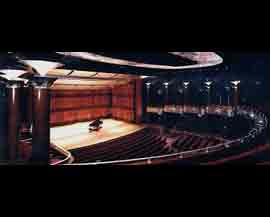
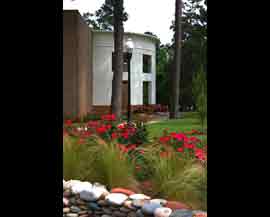
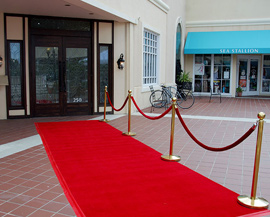


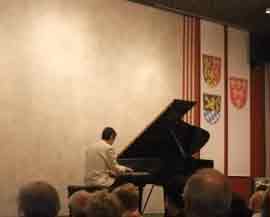






















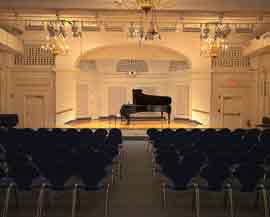














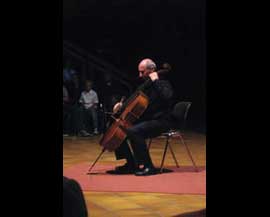
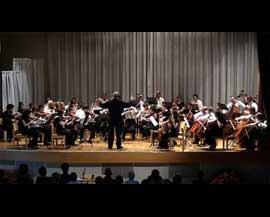



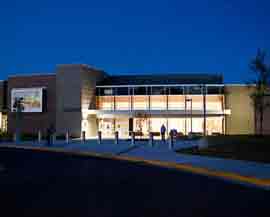

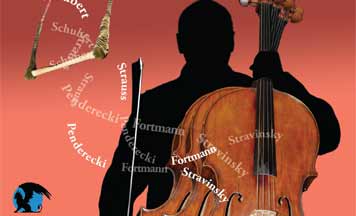
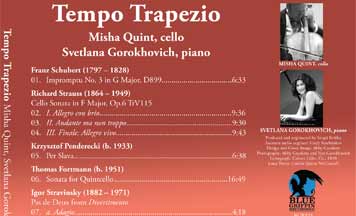
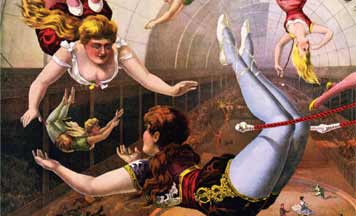

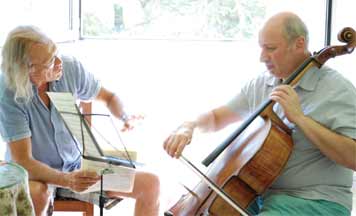
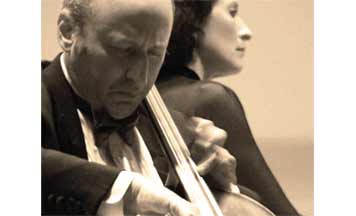
In September of 2014, virtuoso cellist Misha Quint releases his latest collaboration with pianist Svetlana Gorokhovich, "Tempo Trapezio" ("Time Trapeze"), on the Blue Griffin Label. With the death-defying agility of acrobats, Quint and Gorokhovich present a repertoire of both athletic difficulty and artistic poise: from Schubert's heart-melting Impromptu No.3 in G Major, D899 to Krysztof Penderecki's Per Slava for solo cello, dedicated to Rostropovich.
In this album, Quint explores the central medium of musical expression: time itself. Schubert's Impromptu is an almost improvisatory snapshot: an ex tempore, it seems to emanate directly "out of the moment", while standing outside the flow of time. Strauss's Cello Sonata in F Major, Op.6 captures late Romantic music's crisis in relation to time. From the threshold of a new era, Strauss looks back almost nostalgically at the classic forms in which time had been captured and contained: the sonata, the canon, the fugue. But all the while, his later dictum shines through: "new ideas must seek out new forms for themselves." In Penderecki's Per Slava, these ideas threaten to overrun all form. Written without bar lines or meter, much is left open to the interpretation of the cellist: time, no longer tamed by the composer, is the performer's partner in dance of complex and conflicting emotions.
Of course, musical innovation did not come to an end in the 20th century, as Quint demonstrates with his world premiere recording of Thomas Fortmann's Sonata for Quintcello. Dedicated to and premiered by Misha Quint, Fortmann's astonishing and inventive work combines the heights of modern compositional technique with the fury and joy of the rock music for which he first became famous at the age of 19.
Two highly theatrical, but little-known transcriptions by Stravinsky round out the album. Stravinsky found the theme for the first work, the Pas de Deux, in Tchaikovsky's Sleeping Beauty, a piece which had haunted him since his childhood. Newly transcribed for cello, it retains its balletic grace, fairytale charm – and wicked difficulty. The Chanson Russe, on the other hand, began life as a popular aria in Stravinsky's 1922 opera buffa, Mavra. Quint's almost human, vocal timbre captures perfectly the melancholy yearning of this Russian folk melody.
You can view more information about the CD on the Blue Griffin Label website.
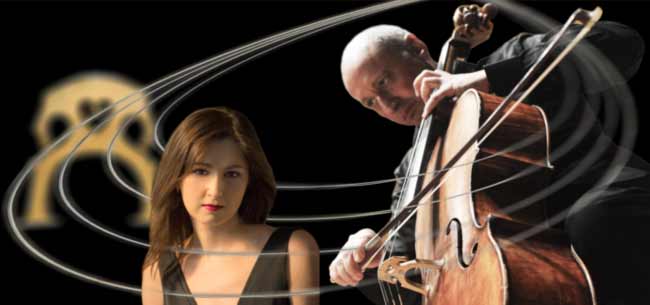
The InterHarmony International Music Festival presents the second in a series of three concerts on February 6, 2015 at 8 p.m. at the Weill Recital Hall. The program, featuring cellist Misha Quint, founder of IIMF, will consist of works created by and for the greatest cellists of the 19th and 20th centuries, from Klengel and Hausmann to Piatigorsky and Rostropovich. Pianist Inesa Synkevich will accompany. The IIMF's 2014-15 Series concludes May 7, 2015 with Rite of String, Part II, featuring distinguished students and faculty. For tickets call CarnegieCharge at 212.247.7800 or, for more information, go to www.interharmony.com.
Great composers are remembered forever, but the names, stories and achievements of great performers are often forgotten. Nevertheless, music's very existence depends upon them. More than mere mouthpieces, they are close collaborators, instigators, and creators in their own right. Carrying on this tradition, IIMF presents a program of music commissioned, arranged and composed by some of the greatest cello virtuosi of the last 200 years, in which they combine technical prowess with a deep and intimate knowledge of the essence of their instrument. Join us February 6th at Weill Recital Hall for an evening of cello music 'at the point': the apex of cello-playing from the hands of one of today's consummate masters.
Pulitzer Prize-winning Israeli-American composer Shulamit Ran's Fanstasy Variations for Cello are dedicated to the Julliard cellist André Emelianoff, an active supporter and commissioner of new music for the last several decades. A child prodigy, Ran began composing at the age of 7. Her "freely atonal" works develop organically towards a pure form of communication. Her compositional style finds emotional intensity by probing the limits of the instrument's potential: "I really get into the depth of the instrument's soul and try to ... find ways of making new music and the instrument come together in a manner that is meaningful and beautiful." In these unrestrained, almost improvisational variations, the cello takes on distinct personalities which converse in a kind of stream of consciousness. By experimenting with bravura techniques, Ran produces a wide range of timbres, her abstractions coming in and out of focus, condensing into baroque dances only to dissolve again into formless beauty.
Julius Klengel, though less well-known to the listening public, is a legend among cellists. Born into a musical family in Leipzig, he was quickly recognized as a wunderkind. By the age of 15, he was performing with the prestigious Gewandhausorchester. A gifted teacher, he wrote hundreds of technically demanding pieces to challenge his students. No dry study, his Opus 6 is a Scherzo: a 'joke.' Despite its nightmarish difficulty, it must be delivered with the playful timing of a punchline to come off. Its mischievous harmonic runs are as likely to coax a smile from the audience as they are to reduce the performer to tears.
Brahm's Cello Sonata Nr. 2 in F major belongs to his great late Classicism. He wrote it for a close friend, cellist Robert Hausmann, to whom it is dedicated and by whom it was first performed. Hausmann was a member of the Joachim Quartet, the most prestigious chamber group of its day, whose members, individually and as a group, were Brahms' closest collaborators. In the opening theme, the cello, in broken, yearning melodic fragments, seems to struggle against implacable opposition to reach into its highest registers. The famous adagio movement which follows, with its searching pizzicato lines, unexpected key changes, and warm, expressive chromaticism, contains some of Brahms' most memorable music.
Gregor Piatigorsky, Klengel's greatest student, is a legendary figure among cellists. Once described as "the greatest string player of all time," he brought the art of the cello to a previously unheard of level, despite living a life at least as dramatic as his music. After run-ins with Soviet authorities, he made a harrowing escape over the Polish border to seek musical freedom abroad. He was discovered by the conductor of the Berlin Philharmonic playing in a café, and soon became their principal cellist. As an active arranger, he expanded his instruments repertoire in unexpected directions. In particular, his arrangement of Haydn's baryton trios, the Divertimento in D major, rescued an overlooked jewel from obscurity. On the orders of his patron, Prince Nikolaus von Esterházy, a passionate amateur barytonist, Haydn had produced nearly 200 works featuring the now nearly forgotten instrument in various ensembles. By adapting the baryton part for its closest modern relative, the cello, Piatigorsky created a new piece of great beauty which preserves the character of Haydn's originals. Like most of the baryton trios, it begins with a slow, singing, galante movement; the finale, Allegro di molto, is fast and virtuosic, but maintains a pure sense of delight, rejoicing in its own difficulty with aristocratic elegance.
Rossini's 'prayer-aria' "Dal tuo stellato soglio," from Mosè in Egitto, was one of the most popular operatic numbers of his day. Moses, accompanied by a chorus of Israelites as they flee Egypt, prays to God to protect them from Pharaoh's approaching army. Their prayer, of course, is answered, but Rossini's preghiera captures the humble faith of the Israelites in the moment before they are delivered. In the same year he wrote Mosè, Rossini befriended Paganini, who was taking the first steps toward worldwide fame of his own. A master of the genre of variations, Paganini adapted his friend's beloved preghiera to his own needs as a traveling virtuoso of spectacular skill and showmanship. Much of his work as a composer includes, like this piece, firework displays of technical mastery, but rarely with such contagious exuberance. The variations are played on a single string to maintain a singular character throughout, challenging the performer to disguise the difficulty behind their melodic beauty. In 1937, the great performer and arranger Luigi Silva transcribed them for the cello as the Paganini-Silva Variations on a Theme of 'Moses' by Rossini.
Ravel's Vocalise-étude en forme de Habañera exploits the cellos unique proximity to the human voice, as well. Originally written as a wordless song to explore the expressive and technical possibilities of the bass voice, the Vocalise-étude was later transcribed by the composer for cello and piano. Its slides, runs and ornaments make this passionate aria for cello as dramatic as it is demanding. In this period of his work, Ravel, like Bizet before him, whose famous habañera from Carmen is echoed here, turned to Spain for new melodies and rhythms. For Ravel, this was more than a mere fashion, however: in this piece, in particular, he reaches back to the Basque and Spanish folk melodies his mother sang to him as a child.
Mstislav Rostropovich was, alongside Piatigorsky, one of the 20th century's most influential and accomplished cellists. Audiences and performers alike are in his debt for expanding the cello repertoire more than any cellist before him: by commissioning, premiering and championing new works - but also as a composer himself. As a student in Moscow, he was thought to be as promising a composer as a cellist. By his own account, he wrote and memorized his Humoresque, Op. 5, in the space of an evening, as a birthday present for his composition teacher the following day. Witty and joyous, stunning yet effervescent, it became one of his favorite encore pieces. Witty and joyous, stunning yet effervescent, it became one of his favorite encore pieces.
Cellist MISHA QUINT made his orchestral debut at the age of 13 after winning first place in the Boccherini Competition in St. Petersburg. Some of the celebrated orchestras that Quint has performed with include: Orquestra Sinfônica do Teatro Nacional do Brasilia, The Metropolitan Symphony, New York Chamber Orchestra, The National Irish Symphony, Brooklyn Philharmonic, London Soloists Chamber Orchestra at Queen Elizabeth Hall, The Moscow State Symphony Orchestra, The Leningrad Philharmonic Orchestra, Leningrad State Orchestra, Orchestra of Classical and Contemporary Music and the Symphony Orchestras of Latvia and Georgia. Quint has worked with an equally illustrious group of conductors, including Maxim Shostakovich, Paul Lustig Dunkel, Colman Pearce, Sidney Harth, Ravil Martinov, Camilla Kolchinsky, Yaacov Bergman, Franz Anton Krager and Ira Levin, and premiered works the most outstanding composers of today including Sophie Goubadalina, Robert Sirota, Steven Gerber, Thomas Fortmann, Nathan Davis, and Alfred Schnitke. Quint is an active chamber musician and has performed with such artists as Nikolai Znaider, Bela Davidovich, Sherban Lupu, Andrzej Grabiec, Yuri Gandelsman, Boris Kushnir, and Mikhail Kopelman. Quint started founding music festivals in Europe in 1997 with the creation of The International Cello Festival in Blonay, Switzerland, followed by the Soesterberg International Music Festival in Holland in 1998. Quint established the InterHarmony Music Festival in Geneva, Switzerland in 2000, and has since moved iterations of the festival to San Francisco, the Berkshires in Massachusetts, Schwarzwald, Germany, Sulzbach-Rosenberg, Germany, and Tuscany, Italy. Quint is currently on the faculty of the Preparatory Division at Mannes College The New School for Music, in Manhattan.
Ukrainian-born pianist INESA SINKEVYCH has risen rapidly into the musical spotlight, captivating audiences around the world as recitalist, chamber musician and orchestral soloist, in venues such as the Mann Auditorium in Tel Aviv, the Purcell Room at the Royal Festival Hall in London, the Palau de la Música Catalana in Barcelona, and the Hong Kong City Hall, as well as performing as soloist with the Israel Philharmonic Orchestra, the Minnesota Symphony Orchestra, the Gulbenkian Orchestra of Lisbon, and the Gran Canaria Philharmonic of Spain, among others. A laureate of the 12th Arthur Rubinstein International Piano Master Competition, Inesa has also won first prizes in the Maria Canals International Piano Competition in Barcelona and at the Concurso Internacional de Piano Premio "Jaén" in Spain, as well as awards in the Minnesota International Yamaha Piano-e-Competition, the Vianna da Motta and the Porto international competitions in Portugal, the Casagrande International Competition in Italy, the Panama International Competition and the the Cidade del Ferrol and the Spanish Composers competitions in Spain. Ms. Sinkevych has recently received her Doctor of Musical Arts Degree at the Manhattan School of Music under the tutelage of Solomon Mikowsky. She has been a member of the Manhattan School of Music piano faculties of the College Division since 2014 and the Precollege Division since 2008.
Tickets for all three performances are $35, and can be purchased by calling CarnegieCharge at 212-247-7800; at the Carnegie Hall box office located at West 57th and Seventh Avenue or online at www.carnegiehall.org.

The InterHarmony International Music Festival presents the final concert of its 2015 series at Weill Recital Hall on May 7 at 8:00. Members of this year's acclaimed faculty will perform alongside their students, showcasing the young IIMF talent taking the world's stages by storm. For tickets call CarnegieCharge at 212.247.7800 or, for more information, go to www.interharmony.com.
Each year, Music Director Misha Quint brings together a handpicked group of young virtuosi to perform with him and members of IIMF's distinguished faculty at Weill Recital Hall, giving the public a sneak peak at the next generation of great classical performers. The program is laid out symmetrically. The students play before the intermission, the professors afterward; each group will perform an ensemble work and a solo piece. As the professors push musical boundaries forward with new, exciting pieces, the students delve into the Romantic past.
The evening begins with Schumann's epochal Piano Quintet in E-Flat Major, Op.44, which, by bringing the piano soloist together with a string quartet, almost single-handedly invented the genre. The string quartet acts as miniature orchestra, encircling the pianist in a tightly written musical embrace. With these reduced dimensions, Schumann created a form that could bring the epic emotional sweep of a symphony into the intimacy of a parlor room. Dedicated to his wife, the concert pianist Clara Schumann, and published on her birthday, this piece, perhaps the best Schumann ever wrote, was extremely personal, a portrait of his beloved. Performers Kristie Janczyk (piano); Maïthéna Girault (violin), Matthew Madonia (violin), Amber Reed (viola) and Caitlin Quinn McConnell (cello) – are Schumann's own voice: his joy, his passion and despair.
Ms. Girault takes center stage for the following piece: Maurice Ravel's Tzigane. Ravel described this work revealingly as "a virtuoso piece in the style of a Hungarian rhapsody." This play of authenticity and exoticism is central to its charm, at once gripping and histrionic. In ten emotionally charged minutes, Ravel expands on the fiddle fireworks of the gypsy style using all the possibilities of Late Romantic chromaticism and development. Ornaments, doubles stops, left-hand pizzicati, harmonics, sliding and scratching: Ravel uses a kind of precise imperfection to unlock unheard of levels of difficulty from the instrument. In the fiery young Québécoise Maïthéna Girault, however, the piece has met its match. She prosecutes her task with the fresh ruthlessness of youth. She will be accompanied by Kristie Janczyk (piano).
Tatjana Rankovich (piano), IIMF faculty member since 2011 and long-time Naxos recording artist, will push the limits of Romanticism far beyond what even Ravel could have imagined with Nicolas Flagello's Symphonic Waltzes. Born into a musical family in New York City, Flagello was composing and performing publicly by the age of ten. An accomplished pianist, he wrote a number of works for the instruments, including three concertos and a sonata (all of which have been recorded by Ms. Rankovich): Symphonic Waltzes was his first extended work for piano solo. Written in 1958, they recall the dark gleam of fin-de-siècle Paris. Ms. Rankovich premiered them herself in 1992, shortly before the composer's death, in this very hall.
Like Schumann's Quintet, a major inspiration, Shostakovich's Piano Quintet in g minor, Op. 57 spans the distance between two worlds: the public world of Soviet officialdom, censorship and ideology and the private world of his very personal artistry and self-expression. The quintet form offered Shostakovich, like Schumann, the opportunity to bring the power and scope of his symphonies into a more intimate frame, where he could work with greater seriousness and less external pressure. Here, in the relative safety that private instrumental music offered, he could express emotions it was impossible to name publicly. It proved one of his most popular works, earning him the coveted Stalin Prize along with 100,000 rubles, said to be the highest sum ever paid for a work of chamber music. The work is presented by an ensemble of celebrated, international musicians, overcoming, as Shostakovich did, the political tensions of our own times in beautiful music: Violinists Andrzej Grabiec and Matthew Vincent; violist Hong-Mei Xiao; festival founder, cellist Misha Quint; and pianist Tatjana Rankovich.
Cellist MISHA QUINT made his orchestral debut at the age of 13 after winning first place in the Boccherini Competition in St. Petersburg. Some of the celebrated orchestras that Quint has performed with include: Orquestra Sinfônica do Teatro Nacional do Brasilia, The Metropolitan Symphony, New York Chamber Orchestra, The National Irish Symphony, Brooklyn Philharmonic, London Soloists Chamber Orchestra at Queen Elizabeth Hall, The Moscow State Symphony Orchestra, The Leningrad Philharmonic Orchestra, Leningrad State Orchestra, Orchestra of Classical and Contemporary Music and the Symphony Orchestras of Latvia and Georgia. Quint has worked with an equally illustrious group of conductors, including Maxim Shostakovich, Paul Lustig Dunkel, Colman Pearce, Sidney Harth, Ravil Martinov, Camilla Kolchinsky, Yaacov Bergman, Franz Anton Krager and Ira Levin, and premiered works the most outstanding composers of today including Sophie Goubadalina, Robert Sirota, Steven Gerber, Thomas Fortmann, Nathan Davis, and Alfred Schnitke. Quint is an active chamber musician and has performed with such artists as Nikolai Znaider, Bela Davidovich, Sherban Lupu, Andrzej Grabiec, Yuri Gandelsman, Boris Kushnir, and Mikhail Kopelman. Quint started founding music festivals in Europe in 1997 with the creation of The International Cello Festival in Blonay, Switzerland, followed by the Soesterberg International Music Festival in Holland in 1998. Quint established the InterHarmony Music Festival in Geneva, Switzerland in 2000, and has since moved iterations of the festival to San Francisco, the Berkshires in Massachusetts, Schwarzwald, Germany, Sulzbach-Rosenberg, Germany, and Tuscany, Italy. Quint is currently on the faculty of the Preparatory Division at Mannes College The New School for Music, in Manhattan.
Violinist ANDRZEJ GRABIEC, prizewinner at the Fifth International Henryk Wieniawski Violin Competition in Poland (1967) and the International Jacques Thibaud Violin Competition in Paris, France (1969), made his debut with Opole Philharmonic Orchestra in Poland at age 14. He studied at the Szymanowski Academy of Music in Katowice, Poland, where he was later appointed Professor of Violin. He went on to become a soloist and concertmaster of the Great Symphony Orchestra of the Polish National Radio and Television and the leader of Capella per Musica da Camera. Grabiec became concertmaster at the Rochester Philhamonic, the Wichita Symphony Orchestra in Kansas, as well as Music Director of the Mozart Festival Chamber Orchestra. Grabiec became Professor of Violin at the Moores School of Music at the University of Houston in 1995. He performed with the Houston Symphony in 1999, and is a founder and Artistic Co-Director of the Virtuosi of Houston. Invited by Australia's government, Grabiec served as Artistic Director of an Olympic Arts Tour throughout Australia, New Zealand, and the South Pacific Islands, where he also performed as a violin soloist and conductor in 1999. In 2002 Grabiec performed the world premiere of Concerto for Violin and Orchestra, "Seren", by American composer Peter Lieuwen, and was its dedicee. Grabiec made his Chinese debut in 2008 in Guangzhou, China with master classes and a performance of Saint-Saens Violin Concerto with the Xinghai Conservatory Symphony Orchestra. He has performed under conductors such as Pierre Boulez, Erich Leinsdorf, Krzysztof Penderecki, Witold Lutoslawski, Kazimierz Kord, Mark Elder, and Erich Bergel and continues to teach and perform at a litany of music festivals around the world.
Described by The New York Times as an "astonishingly good pianist," TATJANA RANKOVICH has performed throughout the USA, Canada, Europe, Central and South America. She is the first pianist ever to play the First, Second and Third Piano Concertos of Nicolas Flagello, recording them with the National Symphony Orchestra of Ukraine and the Slovak Philharmonic, which were released to unanimous praise and chosen for one of the five "best of the year" recordings in 1996, 1999 and 2005, by Fanfare magazine. These premiere recordings were described as "splendid" and "superb." In his review (Classical Net, 2008), of the Naxos/Flagello Piano Concerto CD, Steve Schwartz writes: "… pianist Tatjana Rankovich, one of my favorite performers, who routinely takes risks on unknown repertoire. She undoubtedly knows like the back of her well-muscled hand the Russian school of piano writing Flagello makes use of. She plays with fiery power. At the end of the recording I, without giving it a thought, stood up. Imagine what she would do to a live audience." She has recorded many other acclaimed discs for Phoenix USA, Naxos, Albany, Artek, Dezil, Citadel, and most recently, a highly praised 3-disk set of live recordings for IBOX. The review by Jerry Dubins of Fanfare Magazine (October, 2010) reads: "My long time favorite recording (of the Shostakovich Piano Concerto #1) has been the one with Argerich….But I think this version with Rankovich now takes pride of place. It's quite stunning..." Born in Belgrade, Serbia, Ms. Rankovich was a Fulbright Scholar and a recipient of numerous awards. She holds her Bachelor's and Master's degrees from the Juilliard School. She is the Co-Founder and Artistic Director of Music & More Concert Series in Tribeca and is presently on the piano faculty in the Preparatory Division at the Mannes College of Music in New York City.
HONG-MEI XIAO was the first-prize winner of the Geneva International Music Competition. Her extraordinary artistry and brilliant virtuoso technique have gained accolades from reviewers across the globe. A recipient of the coveted Patek Philippe Grand Prize, Ms. Xiao has made an international career as a soloist with performances in major concert halls and with orchestras of the greatest distinction throughout the world. Ms. Xiao was honored as a United States Artistic Ambassador. Her performances and interviews have been broadcast on television and radio in Europe, Asia and North America. She has collaborated with artists such as Yo-Yo Ma, Joseph Silverstein and Cho-Liang Lin. Ms. Xiao was the featured artist for the Annual William Primrose Memorial Concert. She was also an adjudicator for the 2013 Lionel Tertis International Viola Competition in the United Kingdom. Ms. Xiao was the winner of the "Critic's Choice Award" from American Record Guide, which praised her performance as "the solo playing is spectacular on all counts." Her CDs of Bartok Viola Concerto and Bloch Works for Viola and Orchestra have won international critical acclaim since their releases. Ms. Xiao's new CD with the Budapest Symphony of Works for Viola and Orchestra by English Composers will be release by Delos this fall. Ms. Xiao began her violin study with her father, Xiao Heng, a well-known composer. A graduate of the Shanghai Conservatory, Ms. Xiao was the recipient of the Asian Cultural Council Award. She completed her master's degree at State University of New York at Stony Brook with violist John Graham. Ms. Xiao is currently on the faculty at the University of Arizona School of Music. She is also an honorary guest professor of the China Conservatory in Beijing. Previously she was a faculty member at the University of Michigan. She has also served as the principal violist of the Minnesota Orchestra, and has taught at the Eastman School of Music as a visiting professor.
Shostakovich: Piano Quintet in g minor, Op.57Andrzej Grabiec, violin
Matthew Vincent, violin
Hong-Mei Xiao, viola
Misha Quint, cello
Tatjana Rankovich, piano
Maithena Giralt, violin
Matthew Madonia, violin
Amber Reed, viola
Caitlin McConnell, cello
Kristie Janczyk, piano
Tickets are $35, and can be purchased by calling CarnegieCharge at 212-247-7800; at the Carnegie Hall box office located at West 57th and Seventh Avenue or online at www.carnegiehall.org

In a special recital on January 4, 2015, at Steinway Hall, Russian-born New York cellist Misha Quint will present a program of works created by and for the greatest cellists of the 19th and 20th centuries, from Klengel and Hausmann to Piatigorsky and Rostropovich, with pianist Inesa Sinkevych. For tickets call (561) 982-8887 or email [email protected]
Great composers are remembered forever, but the names, stories and achievements of great performers are often forgotten. Nevertheless, music's very existence depends upon them. More than mere mouthpieces, they are close collaborators, instigators, and creators in their own right. Carrying on this tradition, IIMF presents a program of music commissioned, arranged and composed by some of the greatest cello virtuosi of the last 200 years, in which they combine technical prowess with a deep and intimate knowledge of the essence of their instrument. Join us February 6th at Weill Recital Hall for an evening of cello music 'at the point': the apex of cello-playing from the hands of one of today's consummate masters.
Julius Klengel, though less well-known to the listening public, is a legend among cellists. Born into a musical family in Leipzig, he was quickly recognized as a wunderkind. By the age of 15, he was performing with the prestigious Gewandhausorchester. A gifted teacher, he wrote hundreds of technically demanding pieces to challenge his students. No dry study, his Opus 6 is a Scherzo: a 'joke.' Despite its nightmarish difficulty, it must be delivered with the playful timing of a punchline to come off. Its mischievous harmonic runs are as likely to coax a smile from the audience as they are to reduce the performer to tears.
Brahm's Cello Sonata Nr. 2 in F major belongs to his great late Classicism. He wrote it for a close friend, cellist Robert Hausmann, to whom it is dedicated and by whom it was first performed. Hausmann was a member of the Joachim Quartet, the most prestigious chamber group of its day, whose members, individually and as a group, were Brahms' closest collaborators. In the opening theme, the cello, in broken, yearning melodic fragments, seems to struggle against implacable opposition to reach into its highest registers. The famous adagio movement which follows, with its searching pizzicato lines, unexpected key changes, and warm, expressive chromaticism, contains some of Brahms' most memorable music.
Gregor Piatigorsky, Klengel's greatest student, is a legendary figure among cellists. Once described as "the greatest string player of all time," he brought the art of the cello to a previously unheard of level, despite living a life at least as dramatic as his music. After run-ins with Soviet authorities, he made a harrowing escape over the Polish border to seek musical freedom abroad. He was discovered by the conductor of the Berlin Philharmonic playing in a café, and soon became their principal cellist. As an active arranger, he expanded his instruments repertoire in unexpected directions. In particular, his arrangement of Haydn's baryton trios, the Divertimento in D major, rescued an overlooked jewel from obscurity. On the orders of his patron, Prince Nikolaus von Esterházy, a passionate amateur barytonist, Haydn had produced nearly 200 works featuring the now nearly forgotten instrument in various ensembles. By adapting the baryton part for its closest modern relative, the cello, Piatigorsky created a new piece of great beauty which preserves the character of Haydn's originals. Like most of the baryton trios, it begins with a slow, singing, galante movement; the finale, Allegro di molto, is fast and virtuosic, but maintains a pure sense of delight, rejoicing in its own difficulty with aristocratic elegance.
Rossini's 'prayer-aria' "Dal tuo stellato soglio," from Mosè in Egitto, was one of the most popular operatic numbers of his day. Moses, accompanied by a chorus of Israelites as they flee Egypt, prays to God to protect them from Pharaoh's approaching army. Their prayer, of course, is answered, but Rossini's preghiera captures the humble faith of the Israelites in the moment before they are delivered. In the same year he wrote Mosè, Rossini befriended Paganini, who was taking the first steps toward worldwide fame of his own. A master of the genre of variations, Paganini adapted his friend's beloved preghiera to his own needs as a traveling virtuoso of spectacular skill and showmanship. Much of his work as a composer includes, like this piece, firework displays of technical mastery, but rarely with such contagious exuberance. The variations are played on a single string to maintain a singular character throughout, challenging the performer to disguise the difficulty behind their melodic beauty. In 1937, the great performer and arranger Luigi Silva transcribed them for the cello as the Paganini-Silva Variations on a Theme of 'Moses' by Rossini.
Ravel's Vocalise-étude en forme de Habañera exploits the cellos unique proximity to the human voice, as well. Originally written as a wordless song to explore the expressive and technical possibilities of the bass voice, the Vocalise-étude was later transcribed by the composer for cello and piano. Its slides, runs and ornaments make this passionate aria for cello as dramatic as it is demanding. In this period of his work, Ravel, like Bizet before him, whose famous habañera from Carmen is echoed here, turned to Spain for new melodies and rhythms. For Ravel, this was more than a mere fashion, however: in this piece, in particular, he reaches back to the Basque and Spanish folk melodies his mother sang to him as a child.
Mstislav Rostropovich was, alongside Piatigorsky, one of the 20th century's most influential and accomplished cellists. Audiences and performers alike are in his debt for expanding the cello repertoire more than any cellist before him: by commissioning, premiering and championing new works - but also as a composer himself. As a student in Moscow, he was thought to be as promising a composer as a cellist. By his own account, he wrote and memorized his Humoresque, Op. 5, in the space of an evening, as a birthday present for his composition teacher the following day. Witty and joyous, stunning yet effervescent, it became one of his favorite encore pieces. Witty and joyous, stunning yet effervescent, it became one of his favorite encore pieces.
Cellist MISHA QUINT made his orchestral debut at the age of 13 after winning first place in the Boccherini Competition in St. Petersburg. Some of the celebrated orchestras that Quint has performed with include: Orquestra Sinfônica do Teatro Nacional do Brasilia, The Metropolitan Symphony, New York Chamber Orchestra, The National Irish Symphony, Brooklyn Philharmonic, London Soloists Chamber Orchestra at Queen Elizabeth Hall, The Moscow State Symphony Orchestra, The Leningrad Philharmonic Orchestra, Leningrad State Orchestra, Orchestra of Classical and Contemporary Music and the Symphony Orchestras of Latvia and Georgia. Quint has worked with an equally illustrious group of conductors, including Maxim Shostakovich, Paul Lustig Dunkel, Colman Pearce, Sidney Harth, Ravil Martinov, Camilla Kolchinsky, Yaacov Bergman, Franz Anton Krager and Ira Levin, and premiered works the most outstanding composers of today including Sophie Goubadalina, Robert Sirota, Steven Gerber, Thomas Fortmann, Nathan Davis, and Alfred Schnitke. Quint is an active chamber musician and has performed with such artists as Nikolai Znaider, Bela Davidovich, Sherban Lupu, Andrzej Grabiec, Yuri Gandelsman, Boris Kushnir, and Mikhail Kopelman. Quint started founding music festivals in Europe in 1997 with the creation of The International Cello Festival in Blonay, Switzerland, followed by the Soesterberg International Music Festival in Holland in 1998. Quint established the InterHarmony Music Festival in Geneva, Switzerland in 2000, and has since moved iterations of the festival to San Francisco, the Berkshires in Massachusetts, Schwarzwald, Germany, Sulzbach-Rosenberg, Germany, and Tuscany, Italy. Quint is currently on the faculty of the Preparatory Division at Mannes College The New School for Music, in Manhattan.
Ukrainian-born pianist INESA SINKEVYCH has risen rapidly into the musical spotlight, captivating audiences around the world as recitalist, chamber musician and orchestral soloist, in venues such as the Mann Auditorium in Tel Aviv, the Purcell Room at the Royal Festival Hall in London, the Palau de la Música Catalana in Barcelona, and the Hong Kong City Hall, as well as performing as soloist with the Israel Philharmonic Orchestra, the Minnesota Symphony Orchestra, the Gulbenkian Orchestra of Lisbon, and the Gran Canaria Philharmonic of Spain, among others. A laureate of the 12th Arthur Rubinstein International Piano Master Competition, Inesa has also won first prizes in the Maria Canals International Piano Competition in Barcelona and at the Concurso Internacional de Piano Premio "Jaén" in Spain, as well as awards in the Minnesota International Yamaha Piano-e-Competition, the Vianna da Motta and the Porto international competitions in Portugal, the Casagrande International Competition in Italy, the Panama International Competition and the the Cidade del Ferrol and the Spanish Composers competitions in Spain. Ms. Sinkevych has recently received her Doctor of Musical Arts Degree at the Manhattan School of Music under the tutelage of Solomon Mikowsky. She has been a member of the Manhattan School of Music piano faculties of the College Division since 2014 and the Precollege Division since 2008.
Tickets are $20 in advance or $25 on the day of the performance, and can be purchased by calling (561) 982-8887 or email [email protected] For more information, visit: SteinwayBocaRaton.com
Schubert: Quintett op. 163 in C major for 2 violins, viola si 2 cellos
Sherban Lupu, violin
Rodica Ciocoiu, violin
Luiza Balint, viola
Misha Quint, cello
Caitlin McConnell, cello
Sala Patria Brasov in Brasov, Romania
Kodaly: Duo op.7 for violin and cello
Sherban Lupu, violin
Misha Quint, cello
Sala Patria Brasov in Brasov, Romania
Breval: Sonata for cello and piano
Schubert: Impromptu Nr.3 for cello and piano
Falla: Ritual Fire Dance
Scriabin: Etude in B-Flat minor, Op.8, Nr.11
Stravinsky: Pas de Deux
Stravinsky: Russian Song
Glazunov: Duo for violin and cello
Dvorak: Trio, Op.90 "Dumky" for violin, cello, and piano
Sherban Lupu, violin
Misha Quint, cello
Irina Nuzova, piano
Sala Patria Brasov in Brasov, Romania
The SRIMF will round off the 2014 six-week InterHarmony season with a full program of scintillating works with the full range of orchestral instruments for the first time. The program includes the Mozart Overture from "Il re Pastore", Dvorak's well-loved Cello Concerto, showcasing New York cellist Misha Quint, the rare Bach: Violin and Oboe Concerto, American composer, Aaron Copland's Quiet City with soloists Amy Collins on English horn and Chris Carrillo on trumpet, the Bizet "Pearl Fishers" Duet, Liszt's programmatic Les Preludes, and a special encore.
Dvorak: Cello Concerto in B minor, Op.104
Misha Quint, cello
Andzrej Grabiec, conductor
InterHarmony Festival Orchestra
Christuskirche, Sulzbach-Rosenberg, Germany
An evening of romantic period composers, the program begins with the flowing virtuosity of Liszt's solo piano, and a transcription of the Tchaikovsky Polonaise follows. Originally for full orchestra, the Polonaise from the opera Eugene Onegin sets the stage for the opera's romantic tragedy. Soprano Susan Lyle will perform German Lieder. One of Mendelssohn's intense, but little-known Concert Pieces for Clarinet, Bassoon, and Piano follows with clarinetist Howard Klug, bassoonist Laurie Hatcher Merz, and pianist. The second half opens with pianist Kikuo Watanabe playing excerpts from Liszt's meditative Harmonies poétiques et religieuses III and concludes with the ebullient Piano Trio No.1 in B-flat Major by Schubert with violinist Andrzej Grabiec, cellist Misha Quint, and pianist Etsuko Terada.
Schubert: Piano Trio No.1 in B-flat Major, D.898
Andrzej Grabiec, violin
Misha Quint, cello
Etsuko Terada, piano
Konzertsaal der Staatlichen Berufsschule, Sulzbach-Rosenberg, Germany
Kodaly: Duo for Violin and Cello, Op.7
Andrzej Grabiec, violin
Misha Quint, cello
Konzertsaal der Staatlichen Berufsschule, Sulzbach-Rosenberg, Germany
Early Richard Strauss compositions are attributed to conservative classical form, as his father and early teachers strongly emphasized the compositional and musical aspects of Beethoven's music. Written between 1880 and 1883, Strauss composed Sonata in F Major for Cello and Piano, Op.6 TrV115 at an influential time in his life. From 1882-1883, Strauss studied art history, philosophy, and literature at Munich University, where he was introduced to the writings of Wagner and Schopenhauer by his mentor, Alexander Ritter. Strauss once said: "Ritter patiently introduced me to them [Wagner's writings] and to Schopenhauer until I both knew and understood them. He demonstrated to me that the path onwards from Beethoven 'the musician of expression' (Musik als Ausdruck [Music as Expression] by Friedrich von Hausegger, as opposed to Vom musikalisch Schonen [The Beautiful in Music] by Hanslick), led via Liszt who, like Wagner, had rightly recognized that sonata form had been extended to its utmost limits with Beethoven…New ideas must seek out new forms for themselves…the basic principle adopted by Liszt in his symphonic works, in which the poetic idea really did act simultaneously as the structural element, became thenceforward the guiding principle for my own symphonic works."
One can hear the influence of Beethoven in the opening motif in the third movement Allegro vivo of Sonata that provides the foundation for the whole movement. Perhaps Strauss was wrong that Beethoven reached the limit of the sonata, though, because this piece evinces an instrumental romantic tone poem. The opening chords in the cello in Allegro con brio and phrases accompanying the cello commence a heroic epic. A motif follows the initial phrase in the cello, passing between both instruments, often as a fugue, before transitioning seamlessly to a melodic line. The Andante ma non troppo is a romantic serenade, growing, phrase upon phrase, from a single melodic line.
This is the world premiere of Thomas Fortmann's Sonata for Quintcello, a 13-minute witty and challenging musical tour de force. In one section Quint is required to invert the bow beneath the A and C strings in order to play them simultaneously. The result is a wickedly singular sound. The title, besides offering a nod to the name of the cellist, "Quint," and meaning fifth in Italian, also refers to the frequently occurring interval in this playful sonata. ~ Ellen Jacobs
A favorite encore of Vladimir Horowitz, this memorable melodic piece demonstrates a developing unbroken melody. Though Franz Schubert originally composed Impromptu No.3 in G Major, D899 in the key of G-Flat Major, the piece was first published in G Major 30 years after the composer's death. The anonymous transcription for cello and piano is in G Major.
Igor Stravinsky's Pas de Deux is a transcription of a transcription of a transcription. It's amazing how music transforms like a kaleidoscope, ever-changing, yet often keeping the same form. This process happens naturally as folk songs were once passed through generations. Stravinsky transcribed an excerpt of Tchaikovsky's ballet, Sleeping Beauty, into a ballet (Le baiser de la fée – The Fairy's Kiss) and composed a piece for chamber orchestra from the ballet. Polish-born violinist Samuel Dushkin, a pupil of Fritz Kreisler and Leopold Auer, worked closely with Stravinsky to produce a transcription for violin and piano from this chamber orchestra piece, the final movement of which is Pas de Deux (The Bluebird). The transcription of Pas de Deux for cello and piano was one of cellist Mstislav Rostropovich's favorite encores.
The tragic Parasha's Aria is one of the most popular Aria's from Igor Stravinsky's opera, Marva, written in 1922. It was transcribed by Samuel Dushkin and Stravinsky for violin and piano in 1937. Dimitry Markevitch, the brother of conductor Igor Markevitch in Switzerland, transcribed this Russian song.
Bréval(1753 - 1823): Sonata in G Major for Cello and Piano
Strauss(1864 – 1949): Sonata in F Major for cello and piano
Thomas Fortmann (b. 1951) Sonata for Quintcello (Germany Premiere)
Schubert (1797-1828): Impromptu No. 3 in G Major, D899
Stravinsky (1882 – 1971): The Fairy's Kiss - Pas de Deux: Adagio, Variation & Coda
Stravinsky (1882 – 1971): Russian Song, "Parasha's Aria"
Misha Quint, cello
Svetlana Gorokhovich
Konzertsaal der Staatlichen Berufsschule, Sulzbach-Rosenberg, Germany
InterHarmony ITALY Final Orchestra Concert: July 26: Session 2 will round off its Italy sessions with scintillating works with the full range of orchestral instruments for the first time. The program includes the Mozart Overture from "Il re Pastore", Dvorak's well-loved Cello Concerto, showcasing New York cellist Misha Quint, the rare Bach: Violin and Oboe Concerto with violinist Andrzej Grabiec and oboist James Ryon, Chaminade's Concertino for Flute with Laurel Zucker, and Tchaikovsky's Capriccio Italian!
Dvorak: Cello Concerto in B minor, Op.104
Misha Quint, cello
Andzrej Grabiec, conductor
InterHarmony Festival Orchestra
Santuario Tuscany, Italy
It's a song-fest with tenor JR Fralick and mezzo-soprano Grace Gori, who will sing Shostakovich's 7 Poems of Alexander Blok for tenor, violin, cello, and piano and Faure's La Bonne Chanson for mezzo-soprano and string quintet, mixed with a popular favorite from the movie Cinema Paradiso, performed on double bass by Mark Morton, and finally the tantalizing Tchaikovsky Trio, performed by violinist Qian Zhou, cellist Misha Quint, and pianist Svetlana Gorokhovich.
Tchaikovsky: Piano Trio, Op.50
Qian Zhou, violin
Misha Quint, cello
Svetlana Gorokhovich, piano
Teatro, Tuscany, Italy
Kodaly: Duo for Violin and Cello, Op.7
Andrzej Grabiec, violin
Misha Quint, cello
Teatro Tuscany, Italy
Fauré(1845-1924): Élégie, Op.24
Tchaikovsky (1840-1893): Pezzo capriccioso, Op.62
J.S. Bach (1685-1750): Aria from Orchestral Suite No.3
Misha Quint, cello
Andrzej Grabiec, conductor
InterHarmony Festival Orchestra
Santuario Tuscany, Italy
Schubert(1797-1828): Piano Trio No.1 in B-flat Major, D.898
Andrzej Grabiec, violin
Misha Quint, cello
Irina Nuzova, piano
Teatro Tuscany, Italy
Thomas Fortmann (b.1951): Concertino Gregoriano for Oboe, Clarinet, Bassoon, Violin, Viola, Cello, and Piano
Antonio Galella, clarinet
Lun-Yun Chang, bassoon
Miroslav Hristov, violin
Yuri Gandelsman, viola
Misha Quint, cello
Irina Nuzova, piano
Teatro Tuscany, Italy
Early Richard Strauss compositions are attributed to conservative classical form, as his father and early teachers strongly emphasized the compositional and musical aspects of Beethoven's music. Written between 1880 and 1883, Strauss composed Sonata in F Major for Cello and Piano, Op.6 TrV115 at an influential time in his life. From 1882-1883, Strauss studied art history, philosophy, and literature at Munich University, where he was introduced to the writings of Wagner and Schopenhauer by his mentor, Alexander Ritter. Strauss once said: "Ritter patiently introduced me to them [Wagner's writings] and to Schopenhauer until I both knew and understood them. He demonstrated to me that the path onwards from Beethoven 'the musician of expression' (Musik als Ausdruck [Music as Expression] by Friedrich von Hausegger, as opposed to Vom musikalisch Schonen [The Beautiful in Music] by Hanslick), led via Liszt who, like Wagner, had rightly recognized that sonata form had been extended to its utmost limits with Beethoven…New ideas must seek out new forms for themselves…the basic principle adopted by Liszt in his symphonic works, in which the poetic idea really did act simultaneously as the structural element, became thenceforward the guiding principle for my own symphonic works."
One can hear the influence of Beethoven in the opening motif in the third movement Allegro vivo of Sonata that provides the foundation for the whole movement. Perhaps Strauss was wrong that Beethoven reached the limit of the sonata, though, because this piece evinces an instrumental romantic tone poem. The opening chords in the cello in Allegro con brio and phrases accompanying the cello commence a heroic epic. A motif follows the initial phrase in the cello, passing between both instruments, often as a fugue, before transitioning seamlessly to a melodic line. The Andante ma non troppo is a romantic serenade, growing, phrase upon phrase, from a single melodic line.
This is the world premiere of Thomas Fortmann's Sonata for Quintcello, a 13-minute witty and challenging musical tour de force. In one section Quint is required to invert the bow beneath the A and C strings in order to play them simultaneously. The result is a wickedly singular sound. The title, besides offering a nod to the name of the cellist, "Quint," and meaning fifth in Italian, also refers to the frequently occurring interval in this playful sonata. ~ Ellen Jacobs
A favorite encore of Vladimir Horowitz, this memorable melodic piece demonstrates a developing unbroken melody. Though Franz Schubert originally composed Impromptu No.3 in G Major, D899 in the key of G-Flat Major, the piece was first published in G Major 30 years after the composer's death. The anonymous transcription for cello and piano is in G Major.
Igor Stravinsky's Pas de Deux is a transcription of a transcription of a transcription. It's amazing how music transforms like a kaleidoscope, ever-changing, yet often keeping the same form. This process happens naturally as folk songs were once passed through generations. Stravinsky transcribed an excerpt of Tchaikovsky's ballet, Sleeping Beauty, into a ballet (Le baiser de la fée – The Fairy's Kiss) and composed a piece for chamber orchestra from the ballet. Polish-born violinist Samuel Dushkin, a pupil of Fritz Kreisler and Leopold Auer, worked closely with Stravinsky to produce a transcription for violin and piano from this chamber orchestra piece, the final movement of which is Pas de Deux (The Bluebird). The transcription of Pas de Deux for cello and piano was one of cellist Mstislav Rostropovich's favorite encores.
The tragic Parasha's Aria is one of the most popular Aria's from Igor Stravinsky's opera, Marva, written in 1922. It was transcribed by Samuel Dushkin and Stravinsky for violin and piano in 1937. Dimitry Markevitch, the brother of conductor Igor Markevitch in Switzerland, transcribed this Russian song.
Bréval(1753 - 1823): Sonata in G Major for Cello and Piano
Strauss(1864 – 1949): Sonata in F Major for cello and piano
Thomas Fortmann (b. 1951) Sonata for Quintcello (Germany Premiere)
Schubert (1797-1828): Impromptu No. 3 in G Major, D899
Stravinsky (1882 – 1971): The Fairy's Kiss - Pas de Deux: Adagio, Variation & Coda
Stravinsky (1882 – 1971): Russian Song, "Parasha's Aria"
Misha Quint, cello
Svetlana Gorokhovich
Teatro Tuscany, Italy
Debussy(1862 – 1918): Cello Sonata
Stravinsky (1882 – 1971): The Fairy's Kiss - Pas de Deux: Adagio, Variation & Coda
Stravinsky (1882 – 1971): Russian Song, "Parasha's Aria"
Handel (1685 – 1759): Sonata in g minor for two cellos, Op.2, No.8 with Evgeni Raychev, cello
Fauré (1845 – 1924): Élégie, Op.24
Falla (1876 – 1946): Ritual Fire Dance
Prokofiev (1891 – 1953): March from The Love for Three Oranges
George Frideric Handel (1685 – 1759): Sonata for Violin and Basso Continuo in D Major, HWV 371/Op.1, No.13
III.Larghetto
Tchaikovsky (1840 - 1893): Pezzo capriccioso, Op.62
Cole Concert Hall, Nacogdoches, Texas, USA
Beethoven (1770 – 1827): Piano Trio in B-Flat Major, Op.11
Rachmaninoff (1873 – 1943): Trio élégiaque No.1 in G minor
Krystoff Penderecki (b.1933): Per Slava
Mendelssohn (1809 – 1847): Piano Trio No.1 in d minor, Op.49
Boca Raton, Florida, USA
Tchaikovsky (1840 – 1893): Pezzo capriccioso, Op.62
Alexander Scriabin (1872 – 1915): Etude in Bb minor, Op.8, No.11
Misha Quint, cello
Gunther Schmidt, piano
Tchaikovsky (1840 – 1893): Souvenir de Florence String Sextet, Op.70
Sherban Lupu, violin
Herwig Zack, violin
Alex Balenescu, viola
K. Wilkerson, viola
Misha Quint, cello
Caitlin McConnell, cello
FESTIVALUL "CETATEA MUZICALA A BRASOVULUI" 2013
Opera Brasov in Brasov, Romania
Fauré (1845 – 1924): Élégie, Op.24
Debussy (1862 – 1918): Cello Sonata
Misha Quint, cello
Christian Baldi, piano
Enescu (1881 – 1955): Serenade "En Sourdine" for violin and cello
Sherban Lupu, violin
Misha Quint, cello
FESTIVALUL "CETATEA MUZICALA A BRASOVULUI" 2013
Opera Brasov in Brasov, Romania
Brahms (1833 – 1897): Piano Trio No.1 in B Major, Op.8
Herwig Zack, violin
Misha Quint, cello
Christian Baldi, piano
FESTIVALUL "CETATEA MUZICALA A BRASOVULUI" 2013
Sala Patria Brasov in Brasov, Romania
Valentini (1681 – 1753): Cello Sonata in E Major
Handel (1685 – 1759): Sonata for Violin and Basso Continuo in D Major, HWV 371/Op.1, No.13, III.Larghetto
Popper (1843 – 1913): Elfentanz
Misha Quint, cello
Christian Beldi, piano
Felix Mendelssohn (1809 – 1847): Piano Trio No.1 in d minor, Op.49
Sherban Lupu, violin
Misha Quint, cello
Gunther Schmidt, piano
FESTIVALUL "CETATEA MUZICALA A BRASOVULUI" 2013
Opera Brasov in Brasov, Romania
Saint-Saëns (1835 – 1921): Concerto for Violoncello No.1, Op.33 in A minor
Misha Quint, cello
Andzrej Grabiec, conductor
InterHarmony Festival Orchestra
Christuskirche, Sulzbach-Rosenberg, Germany
Brahms (1833 – 1897): Piano Trio in B Major, No.1, Op.8
Andrzej Grabiec, violin
Misha Quint, cello
Dmitri Shteinberg, piano
Konzertsaal der Staatlichen Berufsschule, Sulzbach-Rosenberg, Germany
Glinka (1804 – 1857): Trio pathétique in d minor
Howard Klug, clarinet
Misha Quint, cello
Dmitri Shteinberg, piano
Schubert (1797 – 1828): String Quintet in C Major, D.956, Op.post. 163
Andrzej Grabiec, violin
Eugenia Choi, violin
Eberhard Klemmstein, viola
Misha Quint, cello
Caitlin McConnell, cello
Konzertsaal der Staatlichen Berufsschule, Sulzbach-Rosenberg, Germany
Valentini (1681 – 1753): Cello Sonata in E Major
Shostakovich (1906 – 1975): Sonata for cello and piano in d minor, Op.40
Fauré (1845 – 1924): Élégie, Op.24
Nathan Davis (b.1937): Matryoshka Blues (European Premiere)
Falla (1876 – 1946): Ritual Fire Dance
Scriabin (1872 – 1915): Etude in Bb minor, Op.8, No.11
Prokofiev (1891 – 1953): March from The Love for Three Oranges
Handel (1685 – 1759): Sonata for Violin and Basso Continuo in D Major, HWV 371/Op.1, No.13
III.Larghetto
Popper (1843 – 1913): Dance of the Elves
Misha Quint, cello
Walter Delahunt, piano
Konzertsaal der Staatlichen Berufsschule, Sulzbach-Rosenberg, Germany
Saint-Saëns (1835 – 1921): Concerto for Violoncello No.1, Op.33 in A minor
Misha Quint, cello
Andzrej Grabiec, conductor
InterHarmony Festival Orchestra
Pieve Tuscany, Italy
George Gershwin (1898 – 1937) arr. Werner Thomas-Mifune (b. 1941): Fragment for four cellos
Misha Quint, cello
Caitlin McConnell, cello
osé Ricardo Rios Cruz, cello
Chris Beroes-Haigis, cello
Santuario Tuscany, Italy
Mendelssohn: Trio in d minor
Sherban Lupu, violin
Misha Quint, cello
Vedrana Subotic, piano
Teatro Tuscany, Italy
Brahms: Piano Trio in B Major, No.1, Op.8
Andrzej Grabiec, violin
Misha Quint, cello
Svetlana Gorokhovich, piano
Teatro Tuscany, Italy
Beethoven (1770 – 1827): Concerto for Violin, Violoncello and Piano, Op.56 in C major "Triple Concerto"
Misha Quint, cello
Ning An, piano
Andrzej Grabiec, violin/conductor
InterHarmony Festival Orchestra
Santuario Tuscany, Italy
Franz Schubert (1797 – 1828): String Quintet in C Major, D.956, Op.post. 163
Andrzej Grabiec, violin
Miroslav Hristov, violin
Yuri Gandelsman, viola
Misha Quint, cello
Caitlin McConnell, cello
Teatro Tuscany, Italy
Jennifer Higdon (b. 1962): Piano Trio
Andrzej Grabiec, violin
Misha Quint, cello
Svetlana Gorokhovich, piano
Teatro Tuscany, Italy
Valentini (1681 – 1753): Cello Sonata in E Major
Shostakovich (1906 – 1975): Sonata for cello and piano in d minor, Op.40
Fauré (1845 – 1924): Élégie, Op.24
Nathan Davis (b.1937): Matryoshka Blues (European Premiere)
Falla (1876 – 1946): Ritual Fire Dance
Scriabin (1872 – 1915): Etude in Bb minor, Op.8, No.11
Prokofiev (1891 – 1953): March from The Love for Three Oranges
Handel (1685 – 1759): Sonata for Violin and Basso Continuo in D Major, HWV 371/Op.1, No.13
III.Larghetto
Popper (1843 – 1913): Dance of the Elves
Misha Quint, cello
Svetlana Gorokhovich
Teatro Tuscany, Italy
Valentini (1681 – 1753): Cello Sonata in E Major
Shostakovich (1906 – 1975): Sonata for cello and piano in d minor, Op.40
Fauré (1845 – 1924): Élégie, Op.24
Nathan Davis (b.1937): Matryoshka Blues (European Premiere)
Falla (1876 – 1946): Ritual Fire Dance
Scriabin (1872 – 1915): Etude in Bb minor, Op.8, No.11
Prokofiev (1891 – 1953): March from The Love for Three Oranges
Handel (1685 – 1759): Sonata for Violin and Basso Continuo in D Major, HWV 371/Op.1, No.13
III.Larghetto
Popper (1843 – 1913): Dance of the Elves
Misha Quint, cello
Svetlana Gorokhovich
Mannes Concert Hall
150 West 85th Street
New York, NY
Tchaikovsky (1840 – 1893): Variazioni su un tema rococò Op.33
Misha Quint, cello
Andzrej Grabiec, conductor
InterHarmony Festival Orchestra
Christuskirche, Sulzbach-Rosenberg, Germany
Tchaikovsky: "Souvenir de Florence" String Sextet, Op.70
Andrzej Grabiec, violin
Victor Olmsted, violin
Jutta Pulchammer-Sedilot, viola
Matthew Pickart, viola
Misha Quint, cello
Caitlin McConnell, cello
Konzertsaal der Staatlichen Berufsschule, Sulzbach-Rosenberg, Germany
Brahms Clarinet Trio, Op.114
Howard Klug, clarinet
Misha Quint, cello
Irena Portenko, piano
Konzertsaal der Staatlichen Berufsschule, Sulzbach-Rosenberg, Germany
Jean-Baptiste Bréval (1753 - 1823): Sonata in G Major for Cello and Piano
Robert Sirota (b.1949): Sonata for Cello and Piano
Niccolò Paganini (1782 - 1840): Caprice No.24 for solo violin
Franz Schubert (1797 - 1828): "Arpeggione" Sonata, D.821
Krzysztof Penderecki (b.1933): Per Slava
P.I. Tchaikovsky (1840 – 1893): Pezzo Capriccioso for Cello and Piano
Misha Quint, cello
Svetlana Gorokhovich, piano
Konzertsaal der Staatlichen Berufsschule, Sulzbach-Rosenberg, Germany
Piotr Ilyich Tchaikovsky (1840 – 1893): Variazioni su un tema rococò Op.33
Misha Quint, cello
Andzrej Grabiec, conductor
InterHarmony Festival Orchestra
Pieve Tuscany, Italy
Brahms (1833 – 1897) Trio per violino, violoncello e pianoforte in la minore, Op.114
Limor Toren-Immerman, violin
Misha Quint, violoncello
Irena Portenko, pianoforte
Santuario Tuscany, Italy
Thomas Fortmann (b. 1951): Prolitheus Suite per violino, violoncello e pianoforte
Andrzej Grabiec, violin
Misha Quint, violoncello
Svetlana Gorokhovich, pianoforte
Teatro Tuscany, Italy
Antonín Dvořák (1841 – 1904): Trio per pianoforte No.4 in mi minore, "Dumky"
Andrzej Grabiec, violin
Misha Quint, cello
Svetlana Gorokhovich, piano
Teatro Tuscany, Italy
Franz Joseph Haydn (1732 – 1809):Concerto per violoncello in do maggiore, Hob.VIIb: 5
Misha Quint, cello
Andrzej Grabiec, violin/conductor
InterHarmony Festival Orchestra
Santuario Tuscany, Italy
Schumann (1810 – 1856): Piano Quintet in E-Flat Major, Op.44
Andrzej Grabiec, violino
Hristo Popov, violin
Hong-Mei Zhao, viola
Misha Quint, violoncello
Frank Pavese, pianoforte
Teatro Tuscany, Italy
Johan Halvorsen (1864 – 1935): Passacaglia in sol minore (dopo No.7 tastiera Handel Sutie in sol minore HWV 432, VI.Passacaille)
Hristo Popov, violin
Misha Quint, cello
Teatro Tuscany, Italy
Jean-Baptiste Bréval (1753 - 1823): Sonata in G Major for Cello and Piano
Robert Sirota (b.1949): Sonata for Cello and Piano
Niccolò Paganini (1782 - 1840): Caprice No.24 for solo violin
Franz Schubert (1797 - 1828): "Arpeggione" Sonata, D.821
Krzysztof Penderecki (b.1933): Per Slava
P.I. Tchaikovsky (1840 – 1893): Pezzo Capriccioso for Cello and Piano
Misha Quint, cello
Svetlana Gorokhovich
Teatro Tuscany, Italy
Francoeur: Cello Sonata in E Major
Schnittke: Sonata No.1 for Cello and Piano
Fauré: Elegie, Op.24
Granados: Intermezzo from the opera, "Goyescas"
Granados: Danza Española No.6
Gerber: Elegie on the Name of "Dmitri Shostakovich"
Tchaikovsky: Nocturne for Cello and Piano
Tchaikovsky: Pezzo capriccioso, Op.62
Misha Quint, cello
Svetlana Gorokhovich
Mannes Concert Hall
150 West 85th Street
New York, NY
Penderecki: Per Slava
Tchaikovsky "Souvenir de Florence" String Sextet, Op.70
Hristo Popov, violin
Misha Quint, cello
Rachmaninoff: Piano Trio Élègiaque No.1 in G Minor
Tchaikovsky: Piano Trio in A Minor, Op.50
Arik Braude, violin
Misha Quint, cello
Gerald Robbins, piano
Mannes Concert Hall
150 West 85th Street
New York, NY
Shostakovich: String Quartet No.7 in F-Sharp Minor, Op.108
Shostakovich: String Quartet No.8 in C Minor, Op.110
Shostakovich: Trio for Violin, Cello and Piano in E minor, Op. 67
Arik Braude, violin
Sophie Arbukle
Misha Quint, cello
Gerald Robbins, piano
Nicholas Roerich Museum
150 West 85th Street
New York, NY, USA
Robert Sirota: Sonata for Cello and Piano
Misha Quint, cello
Svetlana Gorkhovich, piano
Borden Auditorium (Broadway and 122nd St)
New York, New York, USA
Robert Schumann (1810 – 1856): Concerto for Cello and Orchestra in A minor, Op.129
Misha Quint, cello
Andzrej Grabiec, conductor
InterHarmony Festival Orchestra
Christuskirche, Sulzbach-Rosenberg, Germany
Schumann (1810-1856): Piano Quintet in E-flat dur, Op.44
Andrzej Grabiec, violin
Misha Quint, violoncello
Mickey Reisman, violin
Ning An, piano
Nicole Brockmann, viola
Konzertsaal der Staatlichen Berufsschule, Sulzbach-Rosenberg, Germany
Ravel (1875-1937): Piano Trio in a Minor
Andrzej Grabiec, violin
Misha Quint, cello
Ning An, piano
Konzertsaal der Staatlichen Berufsschule, Sulzbach-Rosenberg, Germany
Tchaikovsky (1840-1893): Variations on a Rococo Theme, Op.33
Misha Quint, cello
Svetlana Gorokhovich, piano
Konzertsaal der Staatlichen Berufsschule, Sulzbach-Rosenberg, Germany
Bach, J.S.: Unaccompanied Cello Suite No.5 in c Minor, I.Prelude
Piatti: Caprice No.8 in a Minor, Op.25
Krzysztof Penderecki: Per Slava
Brahms: Sonata for Cello and Piano in F Major, Op.99
Paganini: Caprice No.24 for Solo Violin
Schubert: Sonata for Cello and Piano in a Minor, "Arpeggione" D 821
Tchaikovsky, Pyotr Ilych: Pezzo Capriccioso, Op.62, for cello and piano
Misha Quint, cello
Svetlana Gorokhovich, piano
Aula der Krotensee- Schule, Sulzbach-Rosenberg, Germany
Schumann: Concerto for Cello and Orchestra in A minor, Op.129
Misha Quint, cello
Andzrej Grabiec, conductor
InterHarmony Festival Orchestra
Kurhaus Hinterzarten, Schwarzwald, Germany
Tchaikovsky: Variations on a Rococo Theme, Op.33 trans. For Cello and Piano
Schumann: Piano Quintet in E-Flat Major, Op.44
Lynn Ledbetter, violin
Sarah Plum, violin
Faith Magdelena Jones, viola
Misha Quint, cello
Svetlana Gorokhovich, piano
Kurhaus Hinterzarten, Schwarzwald, Germany
Ravel: Piano Trio in a minor
Andrzej Grabiec, violin
Misha Quint, cello
Svetlana Gorokhovich, piano
Hinterzarten, Schwarzwald, Germany
Bach, J.S.: Unaccompanied Cello Suite No.5 in c Minor, I.Prelude
Piatti: Caprice No.8 in a Minor, Op.25
Krzysztof Penderecki: Per Slava
Brahms: Sonata for Cello and Piano in F Major, Op.99
Paganini: Caprice No.24 for Solo Violin
Schubert: Sonata for Cello and Piano in a Minor, "Arpeggione" D 821
Tchaikovsky, Pyotr Ilych: Pezzo Capriccioso, Op.62, for cello and piano
Misha Quint, cello
Svetlana Gorokhovich, piano
Kurhaus Hinterzarten, Schwarzwald, Germany
Misha Quint, cello
Carl and Emily Thompson Conference Center
173 Skirmisher Lane
Middletown, VA 22645
Bach, J.S.: Unaccompanied Cello Suite No.5 in c Minor, I.Prelude
Piatti: Caprice No.8 in a Minor, Op.25
Krzysztof Penderecki: Per Slava
Brahms: Sonata for Cello and Piano in F Major, Op.99
Paganini: Caprice No.24 for Solo Violin
Schubert: Sonata for Cello and Piano in a Minor, "Arpeggione" D 821
Tchaikovsky, Pyotr Ilych: Pezzo Capriccioso, Op.62, for cello and piano
Misha Quint, cello
Svetlana Gorokhovich, piano
Mannes Concert Hall
Brahms: Concerto for Violin and Cello, Op.102
Andrzej Grabiec, violin
Misha Quint, cello
Franz Anton Krater, conductor
University of Houston Symphony Orchestra
Moores Opera House
University of Houston
Houston, Texas, USA
Ravel: Trio for Piano, Violin, and Cello in A minor
Peter Lieuwen: Romance for Piano Trio
Fortmann: Prolitheus Suite for Piano, Violin, and Cello
Andrzej Grabiec, Violin
Misha Quint, Cello
Carlo Lapegna, Piano
Annenberg Auditorium
Texas A&M University
College Station, Texas, USA
Franz Joseph Haydn (1732 – 1809): Divertimento in D Major, (arr. Gregor Piatigorsky)
Johannes Brahms (1833 – 1897): Cello Sonata No.2 in F Major, Op.99
Shulamit Ran: Fantasy Variations for Solo Cello
Franz Schubert (1797-1828): Impromptu No. 3 in G Major, D899
Mstislav Rostropovich (1927 – 2007): Humoresque, Op.5
Maurice Ravel (1875 – 1937): Vocalise-étude en forme de Habañera
P.I. Tchaikovsky (1840 – 1893): Pezzo capriccioso for Cello and Piano, Op.62
Misha Quint, cello
Inesa Sinkevych, piano
Teatro Tuscany, Italy.
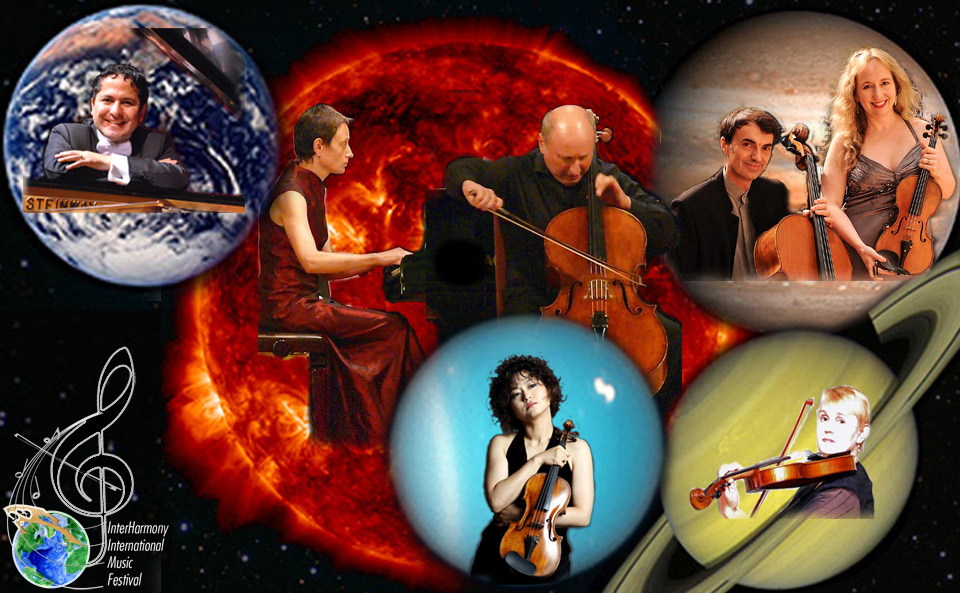
The InterHarmony International Music Festival opens its New York concert season on October 16, 2015 at 8PM at the Weill Recital Hall. Cellist Misha Quint, founder of IIMF, and other distinguished artists present a program of musical and cultural dialogue that lays the essence of music bare: the bold, challenging and redemptive attempt to communicate between people, between culture – between worlds. The IIMF Series continues in the new year with performances on January 23, 2016 and April 1, 2016. For tickets call CarnegieCharge at 212.247.7800 or, for more information, go to www.interharmony.com.
Music offers us a language in which to speak when words fail, emotions overwhelm, and differences seem insurmountable. But when it comes to bridging great distances, the InterHarmony International Music Festival, which has been bringing together students, teachers, and soloists from around the globe for almost two decades, is on its home turf. For the opening night of the IIMF's fourth annual concert series at Weill Recital Hall, Music Director Misha Quint presents a program that celebrates music's role as a universal ambassador: between individuals (in the duos of Berio, Shostakovich and Ravel), between styles (in Mark O'Connor's genre-defying F. C.'s Jig) and even between hemispheres (in Ginastera's synthesis of New World traditions and Old World techniques).
The duo gives musical expression to that most basic human situation: two people speaking, exploring the whole range of emotion, trying despite the odds to understand one another. Violinist Jennifer Dalmas and cellist Evgeni Raychev will present Maurice Ravel's Sonata for Violin and Cello, surely one of the great examples of the duo form. A conversational drama develops between the low and high voice, in which the roles of lead and accompaniment intertwine seamlessly. They discuss polyphonically, disagree sharply, even as to the key, seduce and reject each other, moving imperceptibly but inexorably towards reconciliation in the final chord.
Shostakovich's Sonata for Violoncello and Piano, performed by cellist Misha Quint and pianist Irina Nuzova, offers a dialogue at least as intimate, in a romantic register far removed from Ravel's stark delicacy. The wistful opening movement overflows with melancholic melodies of heart-stopping beauty. The bellicose ostinato of the Allegro ricochets back and forth between the instruments, interrupted by themes of unbridled enthusiasm. One of Shostakovich's most impressive early works, written just before the Great Terror, it seems to dance at the edge of the abyss, until the nervous laughter of its carnivalesque Finale is cut suddenly short.
Luciano Berio's Duetti per due violini form a kind of musical sketch book, each one a miniature portrait of a friend, acquaintance or inspiration. "Behind every duet there are personal reasons and situations" Berio says, "connected by the fragile thread of daily occasions." To explore the complexities and contradictions of single individuals, Berio takes two voices, clashing and collaborating. Violinist Yeon-Su Kim and Inga Kroll offer a selection of ten of the 34 Duetti showing the technical and emotional breadth of Berio's violin writing.
Ginastera embodied his own interior dialogue in his First Piano Sonata, performed here by pianist Washington Garcia. Torn, like his homeland Argentina, between native gaucho folk music and the intriguing possibilities of European imports, Ginastera created a powerful synthesis, a cosmopolitan voice distinctly his own, with one foot on each side of the ocean. His Sonata is now widely seen as the quintessential Argentinian contribution to piano music.
A child prodigy who swept Nashville in grade school and toured the world as a teenager, Mark O'Connor has won fame in recent years for his own transatlantic fusion of traditions: 'American Classical string music.' His Fiddle Concerto, commissioned by the Sante Fe Orchestra in 1993, has become the most performed violin concerto of recent years. F.C.'s Jig, as the name cleverly suggests, is an arrangement of its free-wheeling dance movement. Violinist Jennifer Dalmas and cellist Evgeni Raychev will perform.
Cellist MISHA QUINT made his orchestral debut at the age of 13 after winning first place in the Boccherini Competition in St. Petersburg. Some of the celebrated orchestras that Quint has performed with include: Orquestra Sinfônica do Teatro Nacional do Brasilia, The Metropolitan Symphony, New York Chamber Orchestra, The National Irish Symphony, Brooklyn Philharmonic, London Soloists Chamber Orchestra at Queen Elizabeth Hall, The Moscow State Symphony Orchestra, The Leningrad Philharmonic Orchestra, Leningrad State Orchestra, Orchestra of Classical and Contemporary Music and the Symphony Orchestras of Latvia and Georgia. Quint has worked with an equally illustrious group of conductors, including Maxim Shostakovich, Paul Lustig Dunkel, Colman Pearce, Sidney Harth, Ravil Martinov, Camilla Kolchinsky, Yaacov Bergman, Franz Anton Krager and Ira Levin, and premiered works the most outstanding composers of today including Sophie Goubadalina, Robert Sirota, Steven Gerber, Thomas Fortmann, Nathan Davis, and Alfred Schnitke. Quint is an active chamber musician and has performed with such artists as Nikolai Znaider, Bela Davidovich, Sherban Lupu, Andrzej Grabiec, Yuri Gandelsman, Boris Kushnir, and Mikhail Kopelman. Quint started founding music festivals in Europe in 1997 with the creation of The International Cello Festival in Blonay, Switzerland, followed by the Soesterberg International Music Festival in Holland in 1998. Quint established the InterHarmony Music Festival in Geneva, Switzerland in 2000, and has since moved iterations of the festival to San Francisco, the Berkshires in Massachusetts, Schwarzwald, Germany, Sulzbach-Rosenberg, Germany, and Tuscany, Italy. Quint is currently on the faculty of the Preparatory Division at Mannes College The New School for Music, in Manhattan.
Critics have applauded classical pianist IRINA NUZOVA for her "rise above mere virtuosity" (The Washington Post), "intensity of feeling" (La Nazione, Italy) and "profound interpretation" (Il Resto de Carlino, Bologna). Nuzova has appeared in recital as a soloist and as a chamber musician in the United States, Europe, and South America. In Europe, she has performed as part of the Amici della Musica concert series in Florence; at the Teatro Massima in Catania, Italy; Hermitage State Museum in St. Petersburg; the Moscow Conservatory, and in the Netherlands. In the United States, she has played at the Phillips Collection in Washington D.C., Carnegie Hall's Weill Recital Hall and the Kosciuszko Foundation in New York; and as part of chamber music series including the Rhode Island Chamber Music Concert Series and Norton Concert Series in Chicago. In recital with Wendy Warner, Nuzova has performed at the Music Institute of Chicago, the Phillips Collection, in Toronto, in Boston, and the Rockefeller tri-Institutional series in New York City. This season Nuzova appears as soloist in numerous venues. Besides her appearances with her duo at the Phillips Collection in Washington D.C. and at St. Paul's Music in the Park Series, future highlights include the double recital at the Gardner Museum (complete Beethoven cycle of sonatas), and chamber music performances at the National Gallery of Art in Washington D.C. as a member of the Camerata Phillips. Ms. Nuzova has also appeared in live radio interviews and performances in Boston, Chicago, Philadelphia, Washington DC, among others, including a live broadcast on WFMT in Chicago; and an interview with Fred Child of Performance Today -- a program that was syndicated nationwide. Also the recipient of the Bruce Hungerford Award at the Young Concert Artist Auditions in New York, Nuzova has won top prizes in competitions such as the Vincenzo Bellini and Citta di Senigallia International Competitions in Italy and the Beethoven Piano Sonata International Competition in Memphis, Tennessee. As a chamber musician, she has won top prizes at the Vittorio Gui and the Premio Trio di Trieste International Chamber Music Competitions in Italy. Nuzova's performances have been broadcast live on WFMT in Chicago, WGBH in Boston, and Italian TV. Nuzova is a native of Moscow, Russia. She made her debut with the Omsk Philharmonic at the age of 14. She studied at the Gnessin Academy of Music under the guidance of Alexander Satz before moving to the United States. Nuzova continued her musical education at the Manhattan School of Music with Lev Natochenny, and at Juilliard where her teachers were Oxana Yablonskaya and Jerome Lowenthal. To further herself as a musician she worked for many years in the cello studio of Harvey Shapiro at Juilliard and pursued individual studies with pianists Jean-Bernard Pommier, Eteri Andjaparidze, and Vladimir Feltsman. Nuzova earned her Doctorate of Musical Arts degree from the Hartt School of Music (University of Hartford, Connecticut). She regularly gives lecture recitals at schools and other public institutions. Ms.Nuzova is a dedicated teacher. With Ms.Warner she had been a duo-in-residence at the Music Institute of Chicago, gave Master Classes at the Schwobb School of Music in Columbus, Georgia, and recently has been invited to teach at the Special School of America, where she serves as the Piano and Chamber Music faculty.
Violinist JENNIFER DALMAS, a native of Lynchburg, Virginia, joined the music faculty of Stephen F. Austin University in fall 2003. Dr. Dalmas graduated from the Virginia School of the Arts in 1991 and received her Bachelor's music degree from Mary Washington College in 1995. For the next six years, she held a teaching and performing assistantship at Florida State University, where she studied with Professor Karen Clarke and Dr. Gary Kosloski. After receiving the Doctor of Music Degree in 2001, she served as a Visiting Violin Instructor at Florida State University the following year. While living in Florida, she regularly performed with the Tallahassee, Jacksonville, and New World Symphonies. Dr. Dalmas has also played with several period orchestras, including the Atlanta Baroque Orchestra and the Apollo Ensemble. She has performed solo repertoire such as Zigeunerweisen and various concerti with orchestras in the United States and Europe, and as part of the Promising Artists of the 21st Century program has given recitals and master classes both in the United States and Central America. She won the doctoral concerto competition at Florida State University in 1999, performing the Glazunov violin concerto with the FSU orchestra and was awarded second prize in the National MTNA competition the following year. As a member of the Hachidori Piano Trio, she has been a semi-finalist in the Fischoff Chamber Music Competition, and has performed the Beethoven Triple Concerto with orchestras in the United States, the Czech Republic, and Bulgaria. In Texas, Dr. Dalmas has been an active orchestral musician, and has served as concertmaster for the Orchestra of the Pines, in addition to performing with other regional symphonies. An avid chamber music player, she has been a member of both the Alazan Piano Trio and East Texas Baroque, and also serves as the music director of the Chamber Music in the Pines summer festival. She is active as an adjudicator and clinician, and in 2009 was invited to present at the national A.S.TA convention. Her string students have won numerous awards and competitions, and have enjoyed summer studies at prestigious music festivals such as Brevard, Eastern, and Meadowmount.
Born in Russe, Bulgaria, cellist EVGENI RAYCHEV began his studies on the violoncello at the Vesselin Stoyanov School of Music in Russe with Elka Effremova as his teacher. He further continued his music education with professor Zdravko Yordanov at the Bulgarian Music Academy in Sofia, where he received his Bachelor and Master degrees. Upon arriving in the USA in 1997 he attended the Florida State University, where he completed his second Master's and Doctoral degrees with professor Lubomir Georgiev. Winner of several competitions, Evgeni Raychev has performed as a soloist with orchestras in the USA, Bulgaria and Czech Republic and his chamber and solo music experience includes performances in the USA, Bulgaria, Austria, Czech Republic, Slovakia, and Costa Rica. Dr. Raychev has played for the Bulgarian National Symphony Orchestra for five years during his undergraduate pursuit and has served as a principal cellist of FSU Symphony, Chamber and Opera Orchestras, as well as Tallahassee SO, Southeast SO, Orchestra of the Pines, Texarkana SO, Longview SO, and East Texas SO. For seven years Evgeni Raychev played in the Douzet alongside his teacher Prof. Yordanov, the founder of this ensemble of twelve cellos, which commissioned and premiered several compositions by leading Bulgarian composers. He was appointed as the adjunct cello professor at Stephen F. Austin State University, TX in the Fall of 2003, where he currently teaches. Raychev is constantly and continuously working on innovative collaborative music projects promoting classical music to pre college and college students. He is the founder of Piney Woods Camerata (student-faculty collaborative conductorless ensemble), Piney Woods Youth Orchestra, and a founding member of the Alazan Piano Trio – an ensemble dedicated to performing compositions by American composers. In addition to his performance activities, Raychev is a dedicated pedagogue and an ardent advocate of cello ensemble playing who loves workings with musicians of different ages. His newest endeavor is the foundation of the Cello Club in the fall of 2014, where cello enthusiasts of all ages are prepared online to gather together for a concert at SFA. Currently Dr. Raychev plays together with his wife, Dr. Jennifer Dalmas as the Hachidori Duo.
Ecuadorian-American pianist, WASHINGTON GARCIA began his musical studies at the age of 6. Among his teachers have been Genoveva Granja, Toshko Stoyanov, Ann Schein, Yoheved Kaplinsky, and Julian Martin. Dr. García holds a bachelor of music from the National Conservatory of Music in Ecuador, and master's and doctoral degrees from the Peabody Institute of the Johns Hopkins University, where he graduated at the age of 25 as the youngest Latin American to have received a doctoral degree in piano performance from that prestigious university. The success of his first public performance at the age of 6 led Dr. García to perform at the most important cultural centers in Ecuador. He was awarded first prizes at the Guillermo Wright-Vallarino National Piano Competition held in Quito, the Elizabeth Davis Memorial Piano Competition and the 19th International Young Artist Piano Competition in Washington D.C., the 2004 Baltimore Music Club Piano Competition, and the Harrison Winter Piano Competition. As the winner of the Concerto Competition at the Peabody Institute, Dr. García was selected to perform with the Peabody Concert Orchestra. He was also a top prizewinner at the Yale Gordon Piano Competition, the Russell Wonderlic Piano Competition, and a finalist at the Hilton Head International Piano Competition. In addition to awards granted by the Peabody Institute and the Ecuadorian government, including the prize "Monseñor Leonidas Proaño" and the award "Al Mérito Laboral," Dr. García received sponsorship by United Airlines to perform concerts abroad. He was also named a Presser Scholar and grant recipient by the Presser Music Foundation. He has received awards by Texas State University including the Texas State Quarterly Team Award in recognition of outstanding service as well as the Friends of Fine Arts Awards for Scholarly/Creative Activities and Service. Since his debut with the Ecuadorian National Symphony Orchestra at the age of 15, Dr. García has been an active recitalist, soloist, and lecturer in prestigious venues in Italy, Switzerland, Austria, France, Spain, Hungary, Canada, Chile, Mexico, Ecuador, Colombia, Japan, China, Indonesia, Singapore, Taiwan, and the United States, where he has offered solo recitals and master classes in almost 30 states. Dr. García's international debut took place in Santiago, Chile, where he performed for former President Patricio Aylwin at the Claudio Arrau International Piano Seminar. Subsequently, he was chosen from a large field of contestants from 33 countries by the Kennedy Center for the Performing Arts in Washington D.C. to receive one of two $25,000 grants awarded to pianists in its Fellowships of the Americas Program. Dr. García has performed with several orchestras around the world, including a last-minute invitation to perform Mozart's Double Piano Concerto with the Green Valley Chamber Orchestra in Las Vegas. He also toured Italy with the Texas State University Chamber Orchestra, performing Beethoven's Triple Concerto, and he was recently featured as guest soloist with the Austin Symphony Orchestra under the baton of maestro Peter Bay. Dr. García has performed and recorded for Radio Television Hong Kong, Opus Classical Radio in Mexico City, WFMT in Chicago, TV Spain, Rogers Broadcasting Company in Canada, and worldwide broadcasts through Univision. He has also been featured in several journals and magazines including the Austin and Texas Monthly, Time Out Jakarta, The Hispanic Outlook in Higher Education, The Washington Post, and several others in Asia, North and South America, Europe, and the Middle East. Dr. García served on the faculty of the Peabody Preparatory of the Johns Hopkins University and is a faculty member at the InterHarmony International Music Festival in Tuscany, Italy and the Peabody Piano Festival in Baltimore, Maryland. He will join the faculty at the University of Nebraska Omaha as founding Director of the School of Music on January 2016. Washington García became a Steinway Artist on 2014 and a citizen of the United States on March 2013.
Violinist YEON-SU KIM teaches and heads the string program at the Sunderman Conservatory, Gettysburg College. Previously Kim held a position at Amherst College and taught as a visiting lecturer at UMass, Amherst. In recent seasons she has given performances and taught masterclasses at Indiana University, Seoul University, Hong Kong Performance Arts School, and InterHarmony in Germany. As a soloist, the Korean-British violinist Yeon-Su Kim has performed in Austria, Brazil, England, Germany, Italy, Korea, Switzerland, and the United States. As an active chamber musician Yeon-Su Kim has given performances in Germany, Austria, Israel, Switzerland, and England, and held quartet residencies under the Amadeus Quartet and the Tokyo Quartet. Kim was the recipient of numerous awards such as prizes at the Semmering Competition and the Leverhulme Fellowship at the Royal Academy of Music in England. She has given performances on the BBC Radio, Swiss Radio, and the German National Radio. Kim's recent concert tours include recitals in Zankel Recital Hall in Carnegie Hall, Philadelphia, Seoul, Hong Kong, Brazil, and Germany. Kim performs and commissions new music and plans to issue her first CD in 2013. As an advocate for new music, she is passionate about her collaborations with composers, and has worked closely with composers such as Ezra Laderman, Eric Sawyer, Lansing McCloskey, Shinuh Lee and the Composers of Red Sneakers. She has a strong interest in diverse string repertoire that ranges from a recent Schumann and Brahms concerto to Berio and Carter recitals. Kim studied at the Guildhall School of Music and Drama (London, U.K.), the Royal Academy of Music (London, U.K.), Yale University, and Boston University. Her teachers include David Takeno, Syoko Aki, Simon Fischer, Pauline Scott, and Yuri Mazurkevich. She shares her home and concert stages with her conductor and percussionist husband, Eduardo Leandro.
Violinist INGA KROLL is a native of Estonia, and graduate of the Estonian Music Academy and holds a Master of Music degree in Violin Performance from Rice University. Currently Inga is a classical and baroque freelance violinist in the Dallas/Ft. Worth area. She plays regularly with the Dallas Opera Orchestra, as Concertmaster with the Lyric Stage, in Irving, Texas and as second principal with the Orchestra of New Spain. Her diverse performance credits include orchestral work with pop musicians Crystal Gale, Reba McEntire, Diana Ross, classical artists Jose Correras, and Andrea Bocelli and with internationally acclaimed baroque artists Simon Standage and Ketil Haugsand. As a baroque violinist she has toured and performed in Russia, Finland, France, Mexico, and various states within the USA. She has studied with leading baroque performers Marilyn McDonald, Cynthia Roberts, Stanley Ritchie, Dana Maiben and Elizabeth Blumenstock. She is an adjunct faculty of violin and viola at Brookhaven College and University of Dallas. She also teaches privately from her home studio in Richardson, Texas.
Maurice Ravel (1875 – 1937): Sonata for Violin and Cello
Mark O'Connor (b 1961): F.C.'s Jig
Jennifer Dalmas, violin
Evgeni Raychev, cello
Alberto Ginastera (1916 – 1983): Piano Sonata No.1, Op.22
Washington Garcia, piano
Luciano Berio (1979 – 1983): Duetti per due violini
Yeon-Su Kim, violin
Inga Kroll, violin
Dmitri Shostakovich (1906 – 1975): Sonata in d minor for Cello and Piano, Op.40
Misha Quint, cello
Irina Nuzova, piano
Tickets are $35, and can be purchased by calling CarnegieCharge at 212-247-7800; at the Carnegie Hall box office located at West 57th and Seventh Avenue or online at www.carnegiehall.org
Press Contact:
Willumsen PR
4804 Falstone Avenue
Chevy Chase, Maryland, 20815
USA
Willumsen PR
Manfred-von-Richthofen Str. 10
D-12101 Berlin, Germany
+49(0)15734959583
[email protected]
Dmitri Shostakovich (1906-1975): Cello Concerto No.1, Op.107 in E flat major
Misha Quint, cello
Andzrej Grabiec, conductor
InterHarmony Festival Orchestra
Christuskirche, Sulzbach-Rosenberg, Germany
Dmitri Shostakovich (1906 – 1975): Sonata for Cello and Piano, Op.40
Misha Quint, cello
Dorian Keilhack,
Konzertsaal des Rathauses, Sulzbach-Rosenberg, Germany
Haydn-Piatigorsky: Divertimento in D Major
Brahms: Cello Sonata No.2 in F Major, Op.99
Giuseppe Valentini: Sonata per violoncello in Mi
Schubert: Impromptu No.3 in G Major, D899
Rostropovich: Humoresque, Op.5
Ravel: Vocalise-étude en forme de Habañera
Klengel: Scherzo, Op.6
Misha Quint, cello
Dorian Keilhack, piano
Konzertsaal der Staatlichen Berufsschule, Sulzbach-Rosenberg, Germany
Dmitri Shostakovich (1906 – 1975): Cello Concerto No.1 in E-Flat Major, Op.107
Misha Quint, cello
Andzrej Grabiec, conductor
InterHarmony Festival Orchestra
Santuario Tuscany, Italy
Antonin Dvorak (1841 – 1904): Trio per pianoforte No.4, Op.90 "Dumky"
Join us for the Outstanding Guest Artist Series on July 18, 2015, featuring Italian pianist Bruno Canino in the Dvorak Dumky Piano Trio with violinist Andrzej Grabiec, and cellist Misha Quint. There will also be works by Schumann, Mozart, Debussy, Verdi, and Faure.
Andrzej Grabiec, violin
Misha Quint, cello
Bruno Canino, piano
Teatro Tuscany, Italy
P.I. Tchaikovsky (1840 – 1893): Souvenir de Florence String Sextet, Op.70
Andrzej Grabiec, violin
Matthew Madonia, violin
Marylene Gingras-Roy, viola
Matthew Pickart, viola
Misha Quint, cello
Caitlin McConnell, cello
Teatro Tuscany, Italy
Shostakovich (1906 – 1975): Sonata for Cello and Piano, Op.40
Misha Quint, cello
Irina Nuzova, piano
Teatro Tuscany, Italy
Handel-Halvorsen: Passacaglia per violino e violoncello
Miroslav Hristov, violin
Misha Quint, cello
Teatro Tuscany, Italy
Haydn-Piatigorsky: Divertimento in D Major
Brahms: Cello Sonata No.2 in F Major, Op.99
Giuseppe Valentini: Sonata per violoncello in Mi
Schubert: Impromptu No.3 in G Major, D899
Rostropovich: Humoresque, Op.5
Ravel: Vocalise-étude en forme de Habañera
Klengel: Scherzo, Op.6
Misha Quint, cello
Inesa Sinkevych, piano
Teatro Italy
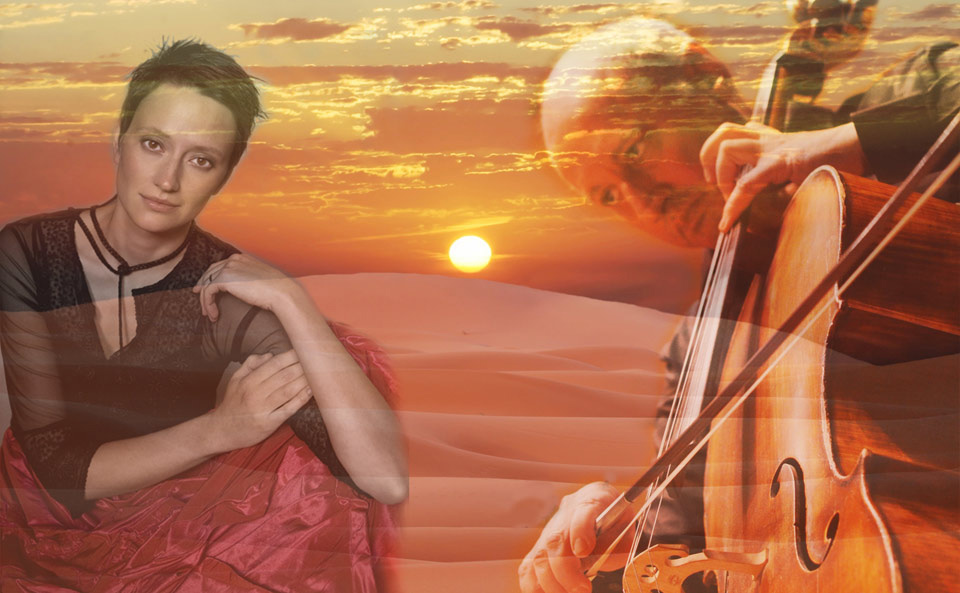
The InterHarmony® International Music Festival invites audiences to the next installment of its New York Concert Series, at on January 23, 2016 at 8PM, at the Weill Recital Hall at Carnegie Hall. Festival Founder, Misha Quint (cello) and Irina Nuzova (piano) will present a program of works which push the limits of the cello repertoire, questioning the boundaries between instruments, genres, and cultures. For tickets call CarnegieCharge at 212.247.7800 or, for more information, go to www.interharmony.com.
Classical music is anything but static. With time, technique and, above all, inspiration, what was once unimaginable becomes a reality on stage. Join Quint and Nuzova as they show how the possibilities of cello music have expanded by incorporating other repertoires and cultures in a search for beauty, wherever it might be. The program features pieces originally written for other instruments (like Schnittke's Suite in an Old Style and the Franck Sonata), music from ballets and operas (Prokofiev's Cinderella and Rimsky-Korsakov's Flight of the Bumblebee), and works of cultural cross-pollination (Rodion Shchedrin's Russian tango, In the Style of Albéniz, and Bruch's Kol Nidrei, which enriched the Romantic idiom with Jewish melodies).
One of the 19th century's most important cellists, Karl Davidov contributed much to the technical wizardry of the Russian school. But his Romance sans Paroles is a work of pure lyricism, an unabashedly romantic melody that stakes the cello's claim to the territory of the human voice itself. It is unclear what instrument César Franck originally intended for his Sonata in A major; he decided only when he needed a wedding present for his friend, the violinist Eugène Ysaÿe. Still, this sonata, which secured Franck's reputation among audiences and critics, is an even greater success on the cello, due to the drama and contrasting colors of the cello's high and low registers.
Alfred Schnittke's Suite in the Old Style is an elegant collection of five pastoral dance movements, like the Baroque suites of Handel and Bach. It begins with winning naïveté, offering the audience only the slightest of glimpses behind its innocent mask before dissolving into unperturbed beauty again.
In Max Bruch's Kol Nidrei, the cello imitates the rhapsodic voice of a hazzan, chanting the liturgy in the synagogue, a penitential sigh. A German romantic composer from a Lutheran background, Bruch became friends with Abraham Jacob Lichtenstein, the head cantor of Berlin, whose artistry inspired him to incorporate Jewish themes into his own work.
Rodion Shchedrin's In the Style of Albéniz is a tribute to Spanish composer Isaac Albéniz, who, like Shchedrin, synthesized folk traditions with classical music. Without ever explicitly quoting Albéniz, Shchedrin creates "a kind of a 'tangissimo,'" cooking Albéniz's music down to its very essence and amplifying its inherent dramatic into something passionate, free and wild.
Prokofiev excerpted a duet from his popular ballet Cinderella and arranged it for the cellist Alexander Stogorsky. Moving throughout the instrument's range with a variety of textures, from stormy double stops to airy wisps of melody, the emotional intimacy of the duet is transferred to the musicians.
Rimsky-Korsakov's fairy-tale opera The Tale of Tsar Saltan may now be largely forgotten, but The Flight of the Bumblebee from its third act is instantly recognizable. Its frantic flights of fancy, vividly realistic and stunningly difficult, have become practically synonymous with virtuosity.
Cellist MISHA QUINT made his orchestral debut at the age of 13 after winning first place in the Boccherini Competition in St. Petersburg. Some of the celebrated orchestras that Quint has performed with include: Orquestra Sinfônica do Teatro Nacional do Brasilia, The Metropolitan Symphony, New York Chamber Orchestra, The National Irish Symphony, Brooklyn Philharmonic, London Soloists Chamber Orchestra at Queen Elizabeth Hall, The Moscow State Symphony Orchestra, The Leningrad Philharmonic Orchestra, Leningrad State Orchestra, Orchestra of Classical and Contemporary Music and the Symphony Orchestras of Latvia and Georgia. Quint has worked with an equally illustrious group of conductors, including Maxim Shostakovich, Paul Lustig Dunkel, Colman Pearce, Sidney Harth, Ravil Martinov, Camilla Kolchinsky, Yaacov Bergman, Franz Anton Krager and Ira Levin, and premiered works the most outstanding composers of today including Sophie Goubadalina, Robert Sirota, Steven Gerber, Thomas Fortmann, Nathan Davis, and Alfred Schnitke. Quint is an active chamber musician and has performed with such artists as Nikolai Znaider, Bela Davidovich, Bruno Canino, Sherban Lupu, Andrzej Grabiec, Yuri Gandelsman, Boris Kushnir, and Mikhail Kopelman. Quint started founding music festivals in Europe in 1997 with the creation of The International Cello Festival in Blonay, Switzerland, followed by the Soesterberg International Music Festival in Holland in 1998. Quint established the InterHarmony Music Festival in Geneva, Switzerland in 2000, and has since moved iterations of the festival to San Francisco, the Berkshires in Massachusettes, Schwarzwald, Germany, Sulzbach-Rosenberg, Germany, and Tuscany, Italy, as well as the InterHarmony Concert Series at Carnegie Hall in New York City. Quint is currently on the faculty of the Preparatory Division at Mannes College The New School for Music, in Manhattan. Quint will release a new recording called "Matryoshka Blues" in Winter 2016
Winner of numerous international prizes and awards, IRINA NUZVA has appeared in recital as a soloist and as a chamber musician in the United States, Europe, and South America. In Europe she performed at the Amici della Musica concert series in Florence, at the Hermitage State Museum in St. Petersburg, the Moscow Conservatory, Germany, Romania, and in the Netherlands, and In the USA at the Phillips Collection and National Gallery in Washington D.C., Weill Recital Hall in New York, Gardner Museum in Boston, Music in the Parks Series in St.Paul. Ms. Nuzova has appeared in live radio interviews and live broadcasts on Boston, Chicago, Philadelphia, Washington DC radio stations. A native of Moscow, Russia, Ms. Nuzova studied at the Gnessin Academy of Music under the guidance of Alexander Satz before moving to the United States. Ms. Nuzova holds degrees from the Manhattan School of Music and the Juilliard School. She earned her Doctorate of Musical Arts degree from the Hartt School of Music. A devoted teacher, Ms. Nuzova was invited to join the Piano Faculty at the Special School of America in 2013, where she teaches individual students and chamber music. Ms. Nuzova was part of a Duo-in –Residence at the Music Institute of Chicago with the cellist Wendy Warner. Ms. Nuzova gave Master Classes at the Schwob School of Music in Columbus, GA and at the Music Institute of Chicago and serves regularly as a jury panelist at piano competitions around the USA. During the summer, Ms. Nuzova teaches at the InterHarmony International Music Festival in Italy. She is a member of the Camerata Phillips, the chamber ensemble in residence of the Phillips Collection Gallery in Washington DC.
Davidov (1838 – 1889): Romance sans paroles, Op.23
Franck (1822 – 1890): Sonata for Cello and Piano
Schnittke (1934 – 1998): Suite in the Old Style
Bruch (1838 – 1920): Kol Nidrei, Op.47
Rodion Shchedrin (b 1932): "In the Style of Albeniz" for cello and piano
Prokofiev (1891 – 1953): Adagio, Op.97bis
Rimsky-Korsakov (1844 – 1908): Flight of the Bumblebee from The Tale of Tsar Saltan
Misha Quint, cello
Irina Nuzova, piano
Tickets are $35, and can be purchased by calling CarnegieCharge at 212-247-7800; at the Carnegie Hall box office located at West 57th and Seventh Avenue or online at www.carnegiehall.org
Press Contact:
Willumsen PR
4804 Falstone Avenue
Chevy Chase, Maryland, 20815
USA
Willumsen PR
4804 Falliston Ave
Chevy Chase, MD, 20815
USA
(240) 406 4339
[email protected]
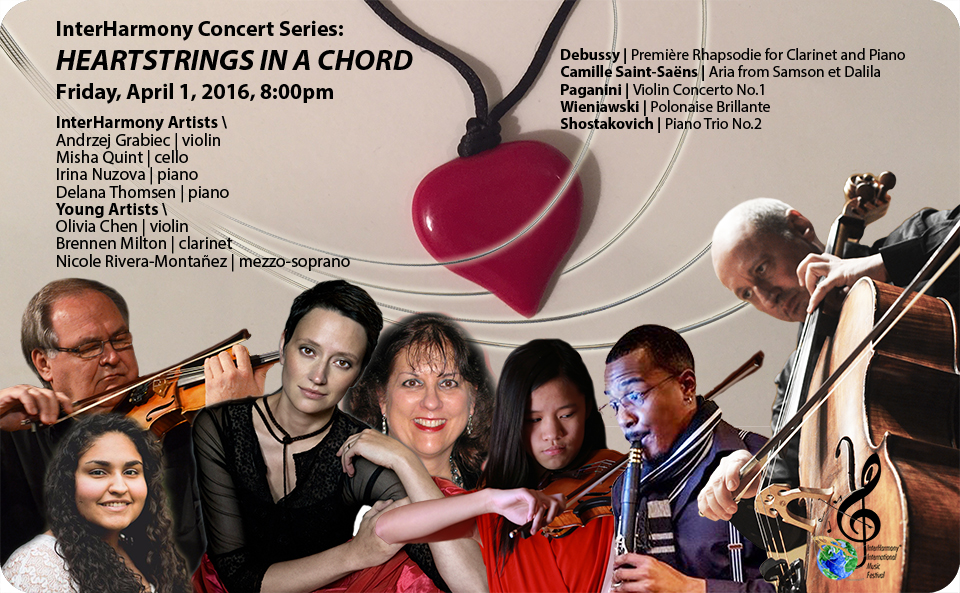
Cellist Misha Quint presents the best and brightest of the InterHarmony® International Music Festival on April 1, 2016 at 8 pm in the Weill Recital Hall. Every year, IIMF founder Quint brings a select group of rising young stars from the festival to play at Carnegie Hall with established performing artists. Tickets are $35, and can be purchased online at www.carnegiehall.org, or by calling CarnegieCharge at 212-247-7800. For more information, please visit www.interharmony.com.
Heartstrings in a Chord brings together up-and-coming soloists with seasoned masters. In the concert's first half, meet a new generation of talented, classical musicians, as Brennen Milton (clarinet), Olivia Chen (violin) and Nicole Rivera-Montanez (mezzo-soprano) take to the stage with showpieces from Romanticism to Impressionism. The pianist for the first half will be Delana Thomsen. After the intermission, Festival Founder Misha Quint (cello) will be joined by Andrzej Grabiec (violin) and Irina Nuzova (piano) to perform Shostakovich's haunting Piano Trio.
Debussy called the Rhapsodie for Clarinet and Piano "one of the most charming pieces I have ever written." Its dreamy atmospheres create a drama of changing colors, just beyond the reach of words. Delilah's aria Mon cœur s'ouvre à ta voix by Saint-Saëns, is so seductive that Samson cannot help but reveal the secret of his strength, dooming himself. Audiences have proved no less susceptible. In Stride la vampa from Verdi's masterpiece Il Trovatore, Azucena mourns her mother's awful fate and plots revenge. Wieniawski's Polonaise Brillante in D Major, is a theatrical, extroverted work, full of rapid runs and irrepressible enthusiasm. Paganini took care to write concertos so demanding only he could perform them and his Violin Concerto No. 1 in D Major, Op.6 remains one of the most difficult in the repertoire. But its staying power owes more to its wealth of melodies and operatic drama. Shostakovich's Piano Trio, No. 2, Op.67, strikes a tragic tone. The year was 1944, the composer's good friend Ivan Sollertinsky had died and the country was nearing the end of exhausting war. Here, after the public bombast of his Leningrad Symphony, was a private expression of doubt: anxiety about the future and sorrow for the past. Its premiere made a profound impression – the audience wept openly and demanded encores. It was immediately banned.
Cellist MISHA QUINT made his orchestral debut at the age of 13 after winning first place in the Boccherini Competition in St. Petersburg. Some of the celebrated orchestras that Quint has performed with include: Orquestra Sinfônica do Teatro Nacional do Brasilia, The Metropolitan Symphony, New York Chamber Orchestra, The National Irish Symphony, Brooklyn Philharmonic, London Soloists Chamber Orchestra at Queen Elizabeth Hall, The Moscow State Symphony Orchestra, The Leningrad Philharmonic Orchestra, Leningrad State Orchestra, Orchestra of Classical and Contemporary Music and the Symphony Orchestras of Latvia and Georgia. Quint has worked with an equally illustrious group of conductors, including Maxim Shostakovich, Paul Lustig Dunkel, Colman Pearce, Sidney Harth, Ravil Martinov, Camilla Kolchinsky, Yaacov Bergman, Franz Anton Krager and Ira Levin, and premiered works the most outstanding composers of today including Sophie Goubadalina, Robert Sirota, Steven Gerber, Thomas Fortmann, Nathan Davis, and Alfred Schnitke. Quint is an active chamber musician and has performed with such artists as Nikolai Znaider, Bela Davidovich, Bruno Canino, Sherban Lupu, Andrzej Grabiec, Yuri Gandelsman, Boris Kushnir, and Mikhail Kopelman. Quint started founding music festivals in Europe in 1997 with the creation of The International Cello Festival in Blonay, Switzerland, followed by the Soesterberg International Music Festival in Holland in 1998. Quint established the InterHarmony Music Festival in Geneva, Switzerland in 2000, and has since moved iterations of the festival to San Francisco, the Berkshires in Massachusettes, Schwarzwald, Germany, Sulzbach-Rosenberg, Germany, and Tuscany, Italy, as well as the InterHarmony Concert Series at Carnegie Hall in New York City. Quint is currently on the faculty of the Preparatory Division at Mannes College The New School for Music, in Manhattan. Quint will release a new recording called "Matryoshka Blues" in Winter 2016
Violinist ANDRZEJ GRABIEC, prizewinner at the Fifth International Henryk Wieniawski Violin Competition in Poland (1967) and the International Jacques Thibaud Violin Competition in Paris, France (1969), made his debut with Opole Philharmonic Orchestra in Poland at age 14. He studied at the Szymanowski Academy of Music in Katowice, Poland, where he was later appointed Professor of Violin. He went on to become a soloist and concertmaster of the Great Symphony Orchestra of the Polish National Radio and Television and the leader of Capella per Musica da Camera. Grabiec became concertmaster at the Rochester Philhamonic, the Wichita Symphony Orchestra in Kansas, as well as Music Director of the Mozart Festival Chamber Orchestra. Grabiec became Professor of Violin at the Moores School of Music at the University of Houston in 1995. He performed with the Houston Symphony in 1999, and is a founder and Artistic Co-Director of the Virtuosi of Houston. Invited by Australia's government, Grabiec served as Artistic Director of an Olympic Arts Tour throughout Australia, New Zealand, and the South Pacific Islands, where he also performed as a violin soloist and conductor in 1999. In 2002 Grabiec performed the world premiere of Concerto for Violin and Orchestra, "Seren", by American composer Peter Lieuwen, and was its dedicee. Grabiec made his Chinese debut in 2008 in Guangzhou, China with master classes and a performance of Saint-Saens Violin Concerto with the Xinghai Conservatory Symphony Orchestra. He has performed under conductors such as Pierre Boulez, Erich Leinsdorf, Krzysztof Penderecki, Witold Lutoslawski, Kazimierz Kord, Mark Elder, and Erich Bergel and continues to teach and perform at a litany of music festivals around the world.
Winner of numerous international prizes and awards, IRINA NUZVA has appeared in recital as a soloist and as a chamber musician in the United States, Europe, and South America. In Europe she performed at the Amici della Musica concert series in Florence, at the Hermitage State Museum in St. Petersburg, the Moscow Conservatory, Germany, Romania, and in the Netherlands, and In the USA at the Phillips Collection and National Gallery in Washington D.C., Weill Recital Hall in New York, Gardner Museum in Boston, Music in the Parks Series in St.Paul. Ms. Nuzova has appeared in live radio interviews and live broadcasts on Boston, Chicago, Philadelphia, Washington DC radio stations. A native of Moscow, Russia, Ms. Nuzova studied at the Gnessin Academy of Music under the guidance of Alexander Satz before moving to the United States. Ms. Nuzova holds degrees from the Manhattan School of Music and the Juilliard School. She earned her Doctorate of Musical Arts degree from the Hartt School of Music. A devoted teacher, Ms. Nuzova was invited to join the Piano Faculty at the Special School of America in 2013, where she teaches individual students and chamber music. Ms. Nuzova was part of a Duo-in –Residence at the Music Institute of Chicago with the cellist Wendy Warner. Ms. Nuzova gave Master Classes at the Schwob School of Music in Columbus, GA and at the Music Institute of Chicago and serves regularly as a jury panelist at piano competitions around the USA. During the summer, Ms. Nuzova teaches at the InterHarmony International Music Festival in Italy. She is a member of the Camerata Phillips, the chamber ensemble in residence of the Phillips Collection Gallery in Washington DC.
DELANA THOMSEN is a highly accomplished solo and collaborative pianist who has given recitals throughout Europe and the US, as well as Master Classes in Iceland, Bulgaria, and the InterHarmony Festival in Italy. In NYC she has appeared in numerous venues including Alice Tully Hall and Weill Hall. Ms. Thomsen has been affiliated with Aspen, Juilliard and Mannes. She has been pianist for the violin classes of Ivan Galamian and for Master Classes of Dorothy Delay, Shirley Givens, Jean-Pierre Rampal, Eleanor Lawrence, Channing Robbins, Alan Harris, Leonard Rose and Mstislav Rostropovitch. "Morgunbildith" in Iceland wrote "artistic...a first-rate musician (who) projects unusually loveable playing"; The "Borba" in Bulgaria wrote "Ms. Thomsen plays with an authentic and sensitive style that gives the listener a sound picture of the boundless nuances of human life"; and "The Music Connoisseur" wrote "…the appealing duo displayed a high level of virtuosity throughout". She is a sought after teacher and inspiring mentor, and her pupils have had great recognition. Several have had the honor of being chosen to perform in Master Classes with distinguished artists such as Jerome Lowenthal, Edna Golandsky, and Robert MacDonald. Ms.,Thomsen's pupils have been the winners of numerous local & concerto competitions including Yonkers Philharmonic, Long Island Youth Orchestra, LaGuardia High School, & Hudson Valley Music Club. She is on the piano faculties of Manhattan School of Music Precollege, Hoff-Barthelson Music School and has private teaching studios in NYC and Columbia Co. NY. Her teachers have been Ruth Slenczynska, Arthur Balsam, Dalmo Carra as well as 13 years of post-graduate studies with Elizabeth Moschetti Tobias: assistant to Dorothy Taubman.
OLIVIA CHEN is a fourteen year-old violinist and a 9th grader in the International Baccalaureate program at Richard Montgomery High School. Olivia began violin lessons at age of 4. She has studied with various teachers including Joyce Durfee, Henry Rubin, Herbert Greenberg, and Emil Chudnovsky. In November 2015, Olivia commenced studies with violinist and professor Victor Danchenko. At age 6, Olivia became a member of the string orchestra in the Houston Youth Symphony. She currently participates in the Maryland Classic Youth Orchestras (MCYO) as principal of the second violin in the Philharmonic, and is the youngest member of the orchestra. Olivia has played in master classes and lessons for various musicians and professors including Curtis professor Shmuel Ashkenasi, Julliard professor Shirley Givens, Baltimore Symphony Concertmaster Jonathan Carney, Michael Ludwig, Jody Gatwood, Olivia Hajioff, Marc Ramirez, James Stern, Rachel Barton Pine, and New Mexico Symphony Conductor and violinist Guillermo Figueroa. Olivia was featured in a special event hosted by the Symphony of the Potomac and conductor, Joel Lazar in November 2014 featuring works by Arvo Part. In the summer of 2014, Olivia won second place in the Junior Division of the Asian American International Competition. Later that year, she won third place in the American Protégé International Concerto Competition and was featured in a concert at Carnegie Hall in the fall. In March of 2015, Ms. Chen was selected to perform in the Music Friends Concerts at the Alden Theater in March 2015 and soon after won second prize in the Advanced Category of the WPAS Feder Memorial String Competition. This past summer, she attended the Miami Summer Music Festival where she studied with professors Michael Klotz and Yuriy Bekker and studied with Shirley Givens in the InterHarmony International Music Festival in Tuscany, Italy. Olivia won first prize in the ENKOR International Competition in July 2015 and as a result, she received the PASSAMONTE prize, which includes a scholarship to the LPM European Summer Masterclass in London in the UK. Olivia was one of the winners in the National Philharmonic Orchestra Concerto Competition and performed with the National Philharmonic Orchestra at the Music Center at Strathmore in a concert for second graders in Montgomery County Public Schools. Most recently, Olivia won first place in the state division of the Music Teachers National Association and competed in the eastern regional competition in January 2016.
BRENNEN MILTON holds a Masters of Music Degree from the California State University Sacramento School of Music. He received a Bachelor of Music Degree from Alcorn State University, where he began his career as a freelance performer, playing Mozart, Strauss and even Dixieland jazz. After receiving his degree, Brennen went on to study music at the Naval School of Music, and graduated top of his class and won a job with the United States Marine Corp's 2nd Marine Division Band. As a freelance musician and volunteer he has performed with local groups such as the Sacramento Philharmonic, the Camerata California Orchestra, the Capitol Pops Concert Band and the American River College Orchestra and Symphonic Wind Ensemble, Mr. Milton has branched out into the Northern California freelance scene, performing with the VITA Academy orchestra, pit orchestras, and even unconventional spaces such as the storefront of a local sandwich shop. Brennen made his debut as an international clarinetist in Italy in the Summer of 2014 with the Tuscia Opera Festival in Viterbo, Italy. Brennen made another appearance in Italy this summer for a classical music festival in Tuscany. In March 2015 Brennen won the Concerto Competition at Sac State, and performed as soloist with CSUS's Symphony Orchestra with Debussy's Premiere Rhapsodie.
Born in Carolina, Puerto Rico, mezzo-soprano NICOLE M. RIVERA is demonstrating her artistic versatility on the operatic stage, as a member of premier chamber choirs, and as a soloist. Nicole's pursuit of a professional music career began at the age of 14 under the vocal training of Alicia Stagner. At Dr. Phillips High School in Orlando, Florida, she broadened her musical education through the Visual and Performing Arts Magnet Program. There, she participated in numerous ensembles, festivals, and conventions, including both the Florida and the Southern Division American Choral Directors Association (ACDA) conventions and the Florida All-State convention. Nicole chose to continue her education at Stetson University in DeLand, Florida, pursuing both a Bachelor of Music in Vocal Performance and a Bachelor of Arts in Psychology. At Stetson's School of Music, Nicole is a scholarship student of Russell Franks, Director of Stetson Opera Theatre. She is a member of several ensembles including Stetson University's premier Concert Choir, under the direction of Timothy Peter, in which she performed in New York City's Alice Tully Hall, Lincoln Center in the spring of 2014. On the operatic stage, she was cast as the understudy for the role of Idamante in Stetson Opera Theatre's 2015 production of Mozart's Idomeneo. As a soloist, Nicole has also had the opportunity to perform in the master class with Pulitzer Prize and Grammy Award-winning composer William Bolcom and his wife, mezzo-soprano Joan Morris. In April of 2015, she was named the third-place winner of Stetson University's prestigious H.M. Giffin Vocal Competition. In addition to her involvement at Stetson University, Nicole has branched out with performances in other Florida cities. In 2014, she was an ensemble member in Vero Beach Opera's production of Mascagni's Cavalleria Rusticana. She also serves as alto section leader at Ormond Beach Presbyterian Church. Nicole has excelled in both her music and academic careers, receiving several scholarships and awards including the William E. Duckwitz Talent Scholarship and the School of Music's Outstanding Freshman Award. She is also involved in many organizations, including the Stetson Music Teachers Association, as well as the National Honor Society in Psychology (Psi Chi).
Debussy: Première Rhapsodie for Clarinet and Piano
Verdi: Strida in vampa from Il trovatore
Saint-Saëns: Mon coeur s' ouvre a ta voix from Samson et Dalila
Paganini: Violin Concerto No.1 in D Major, Op.6, I.Allegro maestoso – Tempo giusto
Wieniawski: Polonaise Brillante in D Major
Shostakovich: Piano Trio No.2, Op.67
Misha Quint, cello
Andrzej Grabiec
Irina Nuzova, piano
Delana Thomsen, piano
Olivia Chen, violin
Brennen Milton, clarinet
Nicole M. Rivera-Montanez, Mezzo-soprano
Tickets are $35, and can be purchased by calling CarnegieCharge at 212-247-7800; at the Carnegie Hall box office located at West 57th and Seventh Avenue or online at www.carnegiehall.org
Press Contact:
Willumsen PR
4804 Falstone Avenue
Chevy Chase, Maryland, 20815
USA
Willumsen PR
4804 Falliston Ave
Chevy Chase, MD, 20815
USA
(240) 406 4339
[email protected]
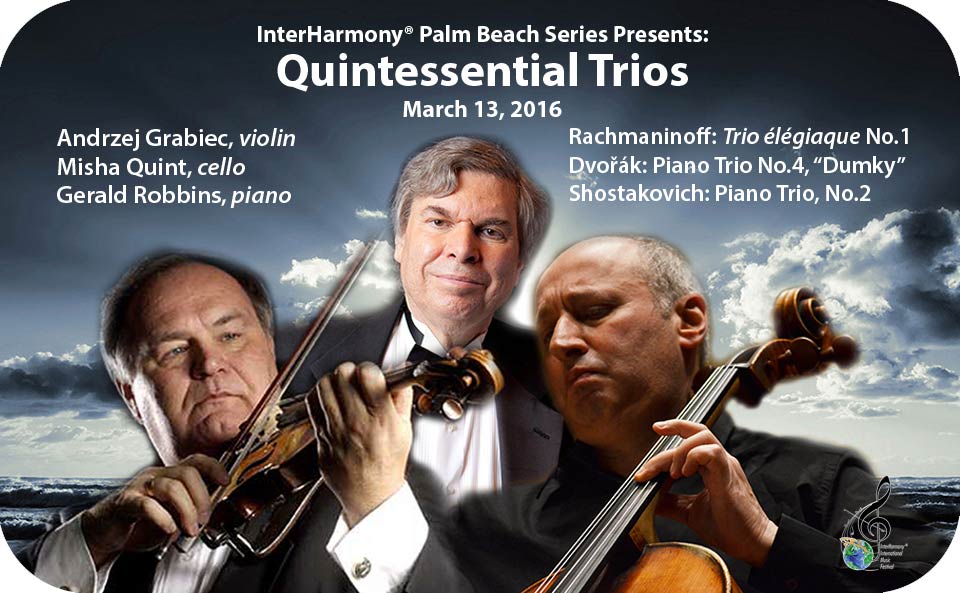
InterHarmony® International Music Festival presents a chamber music concert featuring pearls of the piano trio repertoire with Festival Founder Misha Quint (cello), and IIMF guest artists Andrzej Grabiec (violin) and Gerald Robbins (piano) on Sunday, March 13th at 5PM. The program is an illustration of the romantic tradition of the Piano Trio, performed by soloists, that brings to mind the famed Heifetz – Rubinstein – Piatigorky Trio. This is the final concert in the first season of the InterHarmony Palm Beach Series. For tickets call the box office at (855) 728-8497 or order online with credit card at https://palmbeachestheatre.org For more information, please visit www.interharmony.com.
In existence for almost two decades, InterHarmony has become one of the important festivals worldwide, and the fastest growing. Anchored in Italy and Sulzbach-Rosenberg, Bavaria, Germany each summer, the festival boasts a new Outstanding Guest Artist Series that features stars such as Alfred Brendel and Vadim Repin. Now, fresh from a run at the InterHarmony Concert Series at Carnegie Hall in New York, IIMF's founder and cellist Misha Quint brings some of the best of these programs with him to Palm Beach. For more information about InterHarmony® International Music Festival, please visit www.interharmony.com/florida.
Rachmaninoff's early Trio élégiaque No.1 in g minor, is a study in barely restrained yearning. The piano's rising four-note theme swims on a sea of thirty-second notes whipped up by the cello and violin. The mood shifts fluidly between melancholy desperation and wistful nostalgia, trapped in a cycle of longing, returning again and again to those four bittersweet notes, like a prayer.
Dvořák's "Dumky" trio (Piano Trio No.4 in e minor, Op.90) is a compact, but unforgettable musical odyssey. In this freely structured collection of six "dumky," Ukrainian ballads and laments, the cello, violin and piano sing the songs of a small people torn between great empires. This dark, Bohemian fantasy invites the listener deep into a forest of gnarled melodies, where sudden clearings open and mad dances whirl.
Shostakovich's Piano Trio, No.2 in e minor, Op.67 strikes a tragic tone. The year was 1944, the composer's good friend Ivan Sollertinsky had died and the country was nearing the end of hard war. Here, after the public bombast of his Leningrad symphony, was a private expression of doubt: anxiety for the future and sorrow for the past. Its premiere made a devastating impression – the audience wept openly and demanded encores. It was immediately banned.
Cellist MISHA QUINT made his orchestral debut at the age of 13 after winning first place in the Boccherini Competition in St. Petersburg. Some of the celebrated orchestras that Quint has performed with include: Orquestra Sinfônica do Teatro Nacional do Brasilia, The Metropolitan Symphony, New York Chamber Orchestra, The National Irish Symphony, Brooklyn Philharmonic, London Soloists Chamber Orchestra at Queen Elizabeth Hall, The Moscow State Symphony Orchestra, The Leningrad Philharmonic Orchestra, Leningrad State Orchestra, Orchestra of Classical and Contemporary Music and the Symphony Orchestras of Latvia and Georgia. Quint has worked with an equally illustrious group of conductors, including Maxim Shostakovich, Paul Lustig Dunkel, Colman Pearce, Sidney Harth, Ravil Martinov, Camilla Kolchinsky, Yaacov Bergman, Franz Anton Krager and Ira Levin, and premiered works the most outstanding composers of today including Sophie Goubadalina, Robert Sirota, Steven Gerber, Thomas Fortmann, Nathan Davis, and Alfred Schnitke. Quint is an active chamber musician and has performed with such artists as Nikolai Znaider, Bela Davidovich, Bruno Canino, Sherban Lupu, Andrzej Grabiec, Yuri Gandelsman, Boris Kushnir, and Mikhail Kopelman. Quint started founding music festivals in Europe in 1997 with the creation of The International Cello Festival in Blonay, Switzerland, followed by the Soesterberg International Music Festival in Holland in 1998. Quint established the InterHarmony Music Festival in Geneva, Switzerland in 2000, and has since moved iterations of the festival to San Francisco, the Berkshires in Massachusettes, Schwarzwald, Germany, Sulzbach-Rosenberg, Germany, and Tuscany, Italy, as well as the InterHarmony Concert Series at Carnegie Hall in New York City. Quint is currently on the faculty of the Preparatory Division at Mannes College The New School for Music, in Manhattan. Quint will release a new recording called "Matryoshka Blues" in Winter 2016
Violinist ANDRZEJ GRABIEC, prizewinner at the Fifth International Henryk Wieniawski Violin Competition in Poland (1967) and the International Jacques Thibaud Violin Competition in Paris, France (1969), made his debut with Opole Philharmonic Orchestra in Poland at age 14. He studied at the Szymanowski Academy of Music in Katowice, Poland, where he was later appointed Professor of Violin. He went on to become a soloist and concertmaster of the Great Symphony Orchestra of the Polish National Radio and Television and the leader of Capella per Musica da Camera. Grabiec became concertmaster at the Rochester Philhamonic, the Wichita Symphony Orchestra in Kansas, as well as Music Director of the Mozart Festival Chamber Orchestra. Grabiec became Professor of Violin at the Moores School of Music at the University of Houston in 1995. He performed with the Houston Symphony in 1999, and is a founder and Artistic Co-Director of the Virtuosi of Houston. Invited by Australia's government, Grabiec served as Artistic Director of an Olympic Arts Tour throughout Australia, New Zealand, and the South Pacific Islands, where he also performed as a violin soloist and conductor in 1999. In 2002 Grabiec performed the world premiere of Concerto for Violin and Orchestra, "Seren", by American composer Peter Lieuwen, and was its dedicee. Grabiec made his Chinese debut in 2008 in Guangzhou, China with master classes and a performance of Saint-Saens Violin Concerto with the Xinghai Conservatory Symphony Orchestra. He has performed under conductors such as Pierre Boulez, Erich Leinsdorf, Krzysztof Penderecki, Witold Lutoslawski, Kazimierz Kord, Mark Elder, and Erich Bergel and continues to teach and perform at a litany of music festivals around the world.
Pianist GERALD ROBBINS has distinguished himself internationally as a soloist having performed throughout the world in virtually every major music center including New York, London, Paris, Amsterdam, Bonn, Munich, Athens, Frankfurt, St. Petersburg, Belgrade, Tel Aviv, Jerusalem, Rio de Janeiro, and Tokyo. He has appeared with many major orchestras such as the Los Angeles Philharmonic, Los Angeles Chamber Orchestra, London Philharmonic, Royal Philharmonic, BBC Symphony, and its affiliates, London Mozart Players, the City of Birmingham Symphony Orchestra, and the Portland Chamber Orchestra, with such conductors as Zubin Mehta, Sir Neville Marriner, Edouard van Remoortel, Harry Blech, Okku Kamu, Jorge Mester, Lawrence Foster, Kenneth Klein, Kypros Markou, Yaacov Bergman, and Louis Fremaux. A champion of neglected romantic repertoire, Gerald Robbins has received critical acclaim for his solo recordings on the London-Decca, Genesis, Orion, MSR Classics, Bridge, and Black Box labels, among others. His world premiere Genesis recordings of Litolff and Reinecke concerti, performed in collaboration with the Monte Carlo Opera Orchestra conducted by Edouard van Remoortel, elicited such praise as "Gerald Robbins's technical prowess is phenomenal", "a keyboard voice of true eloquence", "a first class bravura performance." In addition to his solo activities, Mr. Robbins has distinguished himself as a chamber musician in collaboration with many eminent musicians such as violinists Nathan Milstein, Aaron Rosand, Pinchas Zukerman, Ruggiero Ricci, Mark Peskanov, Bronislaw Gimpel, Kyung-Wha Chung, Mayumi Fujikawa, Haroutune Bedelian, Glenn Dicterow, and cellists, Zara Nelsova, Joseph Schuster, Nathaniel Rosen, Stephen Kates, Frederick Zlotkin, James Kreger, and Richard Markson, among many others. A co-founder with Glenn Dicterow of the Lyric Piano Quartet, Mr. Robbins records and tours with this ensemble. He is also an accomplished conductor and co-founder with Kenneth Klein, of the Westside Symphony Orchestra of Los Angeles now known as the Beverly Hills Symphony. He was a co-founder of the London Concertante, an ensemble that specialized in 18th and 19th century concerto repertoire. He has appeared as guest artist, several times over the years in Bargemusic, a distinguished chamber music series in Brooklyn, and as a guest artist with members of the New York Philharmonic at Lincoln Center in their celebrated chamber music series. Mr. Robbins received many important awards throughout his career including a major prize at the Van Cliburn International Piano Competition. During his studies at the University of Southern California, where he received his Bachelors and Masters degrees, he assisted as pianist for the string master classes of Jascha Heifetz, William Primrose, and Gregor Piatigorsky. He is presently living in New York where he is an Artist-in-Residence with the Lyric Piano Quartet at Queens College CUNY, and is on the faculty at the CUNY Graduate Center. He is affiliated with the Hoff-Barthelson Music School in Scarsdale, NY, and is a member of the chamber music faculty at the Manhattan School of Music in New York City.
Rachmaninoff: Trio élégiaque No.1 in g minor
Dvořák: Piano Trio No.4, Op.90 Dumky
Shostakovich: Piano Trio No.2
Misha Quint, cello
Andrzej Grabiec
Gerald Robbins, piano
Tickets are $40 and can be purchased by calling the box office at (855) 728-8497 of Palm Beaches Theatre or online at palmbeachestheatre.org
Press Contact:
Willumsen PR
4804 Falstone Avenue
Chevy Chase, Maryland, 20815
USA
Willumsen PR
4804 Falliston Ave
Chevy Chase, MD, 20815
USA
(240) 406 4339
[email protected]
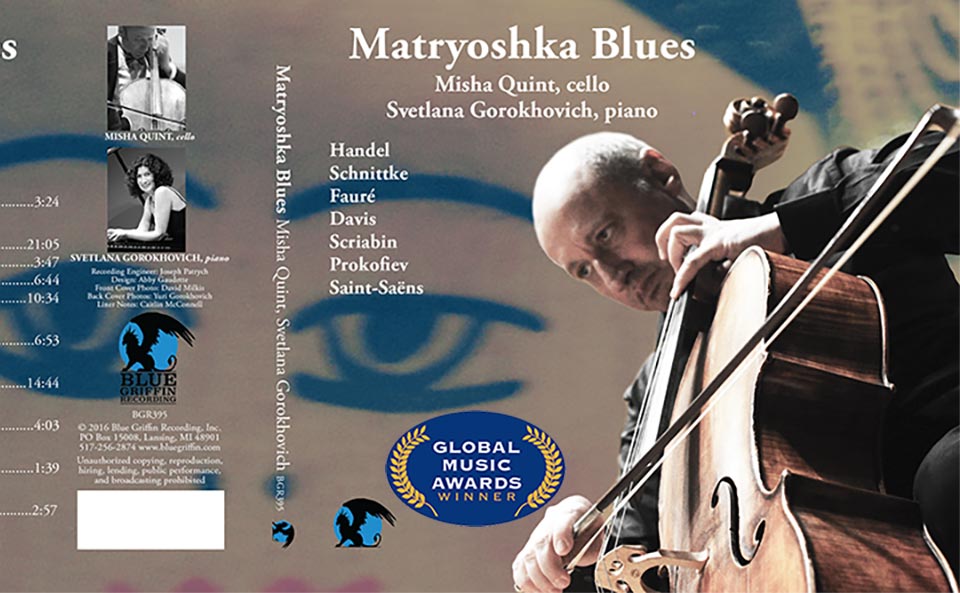
The April release of “Matryoshka Blues” on the Blue Griffin Label, just captured the Gold Medal in the Global Music Awards in the instrumentalist, album, and new release categories in March of 2016. https://www.globalmusicawards.com.
Russian-born cellist Misha Quint and pianist Svetlana Gorokhovich present their new CD “Matryoskha Blues”. Like the colorful, embedded Russian dolls (matryoshkas), Quint presents a riveting variety of repertoire on this recording: from the tender and popular Saint-Saëns The Swan from Carnival of the Animals, to Handel’s Larghetto from Sonata for Violin and Basso Continuo transcribed for cello and piano. The title track, Matryoshka Blues by jazz composer Nathan Davis, and Alfred Schnitkke’s later work, Sonata No. 1 for Cello and Piano, represent the contemporary realm of music. Beautiful transcriptions of Gabriel Fauré’s Élégie, Op. 24, Alexander Scriabin’s Etude in B-Flat minor, Op. 8 and Sergei Profoviev’s March from The Love for Three Oranges round out the release. The CD provides layers of sound and musical thought, an unfolding musical experience.
Cellist MISHA QUINT made his orchestral debut at the age of 13 after winning first place in the Boccherini Competition in St. Petersburg. Some of the celebrated orchestras that Quint has performed with include: Orquestra Sinfônica do Teatro Nacional do Brasilia, The Metropolitan Symphony, New York Chamber Orchestra, The National Irish Symphony, Brooklyn Philharmonic, London Soloists Chamber Orchestra at Queen Elizabeth Hall, The Moscow State Symphony Orchestra, The Leningrad Philharmonic Orchestra, Leningrad State Orchestra, Orchestra of Classical and Contemporary Music and the Symphony Orchestras of Latvia and Georgia. Quint has worked with an equally illustrious group of conductors, including Maxim Shostakovich, Paul Lustig Dunkel, Colman Pearce, Sidney Harth, Ravil Martinov, Camilla Kolchinsky, Yaacov Bergman, Franz Anton Krager and Ira Levin, and premiered works the most outstanding composers of today including Sophie Goubadalina, Robert Sirota, Steven Gerber, Thomas Fortmann, Nathan Davis, and Alfred Schnitke. Quint is an active chamber musician and has performed with such artists as Nikolai Znaider, Bela Davidovich, Bruno Canino, Sherban Lupu, Andrzej Grabiec, Boris Kushnir, and Mikhail Kopelman. Quint started founding music festivals in Europe in 1997 with the creation of The International Cello Festival in Blonay, Switzerland, followed by the Soesterberg International Music Festival in Holland in 1998. Quint established the InterHarmony Music Festival in Geneva, Switzerland in 2000, and has since moved iterations of the festival to San Francisco, the Berkshires in Massachusettes, Schwarzwald, Germany, Sulzbach-Rosenberg, Germany, and Tuscany, Italy, as well as the InterHarmony Concert Series at Carnegie Hall in New York City. Quint is currently on the faculty of the Preparatory Division at Mannes College The New School for Music, in Manhattan. Quint will release a new recording called "Matryoshka Blues" in Winter 2016
Pianist SVETLANA GOROKHOVICH has performed in international music festivals in Holland, Germany, Italy and New York. She has worked with Misha Quint since 2005. Her latest performances include recitals in Zankel Hall, Weill Recital Hall and Ridotto Music Series. Gorokhovich received her music training in the Kazan State Conservatory and her Ph.D. from St. Petersburg State Conservatory, studying with distinguished professor Tatiana Kravchenko. She immigrated to the U.S. in 1989. Gorokhovich was the 1997 winner of the Bartok-Kabalevsky- Prokofiev International Piano Competition at Radford University and the 1999 IBLA international competition in Italy. Her solo recital at Carnegie Hall in 2000 was highly acclaimed by the New York Concert Review. Her most recent recording, "One Piano Four Hands," was released in 2012 by SMH Records. She toured world-wide with violinist Dmitri Berlinsky from 1991 –1996. Their recording, "Souvenir D'un Lieu Cher" (Helicon), released in 1997, received enthusiastic reviews. Gorokhovich is on the piano faculty of the Music Conservatory of Westchester in White Plains, New York.
Goerge Frideric Handel (1685-1759): Sonata for Violin and Basso Continnuo in D Major, OP. 1, No. 13, HWV 371
01. III. Larghetto 3:24
Alfred Schnitkke (1934-1998): Sonata No. 1 for Cello and Piano
02. I. Largo 3:47
03. II. Presto 6:44
04. III. Largo 10:34
Gabriel Fauré (1845-1924)
05. Élégie, Op. 24 6:53
Nathan Davis (b. 1937)
06. Matryoshka Blues 14:44
Alexander Scriabin (1872-1915)
07. Etude in B-Flat minor, Op. 8, No. 11 4:03
Sergei Prokofiev (1891-1953)
08. March from The Love for Three Oranges 1:39
Camille Saint-Saëns (1835-1921)
09. The Swan from Carnival of the Animals 2:57
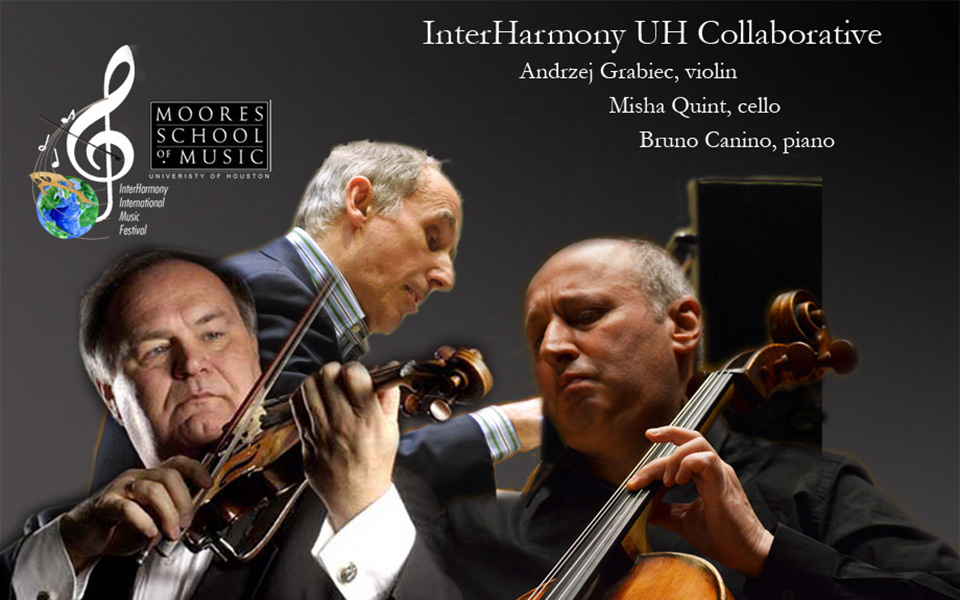
The InterHarmony® International Music Festival is happy to announce its first collaboration with the University of Houston for two concerts, and will finally be able to bring highlights of its European and Carnegie programs to Texas turf. First, join us on April 29th for a trio concert featuring the legendary Italian pianist and IIMF Guest Artist, Bruno Canino, Festival Founder Misha Quint (cello), and longtime IIMF and UH professor Andrzej Grabiec (violin). On April 30th, the same stellar ensemble presents Beethoven’s Concerto for Violin, Cello, and Piano, Op.56 with the UH Moores School Symphony Orchestra, conducted by Franz Anton Krager. Tickets for the April 29 event are gratis and for April 30 event are $17 for general admission and $12 for seniors, and can be purchased at the University of Houston School Moores School of Music Website at www.uh.edu/class/music/events-performances.
Every year, the InterHarmony® International Music Festival brings young performers to Europe to study with top-flight faculty and prestigious guest artists from around the globe. Now they are coming to Texas as a result of the vision of UH Professor of Conducting and Director of Orchestras, Franz Anton Krager, and IIMF Founder, cellist Misha Quint. Fresh from a run at Carnegie Hall, Misha Quint and Andrzej Grabie join Italian pianist Bruno Canino, a figure of legendary stature in the contemporary European musical scene. Their first concert offers a stormy program of trios by Dvořák, Rachmaninoff and Shostakovich. One day later, they are joined by the UH Moores School Symphony Orchestra for a rare opportunity to hear Beethoven's virtuosic masterpiece, the Concerto for Violin, Cello, and Piano, Op.56. For more about InterHarmony International Music Festival, go to www.interharmony.com
Tickets for the April 29 event are gratis, and for April 30 event are $17 for general admission and $12 for seniors, and can be purchased at the University of Houston School Moores School of Music Website at www.uh.edu/class/music/events-performances The Moores Opera House is located at University of Houston, 120 School of Music Building, Houston, TX 77004
Handel had his concerti grossi, Mozart his sinfonie concertanti, but Beethoven was sure that his Triple Concerto was "really something new": a concerto for piano trio. The Triple Concerto was written during the great creative outburst to which we owe the Eroica Symphony and the Waldstein Piano Sonata. In it Beethoven achieves a rare degree of intimacy for an orchestral work, with more of the elegance of his chamber music than the fireworks of his symphonies. Its first movement begins in an expectant hush, awaiting the soloists, who arrive one by one with balletic grace. The short, lyrical second movement pours straight into the final Rondo alla polacca, which soars upward with an almost boyish enthusiasm.
Rachmaninoff's early Trio Élégiaque, no.1, by contrast, is a study in barely restrained yearning. The piano's rising four-note them swims on a sea of thirty-second notes whipped up by the cello and violin. The mood shifts fluidly between melancholy desperation and wistful nostalgia, trapped in a cycle of longing, returning again and again to those four bittersweet notes, like a prayer.
Dvořák's Piano Trio No.4 in e minor, Op.90, Dumky is a compact, but unforgettable musical odyssey. In this freely structured collection of six “dumky,”, Ukrainian ballads and laments, the cello, violin and piano sing the songs of a small people torn between great empires. This dark, Bohemian fantasy invites the listener deep into a forest of gnarled melodies, where sudden clearings open and mad dances whirl.
Shostakovich's Piano Trio, No. 2, Op.67 strikes a tragic tone. The year was 1944, the composer's good friend Ivan Sollertinsky had died and the country was nearing the end of hard war. Here, after the public bombast of his Leningrad symphony, was a private expression of doubt: anxiety for the future and sorrow for the past. Its premiere made a devastating impression – the audience wept openly and demanded encores. It was immediately banned.
Born in Naples, BRUNO CANINO studied piano and composition at the Conservatorio Verdi in Milan, where he taught solo piano for 24 years. He has performed both as a soloist and a chamber musician in all the great concert venues of Europe, US, Australia, Japan and China. For over forty years he has been regularly performing with Antonio Ballista, his piano Duo partner, and since thirty he is a member of the Trio of Milan. Bruno Canino regularly performs with such eminent musicians as Salvatore Accardo, Lynn Harrell, Viktoria Mullova, Itzhak Perlman, and Uto Ughi, among others. For many years he has been Artistic Adviser of the Giovine Orchestra Genovese and, later, of the International Music Campus in Latina for the autumn season. At the moment Bruno Canino is the Director of the Venice Biennale Music Department. Bruno Canino is deeply interested in contemporary music and has collaborated with such distinguished composers as Pierre Boulez, Luciano Berio, Karl-Heinz Stockhausen, Georg Ligeti, Bruno Maderna, Luigi Nono, Sylvano Bussotti and others, the works of whom he has often premiered. Bruno Canino''s recent recordings include the Goldberg Variations, the complete piano works by Casella, and lately it has been released the first CD of the complete Debussy piano works. He holds a master-class of piano and chamber music of the XX century at the Bern Conservatory. In 1997 Passigli Editions published his book "Vademecum for a chamber pianist".
Cellist MISHA QUINT made his orchestral debut at the age of 13 after winning first place in the Boccherini Competition in St. Petersburg. Some of the celebrated orchestras that Quint has performed with include: Orquestra Sinfônica do Teatro Nacional do Brasilia, The Metropolitan Symphony, New York Chamber Orchestra, The National Irish Symphony, Brooklyn Philharmonic, London Soloists Chamber Orchestra at Queen Elizabeth Hall, The Moscow State Symphony Orchestra, The Leningrad Philharmonic Orchestra, Leningrad State Orchestra, Orchestra of Classical and Contemporary Music and the Symphony Orchestras of Latvia and Georgia. Quint has worked with an equally illustrious group of conductors, including Maxim Shostakovich, Paul Lustig Dunkel, Colman Pearce, Sidney Harth, Ravil Martinov, Camilla Kolchinsky, Yaacov Bergman, Franz Anton Krager and Ira Levin, and premiered works the most outstanding composers of today including Sophie Goubadalina, Robert Sirota, Steven Gerber, Thomas Fortmann, Nathan Davis, and Alfred Schnitke. Quint is an active chamber musician and has performed with such artists as Nikolai Znaider, Bela Davidovich, Bruno Canino, Sherban Lupu, Andrzej Grabiec, Boris Kushnir, and Mikhail Kopelman. Quint started founding music festivals in Europe in 1997 with the creation of The International Cello Festival in Blonay, Switzerland, followed by the Soesterberg International Music Festival in Holland in 1998. Quint established the InterHarmony Music Festival in Geneva, Switzerland in 2000, and has since moved iterations of the festival to San Francisco, the Berkshires in Massachusettes, Schwarzwald, Germany, Sulzbach-Rosenberg, Germany, and Tuscany, Italy, as well as the InterHarmony Concert Series at Carnegie Hall in New York City. Quint is currently on the faculty of the Preparatory Division at Mannes College The New School for Music, in Manhattan. Quint will release a new recording called "Matryoshka Blues" in Winter 2016
American born and trained, conductor FRANZ ANTON KRAGER has made his artistic presence felt both at home and abroad with performance engagements in some of the world’s most celebrated concert halls and musical centers. Since making his prize-winning European conducting debut in Copenhagen’s Tivoli Koncertsalen in 1978, Krager has led orchestras in the Leipzig Gewandhaus, Moscow’s State Kremlin Palace, Manchester England’s Bridgewater Hall, Birmingham England’s Adrian Boult Hall, Guangzhou China’s Xinghai Music Center, the Sydney Opera House, The Hague’s Congresgebouw, Kazan’s State Philharmonic Hall in Russia, Guadalajara’s Degollado Theater, and Sarasota’s Van Wezel Performing Arts Hall. His affiliations with leading music festivals include the Lancaster International Concert Series and the Lichfield and Aberystwyth International Arts Festivals in the U.K., and the Texas Music Festival and Interlochen National Music Camp in the U.S. Maestro Krager has led the Houston, Russian State, Traverse City Michigan and Florida West Coast symphonies, Romanian and Kazan State philharmonics; symphony orchestras in Berlin, London, Paris, Singapore, Leipzig, Monterrey, Pordenone, Ingolstadt, Neuss, and Honolulu, and was Principal Guest Conductor in Stratford, England from 2000-2004. In 2015, he was appointed Principal Guest Conductor of the North Shore Chamber Arts Ensemble in Chicago. Krager is Music Director & Chief Conductor of the Texas Music Festival, Founding Co-Artistic Director for the Virtuosi of Houston, Artist-in-Residence at The Kinkaid School and Evaluator/Clinician for the Orchestra America National Festival. Krager is also Professor of Conducting, Director of Orchestras, and Chair of the Conducting Department at the University of Houston Moores School of Music, where he has brought the orchestra and orchestral conducting program into the realm of national prominence. The Moores School Orchestra is heard frequently on National Public Radio and has commercially recorded the music of Thomas Fortmann, Percy Grainger, Michael Horvit, Peter Lieuwen, Robert Nelson, and Stephen Shewan on the Divine Art (Métier), Albany, MSR Classics, Newport, and “Surround-Sound Blu-Ray Audio” HDTT record labels.
Violinist ANDRZEJ GRABIEC, prizewinner at the Fifth International Henryk Wieniawski Violin Competition in Poland (1967) and the International Jacques Thibaud Violin Competition in Paris, France (1969), made his debut with Opole Philharmonic Orchestra in Poland at age 14. He studied at the Szymanowski Academy of Music in Katowice, Poland, where he was later appointed Professor of Violin. He went on to become a soloist and concertmaster of the Great Symphony Orchestra of the Polish National Radio and Television and the leader of Capella per Musica da Camera. Grabiec became concertmaster at the Rochester Philhamonic, the Wichita Symphony Orchestra in Kansas, as well as Music Director of the Mozart Festival Chamber Orchestra. Grabiec became Professor of Violin at the Moores School of Music at the University of Houston in 1995. He performed with the Houston Symphony in 1999, and is a founder and Artistic Co-Director of the Virtuosi of Houston. Invited by Australia's government, Grabiec served as Artistic Director of an Olympic Arts Tour throughout Australia, New Zealand, and the South Pacific Islands, where he also performed as a violin soloist and conductor in 1999. In 2002 Grabiec performed the world premiere of Concerto for Violin and Orchestra, "Seren", by American composer Peter Lieuwen, and was its dedicee. Grabiec made his Chinese debut in 2008 in Guangzhou, China with master classes and a performance of Saint-Saens Violin Concerto with the Xinghai Conservatory Symphony Orchestra. He has performed under conductors such as Pierre Boulez, Erich Leinsdorf, Krzysztof Penderecki, Witold Lutoslawski, Kazimierz Kord, Mark Elder, and Erich Bergel and continues to teach and perform at a litany of music festivals around the world.
Press Contact: Caitlin McConnell
[email protected]
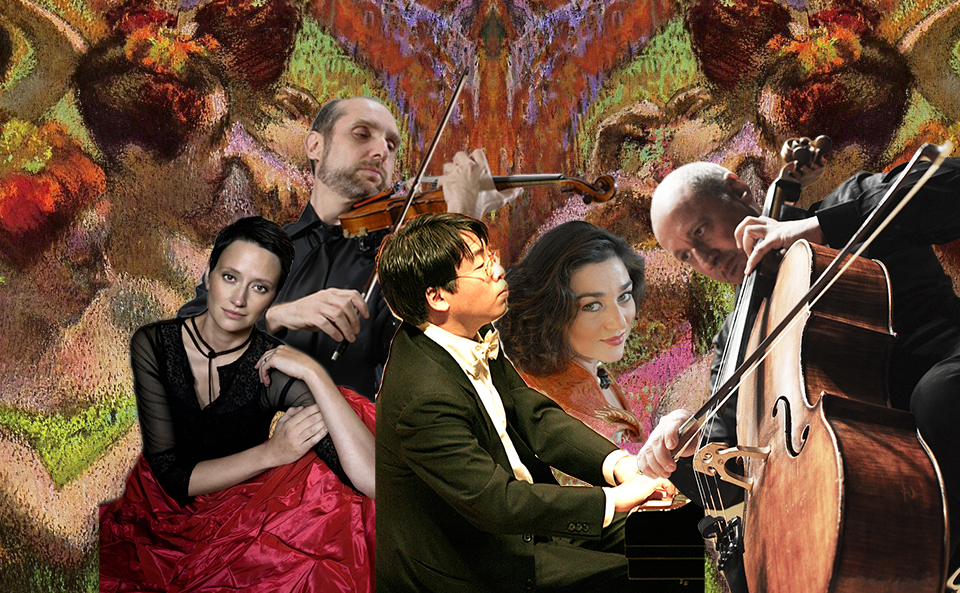
The InterHarmony® International Music Festival opens its 2016 Concert Series with a burst of color in this kaleidoscopic program, featuring violin, cello, piano and soprano in ever-changing ensembles. Join Founder Misha Quint (cello) and festival artists as they celebrate music’s direct connection to the heart. Tickets are $40, and can be purchased by calling CarnegieCharge at 212-247-7800, at the Carnegie Hall box office located at West 57th and Seventh Avenue, or online at www.carnegiehall.org For more information on the series, visit www.interharmony.com.
“Love! love! love! is the soul of a genius”: these words from Mozart’s family album could be a motto for all music. In Romantic Impressions, composers explore all aspects of the greatest of human feelings. From the redemptive power of Shostakovich’s rarely performed masterpiece 7 Romances on Poems by Alexander Blok to the sentimental sigh of Debussy’s waltz La plus que lente, from the poetry of Rachmaninov’s greatest love song, to the wordless wistfulness of André Previn’s Vocalise: if music be the food of love, play on, play on …
Liszt’s famous Liebestraum, No. 3 is a nostalgic nocturne based on his song ‘Oh, love, as long as you can love!’, clinging to a love that has already become a memory. In his transcription of Wagner’s Liebestod, the climax of Tristan and Isolde, Liszt adapts this central statement of the transformative power of love with a reverent faithfulness. The next two are inescapably paired: Liebesleid and Liebesfreud, love’s sorrow and love’s joy. Rachmaninov’s works are pianistic reinventions of Kreisler’s dances: playful, daunting and dramatic. Roques takes us in the opposite direction, adapting Debussy’s dream-like waltz La plus que lente, for the violin. In these sweet, autumnal meanderings, Debussy is at his most winning. But, as he wrote, “sometimes my days are as dusky, dark, and mute as those of a hero from Edgar Allan Poe and my soul is as romantic as a Chopin Ballade.” His Sonata for Cello and Piano has something of both these antecedents; in it, Debussy fights the encroaching silence and wins. The gentle fall of Sing not, o lovely one, to me, from Rachmaninov’s first collection of songs, brings back the memory of “that other life and distant shore”, which not even present love can suppress. Massenet’s Élégie finds the singer recalling “sweet springtimes past,” her song overflowing, its emotions too great to be contained by one instrument. André Previn’s Vocalise, in which aria and obbligato seem to bid each other a long farewell, is sparser than its model, Rachmaninov, but all the more haunting. Shostakovich’s 7 Romances on Poems by Alexander Blok is his call “to brave the darkness and the rain” and find refuge, even salvation, in the beauty of music: “oh, how much music God has, what sounds exist in the world!” This musical monument to the human voice is his ultimate statement of survival in dark times.
Cellist MISHA QUINT made his orchestral debut at the age of 13 after winning first place in the Boccherini Competition in St. Petersburg. Some of the celebrated orchestras that Quint has performed with include: Orquestra Sinfônica do Teatro Nacional do Brasilia, The Metropolitan Symphony, New York Chamber Orchestra, The National Irish Symphony, Brooklyn Philharmonic, London Soloists Chamber Orchestra at Queen Elizabeth Hall, The Moscow State Symphony Orchestra, The Leningrad Philharmonic Orchestra, Leningrad State Orchestra, Orchestra of Classical and Contemporary Music and the Symphony Orchestras of Latvia and Georgia. Quint has worked with an equally illustrious group of conductors, including Maxim Shostakovich, Paul Lustig Dunkel, Colman Pearce, Sidney Harth, Ravil Martinov, Camilla Kolchinsky, Yaacov Bergman, Franz Anton Krager and Ira Levin, and premiered works the most outstanding composers of today including Sophie Goubadalina, Robert Sirota, Steven Gerber, Thomas Fortmann, Nathan Davis, and Alfred Schnittke. Quint is an active chamber musician and has performed with such artists as Nikolai Znaider, Bela Davidovich, Bruno Canino, Julian Rachlin, Jean-Bernard Pommier, Sherban Lupu, Boris Kushnir, and Mikhail Kopelman. Quint started founding music festivals in Europe in 1997 with the creation of The International Cello Festival in Blonay, Switzerland, followed by the Soesterberg International Music Festival in Holland in 1998. Quint established the InterHarmony Music Festival in Geneva, Switzerland in 2000, and has since moved iterations of the festival to San Francisco, the Berkshires in Massachusettes, Schwarzwald, Germany, Sulzbach-Rosenberg, Germany, and Tuscany, Italy, as well as the InterHarmony Concert Series at Carnegie Hall in New York City. Quint is currently on the faculty of the Preparatory Division at Mannes College The New School for Music, in Manhattan. Quint's April 2016 release of Matryoshka Blues on the Blue Griffin Label won the Gold Global Music Award for New Release, Album, and Artist, and was featured in the Top 5 Spring Albums.
Versatile soprano Anya Fidelia made her professional debut at the Caramoor International Festival, where she numerously returned in subsequent seasons for opera productions and concerts. Anya received MM and PSD in Voice from Mannes Conservatory. Trained with renowned artists V.Chernov, J. Donemann, R. Scotto, R. Resnik, D.Soviero, W. Crutchfield, R. Resnik, P. McCaffrey and Nico Casel amongst others. The Lyric Opera of Chicago National Auditions and Santa Fe Opera Finalist, Anya is the winner of numerous competitions, awards and grants. Credits include Metropolitan Opera Guild appearances; the Carnegie Weill Recital Hall; Beacon Theater on Broadway; St. Petersburg Philharmonic; New Israeli Opera; Centro de Bellas Artes in PR; Moscow International Performing Arts Center; Kimmel Center. Repertory includes Mascagni’s Santuzza; Tchaikovsky’s Tatyana (Eugene Onegin); Poulenc’s Blanche de la Force (The Dialogues of the Carmelites); Puccini’s Mimi in La Boheme ; Georgetta (Il Tabarro), Suor Angelica, Butterfly and Tosca, amongst numerous other roles. Future seasons include expansion into dramatic Verdian and Verismo repertoire: Amelia (Un Ballo); Lady Macbeth (Macbeth); Elizabetta (Don Carlo); Maddalena (Andrea Chenier); La Gioconda (Ponchielli) and Lisa (Pique Dame). Recordings for film include soundtracks for Tribeca and Cannes award winning movies. Ms. Fidelia resides in NYC, where she holds a private voice studio, with husband Clark and two very musical children.
Winner of numerous international prizes and awards, pianist IRINA NUZOVA has appeared in recital as a soloist and as a chamber musician in the United States, Europe, and South America. In Europe she performed at the Amici della Musica concert series in Florence, at the Hermitage State Museum in St. Petersburg, the Moscow Conservatory, Germany, Romania, and in the Netherlands, and In the USA at the Phillips Collection and National Gallery in Washington D.C., Weill Recital Hall in New York, Gardner Museum in Boston, Music in the Parks Series in St.Paul. Ms. Nuzova has appeared in live radio interviews and live broadcasts on Boston, Chicago, Philadelphia, Washington DC radio stations. A native of Moscow, Russia, Ms. Nuzova studied at the Gnessin Academy of Music under the guidance of Alexander Satz before moving to the United States. Ms. Nuzova holds degrees from the Manhattan School of Music and the Juilliard School. She earned her Doctorate of Musical Arts degree from the Hartt School of Music. A devoted teacher, Ms. Nuzova was invited to join the Piano Faculty at the Special School of America in 2013, where she teaches individual students and chamber music. Ms. Nuzova was part of a Duo-in –Residence at the Music Institute of Chicago with the cellist Wendy Warner. Ms. Nuzova gave Master Classes at the Schwob School of Music in Columbus, GA and at the Music Institute of Chicago and serves regularly as a jury panelist at piano competitions around the USA. During the summer, Ms. Nuzova teaches at the InterHarmony International Music Festival in Italy. She is a member of the Camerata Phillips, the chamber ensemble in residence of the Phillips Collection Gallery in Washington DC.
A native of Taiwan, pianist Chih-Long Hu‘s performance career was launched after receiving honors including the Taipei National Concert Hall Arising Star, the Chi-Mei Artist Award, and prizes from the Mauro Monopoli International Piano Competition in Italy, the Concurs International De Piano D'Escaldes-Engordany in Andorra, the Takamatsu International Piano Competition in Japan, and San Jose International Piano Competition in California. An active performer, Hu performs extensively in Asia, Europe, and America appearing as a concerto soloist, recitalist, and chamber musician. His recent performance highlights include concerto performances of Rachamninov’s Paganini Rhapsody, Prokofiev’s Piano Concerto No. 3, Saint-Saëns Piano Concerto No. 2, solo and chamber recitals in China, Taiwan, Korea, Canada, and throughout the U.S. Hu’s performances have been broadcast in "Performance Today" through NPR stations across the country and televised in Taiwan, China and Japan. His CD albums "Formosa Caprices", “Complete Rachmaninov Etudes-Tableaux”, and “Trifecta Trio” have received critical acclaim. His recording of Bach Goldberg Variations will be released soon. Named “Teacher of the Year” by the Tennessee Music Teachers Association, Dr. Hu is frequently invited to give lectures and master classes, as well as to judge international and national competitions. Hu is the Artistic Director of St. Andrews Piano Academy and Festival International (New Brunswick), as well as the New York International Piano Festival. Hu holds a Doctorate of Musical Arts in piano performance from the University of Michigan, a Master's degree from Taipei National University of the Arts, and a Bachelor's degree in civil engineering from National Taiwan University. His piano teachers include Arthur Greene, Hung-Kuan Chen, and Tai-Cheng Chen. Dr. Hu has served on the faculty at East Tennessee State University, and was recently appointed as Sandra G. Powell Endowed Professor of Piano at The University of Tennessee starting in fall 2016.
Russian born violinist, violist and conductor, LEONID YANOVSKIY, is the Professor and Director of Strings and Orchestra at the University of West Florida, Pensacola. He is the concertmaster and frequent guest soloist with the Pensacola Symphony and Northwest Florida Symphony Orchestras, Principal Violinist with the Washington Square Music Festival, NYC, and Artist Faculty at the InterHarmony International Music Festival. Dr. Yanovskiy studied at the Moscow Gnessin Academy of Music, Russia; Rutgers University, NJ; and Fontenbleau Conservatoire Americaine, France. Among his teachers were Arnold Steinhardt and Michael Tree of the Guarneri Quartet, Olivier Charlier of the Paris Conservatory, and Valentin Berlinsky of the Borodin Quartet, Yanovskiy taught violin and chamber music at the Moscow Gnessin College and Academy of Music. He has performed solo and chamber music recitals throughout the United States, Brazil, Denmark, France, Germany, Israel, Korea, and Russia. His appearances as a soloist - including at the Rachmaninov Hall of the Tchaikovsky Conservatory, Moscow, and the Weill Recital Hall of Carnegie Hall, NY – attracted large audiences and received positive reviews in the press and social media. As a violinist with the Orchestra of St. Luke's and the American Symphony under the baton of Abbado, Botstein, Mackerras, Menuhin, Norrington, Previn, Shaw, Zinman, and others, Yanovskiy appeared on the stages of the Carnegie Hall, Avery Fisher Hall, Alice Tully Hall, Chicago Orchestra Hall, Boston Symphony Hall, New Haven’s Woolsey Hall, and at the Metropolitan Opera and Kennedy Center. Yanovskiy was also the Principal Violinist with the Moscow Chamber Orchestra Northern Crown, Chamber Orchestra Philadelphia Virtuosi, and Goliard Chamber Ensemble, NYC. At the UWF Department of Music, Dr. Yanovskiy is the founder and director of one of Florida’s leading undergraduate string programs. His violin and viola students are winners of national, regional and state music competitions; they successfully enter graduate programs at America’s leading music institutions: the Juilliard School, Cleveland Institute of Music, University of North Texas, University of Maryland, and Florida State University, among others.
Liszt: Liebestraum No. 3, S.541 (Love's Dream)
Wagner/Liszt: Liebestod (Love's Death, from Tristan & Isolde)
Kreisler/Rachmaninov: Liebesleid (Love's Sorrow)
Kreisler/Rachmaninov: Liebesfreud (Love's Joy)
Chih-Long Hu, piano
Debussy: La plus que lente, L 121
Leonid Yanovskiy, violin
Irina Nuzova, piano
Debussy: Sonata for Cello and Piano
Misha Quint, cello
Irina Nuzova, piano
Rachmaninoff: Ne poi krasavitsa, pri mne for Soprano, Violin, and Piano from 6 Romances, Op.4
Anya Fidelia, soprano
Leonid Yanovskiy, violin
Irina Nuzova, piano
Massenet: Élégie for Soprano, Cello, and Piano
Andre Previn: Vocalise for Soprano, Cello, and Piano
Anya Fidelia, soprano
Misha Quint, cello
Irina Nuzova, piano
Shostakovich: 7 Romances on Poems by Alexander Blok for Soprano, Violin, Cello, and Piano, Op.127
Anya Fidelia, soprano
Leonid Yanovskiy, violin
Misha Quint, cello
Irina Nuzova, piano
Tickets for all three performances are $40, and can be purchased by calling CarnegieCharge at 212- 247-7800; at the Carnegie Hall box office located at West 57th and Seventh Avenue or online at www.carnegiehall.org
Press Contact:
Willumsen PR
4804 Falstone Avenue
Chevy Chase, Maryland, 20815
USA
Willumsen PR
4804 Falliston Ave
Chevy Chase, MD, 20815
USA
(240) 406 4339
[email protected]
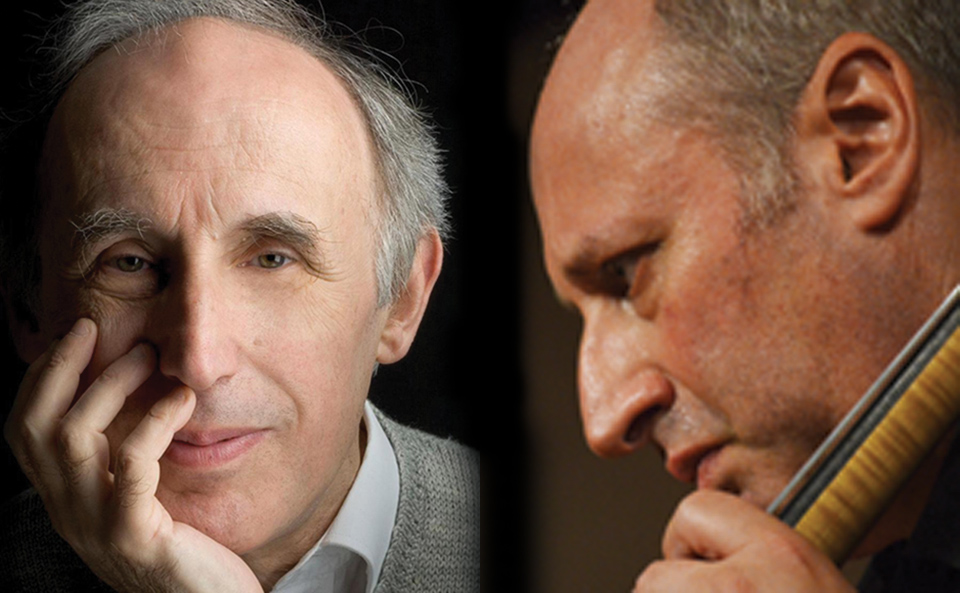
Join Misha Quint (cellist) and Bruno Canino (pianist) for the latest installment of the InterHarmony® International Music Festival Concert Series at Weill Recital Hall. Their program offers no gimmicks or tricks, only the peaks of the repertoire for cello and piano, from Beethoven to Stravinsky. Tickets are $40, and can be purchased by calling CarnegieCharge at 212-247-7800, at the Carnegie Hall box office located at West 57th and Seventh Avenue, or online at www.carnegiehall.org For more information on the series, visit www.interharmony.com.
Quint’s concert series at the Weill Recital Hall has long important provided a bridge between the musical cultures and stars of America and Europe. In this recital, he offers "no frills, only chills and cello” – and an opportunity to hear legendary Italian pianist and Naxos recording artist Bruno Canino live in New York. After collaborations in Italy, the two internationally regarded performers now bring a program of monuments of the cello and piano literature to Quint’s home turf: Beethoven’s foundational Cello Sonata No. 3 in A Major, Op.69, Schubert’s heart-breaking Arpeggione, Stravinsky’s neo-classical masterpiece, the Suite Italienne, and Tchaikovsky’s final work for cello: the Pezzo capriccioso, Op.62.
The cello and piano’s shared history truly begins with Beethoven’s Cello Sonata No.3 in A Major, Op.69, the first sonata ever to feature a real balance between these two instruments. Dating from the ‘heroic’ period of the 5th Symphony, it announces its intentions with the solemn and fearless statement of the theme by the cello solo, before launching into an all-encompassing emotional dialogue that could only be Beethoven’s. The arpeggione itself (a sort of bowed guitar) had long died out when its sole masterpiece, Schubert’s Arpeggione Sonata in a minor was finally published in 1871. But where the instrument was ephemeral, cellists have ensured that the music lived on. Its six strings allowed Schubert to create an aria of unique poignancy that goes beyond the physical possibilities of the human voice, a chiaroscuro of longing and joy. The cellist must accomplish all this on four strings, but is armed with a greater capacity to communicate emotion than the arpeggione could provide. In Paris in 1920, Stravinsky created a ballet, Pucinella, by ‘re-composing’ the music of Pergolesi, populating the lost world of Neapolitan opera buffa with Picasso harlequins. Later, on tour with the great cellist Gregor Piatigorsky, he arranged it into the Suite Italienne. Stravinsky embeds Pergolesi’s classically beautiful melodies in settings marked by his special harmonic and rhythmic genius, ornamented with virtuoso touches undreamt of in the 18th century. Tchaikovsky’s Pezzo capriccioso, Op.62 is a show-stopper whose whimsical title belies its passionate depths. Composed in the same key as his tragic final Symphony Pathétique, its mercurial changes of key and character open its emotional palette to eruptions of doubt, proud assurances, virtuosic playfulness and lyrical surges of hope. .
Cellist MISHA QUINT made his orchestral debut at the age of 13 after winning first place in the Boccherini Competition in St. Petersburg. Some of the celebrated orchestras that Quint has performed with include: Orquestra Sinfônica do Teatro Nacional do Brasilia, The Metropolitan Symphony, New York Chamber Orchestra, The National Irish Symphony, Brooklyn Philharmonic, London Soloists Chamber Orchestra at Queen Elizabeth Hall, The Moscow State Symphony Orchestra, The Leningrad Philharmonic Orchestra, Leningrad State Orchestra, Orchestra of Classical and Contemporary Music and the Symphony Orchestras of Latvia and Georgia. Quint has worked with an equally illustrious group of conductors, including Maxim Shostakovich, Paul Lustig Dunkel, Colman Pearce, Sidney Harth, Ravil Martinov, Camilla Kolchinsky, Yaacov Bergman, Franz Anton Krager and Ira Levin, and premiered works the most outstanding composers of today including Sophie Goubadalina, Robert Sirota, Steven Gerber, Thomas Fortmann, Nathan Davis, and Alfred Schnittke. Quint is an active chamber musician and has performed with such artists as Nikolai Znaider, Bela Davidovich, Bruno Canino, Julian Rachlin, Jean-Bernard Pommier, Sherban Lupu, Boris Kushnir, and Mikhail Kopelman. Quint started founding music festivals in Europe in 1997 with the creation of The International Cello Festival in Blonay, Switzerland, followed by the Soesterberg International Music Festival in Holland in 1998. Quint established the InterHarmony Music Festival in Geneva, Switzerland in 2000, and has since moved iterations of the festival to San Francisco, the Berkshires in Massachusettes, Schwarzwald, Germany, Sulzbach-Rosenberg, Germany, and Tuscany, Italy, as well as the InterHarmony Concert Series at Carnegie Hall in New York City. Quint is currently on the faculty of the Preparatory Division at Mannes College The New School for Music, in Manhattan. Quint's April 2016 release of Matryoshka Blues on the Blue Griffin Label won the Gold Global Music Award for New Release, Album, and Artist, and was featured in the Top 5 Spring Albums.
Born in Naples, Bruno Canino studied piano and composition at the Conservatorio Verdi in Milan, where he taught solo piano for 24 years. He has performed both as a soloist and a chamber musician in all the great concert venues of Europe, US, Australia, Japan and China. For over forty years he has been regularly performing with Antonio Ballista, his piano Duo partner, and since thirty he is a member of the Trio of Milan. Bruno Canino regularly performs with such eminent musicians as Salvatore Accardo, Lynn Harrell, Viktoria Mullova, Itzhak Perlman, and Uto Ughi, among others. For many years he has been Artistic Adviser of the Giovine Orchestra Genovese and, later, of the International Music Campus in Latina for the autumn season. At the moment Bruno Canino is the Director of the Venice Biennale Music Department. Bruno Canino is deeply interested in contemporary music and has collaborated with such distinguished composers as Pierre Boulez, Luciano Berio, Karl-Heinz Stockhausen, Georg Ligeti, Bruno Maderna, Luigi Nono, Sylvano Bussotti and others, the works of whom he has often premiered. Bruno Canino''s recent recordings include the Goldberg Variations, the complete piano works by Casella, and lately it has been released the first CD of the complete Debussy piano works. He holds a master-class of piano and chamber music of the XX century at the Bern Conservatory. In 1997 Passigli Editions published his book "Vademecum for a chamber pianist".
Beethoven: Cello Sonata No.3 in A Major, Op.69
Stravinsky: Suite Italienne for Cello and Piano
Schubert: Sonata in a minor for Arpeggione and Piano, D821
Tchaikovsky: Pezzo capriccioso, Op.62
Tickets for all three performances are $40, and can be purchased by calling CarnegieCharge at 212- 247-7800; at the Carnegie Hall box office located at West 57th and Seventh Avenue or online at www.carnegiehall.org
Press Contact:
Caitlin McConnell
InterHarmony International Music Festival
P.O. Box 286252
New York, NY 10128
[email protected]
Haydn: Cello Concerto No.1 in C Major
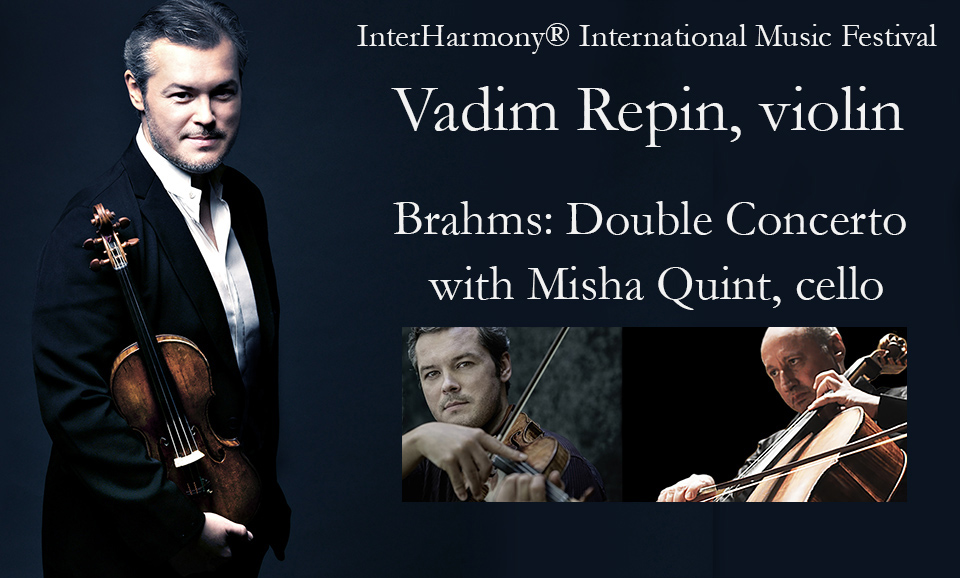
Brahms: Double Concerto
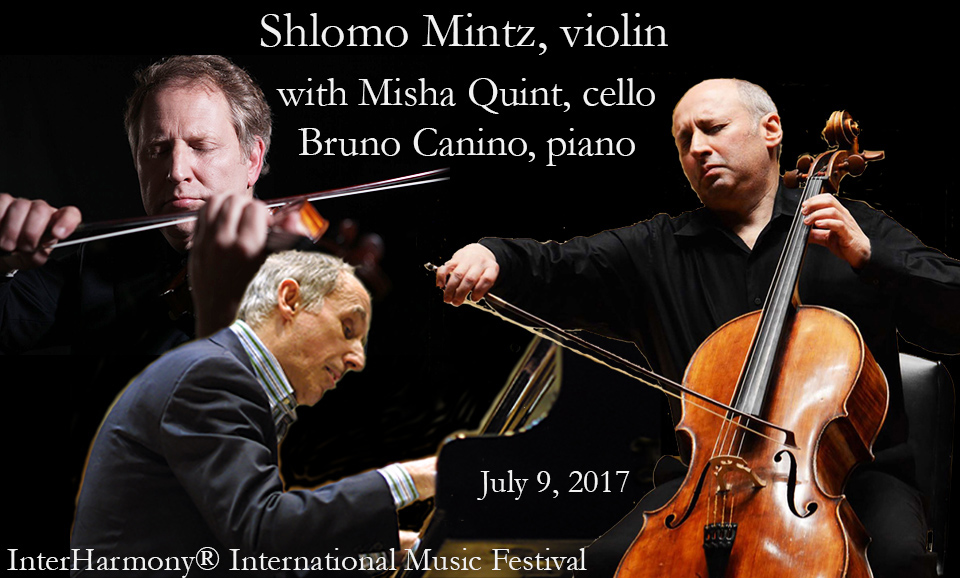
Rachmaninoff: Trio elegiaque No.1 in g minor
Kodály: Sonata for Violin and Cello, Op.8
Tchaikovsky: Piano Trio, Op.50

Rachmaninoff: Trio elegiaque No.1 in g minor
Kodály: Sonata for Violin and Cello, Op.8
Tchaikovsky: Piano Trio, Op.50
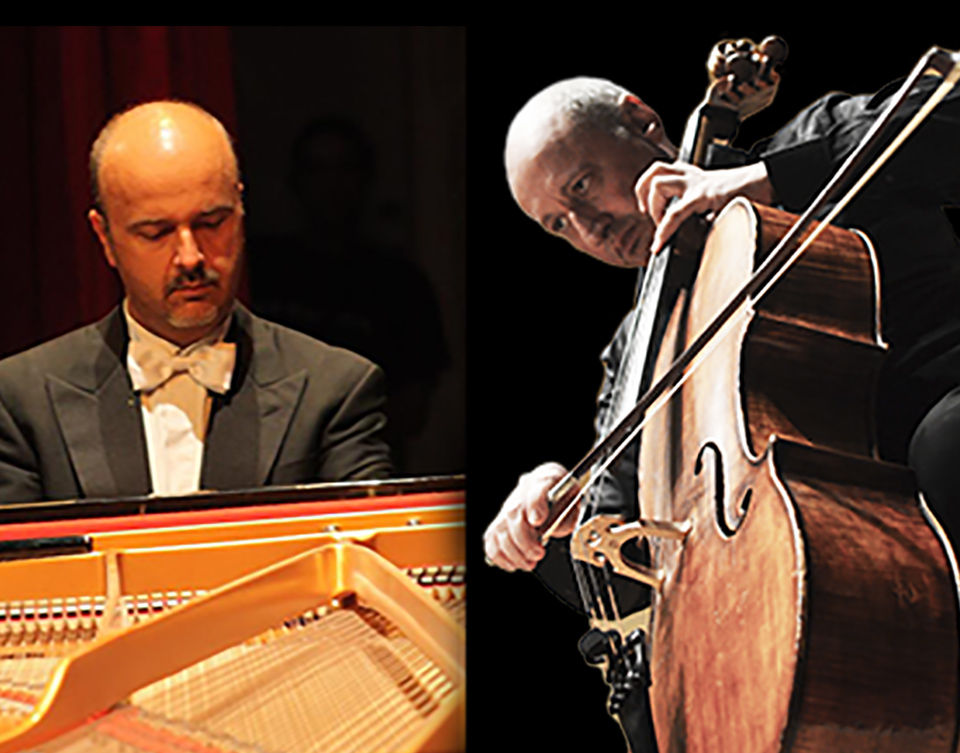
Shostakovich and Scriabin

Beethoven: Cello Sonata No.3 in A Major, Op.69
Stravinsky: Suite Italienne for Cello and Piano
Schubert: Sonata in a minor for Arpeggione and Piano, D821
Tchaikovsky: Pezzo capriccioso, Op.62
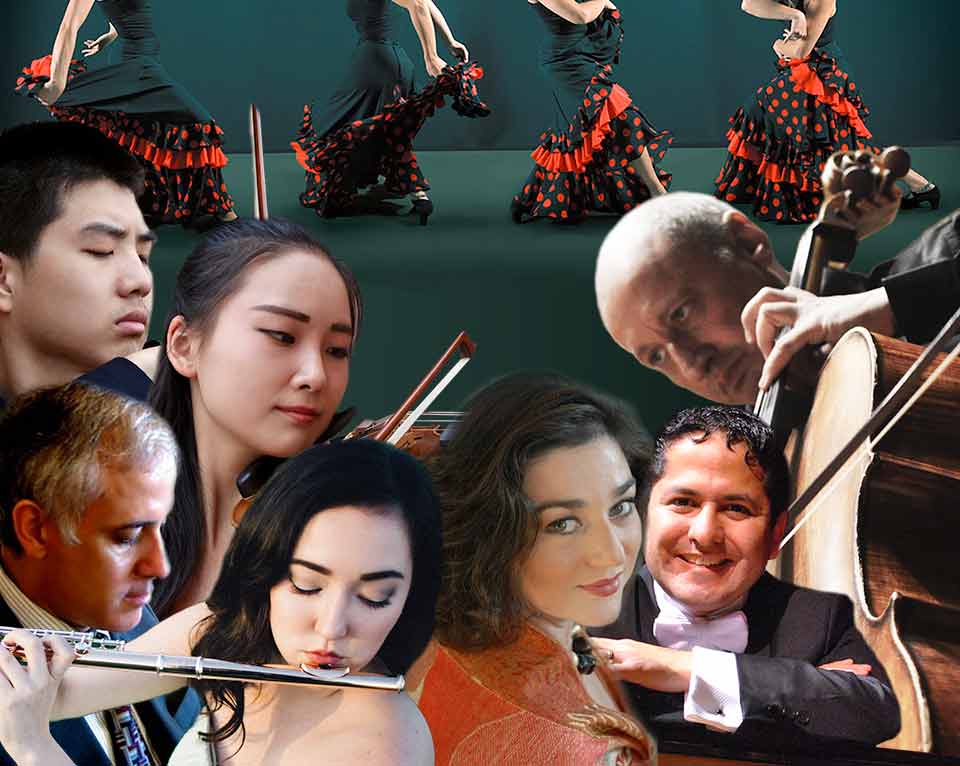
Internationally acclaimed Russian-born American cellist Misha Quint will be featured in concert at Carnegie's fabled jewel-box Weill Recital Hall on Thursday, May 11th at 8 p.m., Under the auspices of the InterHarmony® International Music Festival, this season closer in Manhattan will be a varied evening of romantic Latin music themed "Flamenco, Tango, and Jazz." True to InterHamony's mission, this night offers a rich mix of the well-loved and the unusual, performed by globally renowned artists and brilliant young musicians on their way. From arias of Bizet's Carmen and instrumental selections of Granados, Piazzolla, Falla, Casals, and Sarasate, there will also be more contemporary music of Ginastera, the Russian Rodion Shchedrin's tribute to Albeniz, and Englishman Michael Mower's witty Flute Sonata Latino. Tickets are $40, and can be purchased by calling CarnegieCharge at 212-247-7800, at the Carnegie Hall box office located at West 57th and Seventh Avenue, or online at www.carnegiehall.org.
Misha Quint, neatly described by the late distinguished critic Harris Goldsmith as a "brilliantly accomplished virtuoso - an embodiment of interpretive and executive music-making at its rarefied best," will be joined in solo sets by operatic soprano Anya Fidelia, lauded by the New York Times' Anthony Tommasini with "Anya Fidelia... put the role across in an intense and appealing performance." Also showcased will be one of South America's most distinguished pianists, Ecuadorian Washington Garcia who has concertized around the world. Supporting the next generation, InterHarmony presents the Carnegie Hall debuts of prize winning flutist Elyse Davis, finishing her DMA at FSU, and the accomplished violinists Sicong Chen and Jingting Liu, classmates at ASU. New York veteran Eduard Laurel will provide the accompaniments.
The InterHarmony International Music Festival based in New York City has imprints in Florida, The Netherlands, The Berkshires, and San Francisco, and summer residencies in the picturesque European cities of Sulzbach-Rosenberg, Bavaria, and Acqui Terme, Piedmont, Italy. Concerts are presented where wonderful young talents can take flight under the tutelage of music’s greatest artists.
Please join us for our Hispanic celebration with an international cast this 11th of May. Olé!
Mike Mower: Sonata Latino for Flute and Piano
Elyse Davis, flute
Eduard Laurel, piano
Bizet: Seguidille from Carmen
Bizet: Habañera from Carmen
Lecuona: Romanza di Maria from Maria La
Chapí: Al pensar en el dueño de mis amores
Torroba: La Petenera
Anya Fidelia, soprano
Eduard Laurel, piano
Sicong Chen, violin
Jingting Liu, violin
Eduard Laurel, piano
Ginastera: Danzas Argentinas, Op.2
Albeniz: Evocación from Suite Iberia, Book I
Granados: El Pelele from Goyescas
Washington Garcia, piano
Granados: Intermezzo from the Opera Goyescas
Granados: Spanish Dance No.6
Piazzolla: Le Grand Tango
Pablo Casals: The Song of the Birds
da Falla: Ritual Fire Dance from El Amor Brujo
Rodion Shchedrin: In the Style of Albeniz
Misha Quint, cello
Eduard Laurel, piano
Buy Tickets
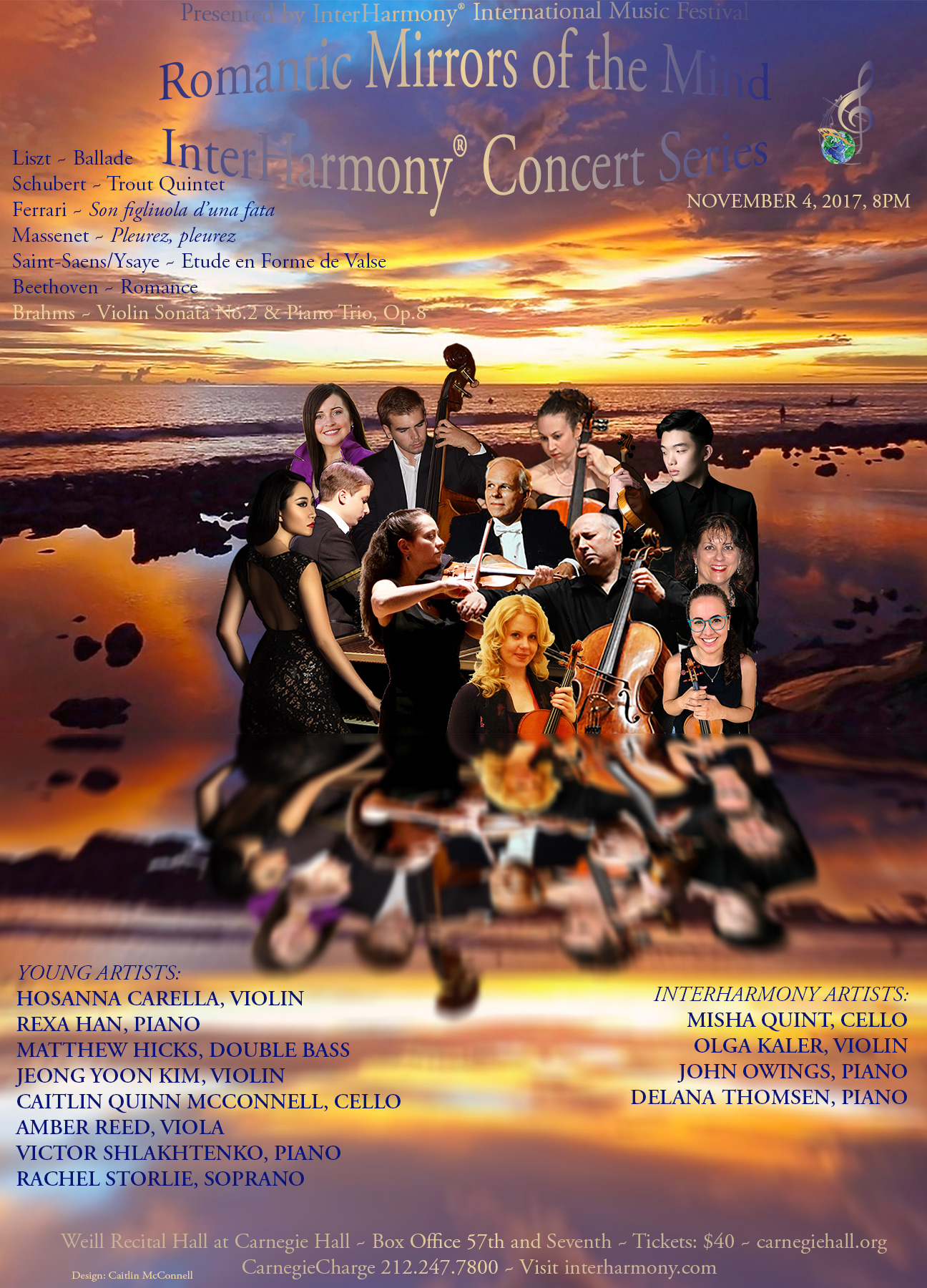
On Saturday, November 4th at 8PM master cellist and Founder of InterHarmony® International Music Festival Misha Quint will perform with brilliant colleagues and young artists in a gorgeous program of 18th and 19th century music he has curated to open the 5th Anniversary InterHarmony® Concert Series at Carnegie’s Weill Recital Hall.
Mirrors are essential for knowing ourselves, the mirrors of the mind the most important; the best mirror is music to show us who we are, and of that the Romantic to expose the depths of our psyche, our worst fears, our greatest joys. Tickets are $40 and can be purchased by calling CarnegieCharge at 212-247-7800, at at www.carnegiehall.com, or at the box office on 57th and 7th Ave.
This concert is shaped with tempestuous changes of mood that coalesce to a transcendence of ardor and mystery. The terror of Liszt's bombast gives way to the delights of a Schubert chestnut, naïve yet of exquisite sophistication that has its own moments of darkness. An unassuming though perfect gem of an obscure song will introduce a famous aria of anguish. Salon pyrotechnics on the violin will meet the patrician warmth of Beethoven, and Brahms will own the rest of the evening, first with tranquility, then concluding with a youthful masterpiece, grand.
Liszt's second Ballade in B-minor is a phantasmagorical tone poem, a showcase that tests the virtuosity of the pianist, his mettle to conjure the gothic horror tale of Lenore, her midnight journey with the zombie of her slain fiancé to their wedding attended by skeletons and ghouls. Victor Shlyakhtenko, piano
Schubert's Variation movement on a theme from the composer's most beloved song, The Trout, gives this Piano Quintet its moniker. This charming fish darts here and whither, though the storminess of the minor variation shows our fury to the cold-blooded fisherman that reels in our friend. Jeong Yoon Kim, violin, Amber Reed, viola, Caitlin McConnell, cello, Matthew Hicks, double bass, and Rexa Han, piano
Carlotta Ferrari was an Italian opera composer and poet, and her song Son figliuola d'una fata (I am the daughter of a fairy) is a perfect little scena to contrast Massanet's aria Pleurez mes yeux, among the greatest plangent expressions in the French repertoire. We weep for our heroine, her obligation to take revenge on her lover that accidentally killed her father. Rachel Storlie, soprano, Delana Thomsen, piano
Saint-Saëns' Etude en Forme de Valse transcribed by Ysaÿe for violin and piano is a one whose fireworks are the sparks that fly from the diamonds of ingenués at their balls of La Belle Époque. Beethoven's Romance in F Major expresses his love with greatest dignity. Jeong Yoon Kim, violin, Delana Thomsen, piano
The lyric contentment of the first movement of Brahms' A Major Violin Sonata reflects the composer's mood, written during a summer's vacation in Thun, Switzerland. Hosanna Carella, violin, Delana Thomsen, piano
Brahms' B-Major Trio, written when the composer was only twenty, overflows with the best of human feeling, through the four movements first of warmth to unbounded passion, Prussian impishness that explodes to paroxysms, a quiet intimacy of feelings of near silent holiness, topped with an unsettled mystery, in the minor, a wandering one, ending with thunderbolts. Olga Kaler, violin, Misha Quint, cello, Owings, piano - What a way to conclude this whirlwind night of such myriad facets of The Romantic!
Liszt (1811 – 1886): Ballade No. 2 in B minor, S. 171
Victor Shlyakhtenko, piano
Schubert (1797 – 1828): Piano Quintet in D Major, D667, The Trout
IV. Tema con variazione. Andantino
JeongYoon Kim, violin
Amber Reed, viola
Caitlin Quinn McConnell, cello
Matthew Hicks, double bass
Rexa Han, piano
Ferrari (1837-1907): Son figliuola d’una fata
Massenet (1842 – 1912): Pleurez, pleurez mes yeux, Weep, weep my eyes from Le Cid
Rachel Storlie, soprano
Delana Thomsen, piano
Saint-Saens (1835 – 1921)/Ysaye (1858 – 1931): Etude en Forme de Valse, Op.52
Beethoven (1770 – 1827): Romance No.2 in F Major, Op.50
Jeong Yoon Kim, violin
Delana Thomsen, piano
INTERMISSION
Brahms (1833 – 1897): Sonata No.2 for Violin and Piano, Op.100
Hosanna Carella, violin
Delana Thomsen, piano
Brahms (1833 – 1897): Piano Trio in B Major, Op.8
Olga Dubossarskaya Kaler, violin
Misha Quint, cello
John Owings, piano
Buy Tickets
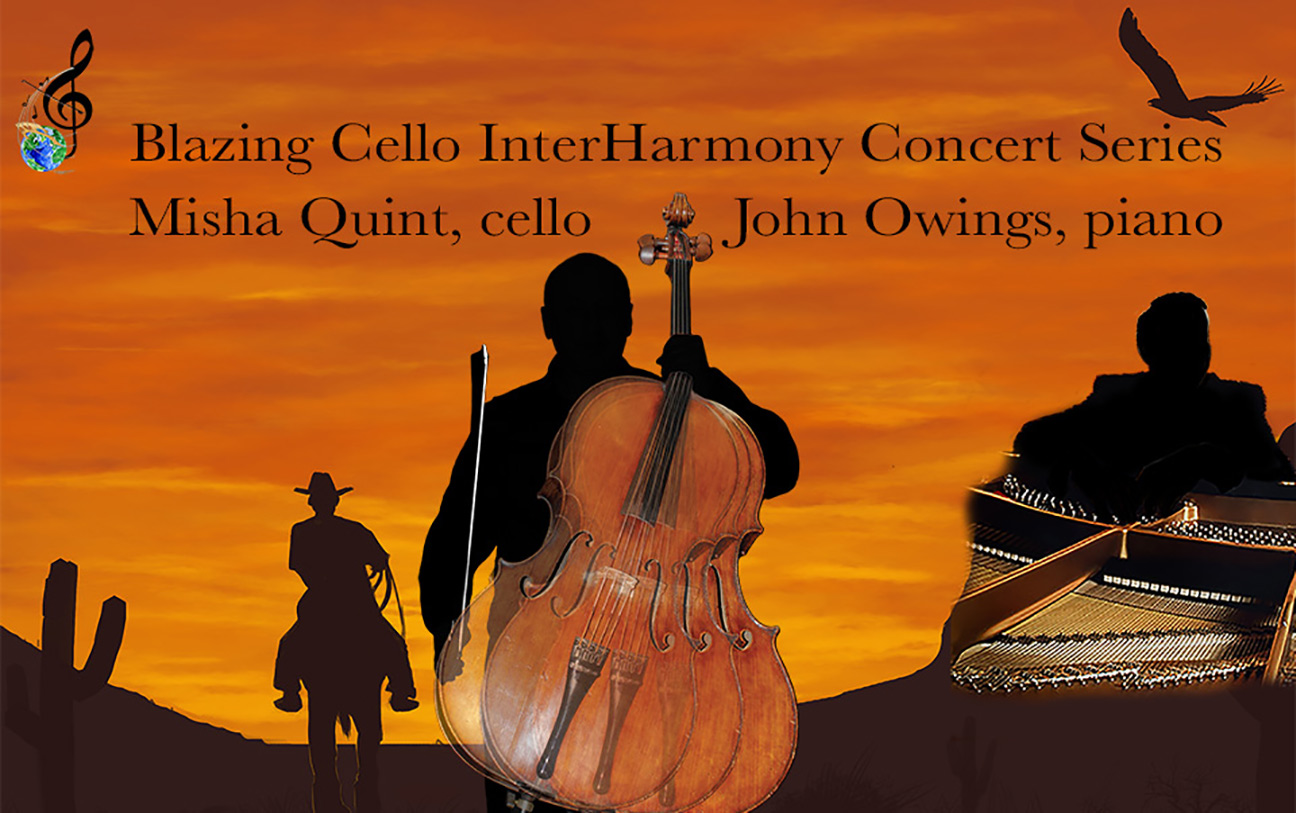
The extraordinary Russian cellist Misha Quint will soar his soul on the wings of the superb pianist John Owings in a varied duo-recital leaning towards Russia, corralled by two masterpiece sonatas encased with several delightful show pieces.
At The Modern Art Museum of Fort Worth, Saturday afternoon February 3rd at 2PM, this event marks the exciting entry of InterHarmony's Concert Series into the Texas scene. InterHarmony® International Music Festival is an organization that presents concerts worldwide, offering the most extraordinary artists with brilliant up-and coming talents they nurture during their programs in the United States and Europe. Tickets are $35 for Adults, $30 for Seniors, and can be bought online at https://www.eventbrite.com/e/blazing-cello-interharmony-concert-series-in-fort-worth-tickets-41259535381 or 2 hours before the concert at the door.
Misha Quint, Music Director and Founder of InterHarmony, is a three-time Gold Medalist in the 2016 Global Music Awards. Mr. Quint has been praised for being "a masterful Paganini-player and a true devil's cellist" in the Sulzbach-Rosenberger Zeitung.
Partnering Mr. Quint is the native Texan John Owings, another artist with an international reputation. The London Daily Telegraph praised him for his "real spiritual elation." A distinguished professor of piano at TCU, he is decorated with the university's highest honor, its Chancellor's Award.
Shostakovich's Cello Sonata opens the program with the seriousness, anger, tragedy and burlesques one associates with this composer, then Haydn's Divertimento in Piatigorsky's transcription contrasts with its ebullient high-classical style.
Debussy's Cello Sonata explores fantastical themes with Iberian colors, then Schubert's soulful 3rd Piano Impromptu is offered in a transcription; Rostropovich's rarity, Humoresque, will whirlwind an impish and virtuoso dervish. Stravinsky's Chanson Russe cubist elements are well placed in The Modern, and the evening concludes with Tchaikovsky's Pezzo Capriccio, so sad, yet so brilliant.
Quint and Owings will blaze the hall with torrents of sounds and shapes beyond one's imagination, and we will hear things never heard before, we will feel things never felt before.
Posse on down!
The second concert, Souvenir d’InterHarmony, will premiere on March 24, 2018.
Haydn-Piatigorsky: Divertimento in D Major for Cello and Piano
Shostakovich: Sonata for Cello and Piano in D minor, Op.40
Debussy: Sonata for Cello and Piano
Schubert: Impromptu No. 3 in G Major, D899
Rostropovich: Humoresque, Op.5
Stravinsky: Chanson Russe – Parasha’s Aria from Marva
Tchaikovsky: Pezzo capriccioso, Op.62
Buy Tickets
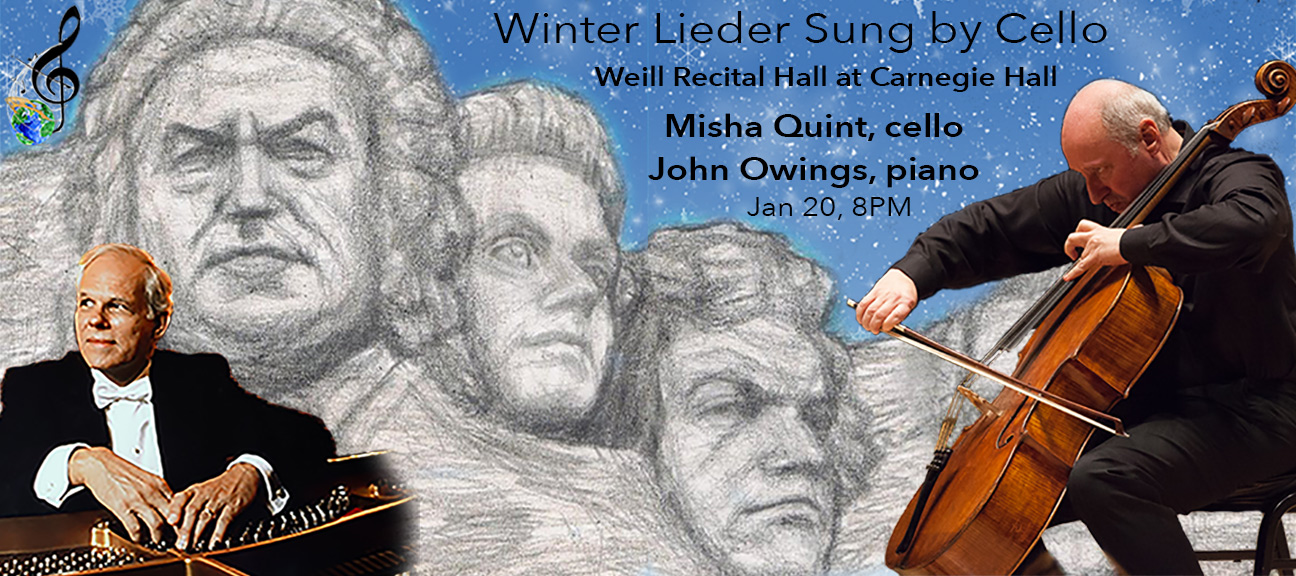
New York music lovers will have a chance to be present at "Winter Lieder Sung by Cello" on January 20 at 8pm, a recital of major works of the cello repertoire given by Russian American cellist Misha Quint and celebrated pianist John Owings, as part of the InterHarmony Concert Series presented by the InterHarmony® International Music Festival.
The unique closeness of the relationship between the cello and the human voice was always a subtle yet very pronounced quality of writing in the works of German composers J.S. Bach, Ludwig van Beethoven, Robert Schumann, and Woldemar Bargiel. Tickets are $40 and can be purchased by calling 212-247-7800, at www.carnegiehall.com, or at the box office on 57th and 7th Ave.
The opening with Adagio, written by Clara Schumann’s half-brother, Bargiel, is the perfect example of singing lines of phrases that would be so typical for traditional German Lieder.
Followings is J.S. Bach’s momentous Unaccompanied Cello Suite No.6, one of the most difficult pieces in cello repertoire, referred to by Mstislav Rostropovich as a “symphony for the cello”. Left alone without piano accompaniment, the cello becomes a solo voice that creates an acapello singer effect that will bring a surprising acoustical contrast to the stage.
This music monologue will transfer into the epic work of the last Cello Sonata No.5 by Beethoven, that led all melodic lines to create complex, almost symbiotic tonal harmonies, especially visible in its fugue. Both Beethoven’s Sonata No.5, and Bach’s Suite No.6 are each composer’s cello masterpiece and considered to be their most difficult and virtuosic.
Robert Schumann’s imaginative 5 Pieces in a Country (or Folk) Style illustrate Goethe’s poetic story-telling, particularly in the first, Vanitas vanitum, which lists “with humor” as the tempo marking, and the third, which quotes one of Schumann’s favorite lieder, In a dream I wept. These popular romantic songs couldn't be a better example of the concert's title, “Winter Lieder Sung by Cello”.
J.S. Bach (1685-1750): Unaccompanied Cello Suite No.6 in D Major, BWV 1012
Beethoven (1770-1827): Sonata for Cello and Piano No.5 in D Major, Op.102, No.2
Schumann (1810-1850): 5 Pieces in a Country Style for Cello and Piano, Op.102
Bargiel (1828-1897): Adagio in G Major, Op.38
Buy Tickets
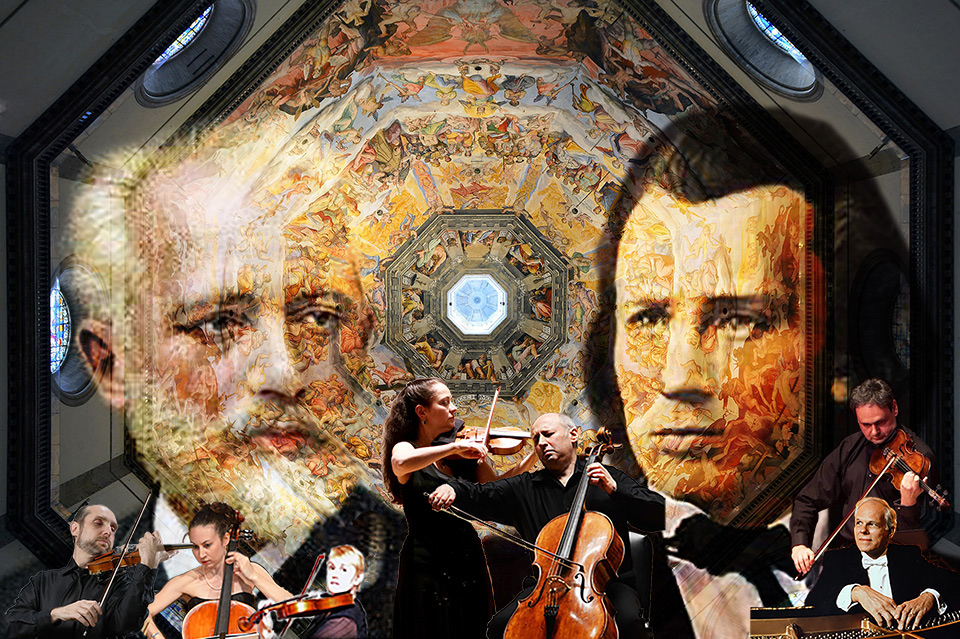
At the Modern Art Museum of Fort Worth, Texas, InterHarmony International Music Festival will present a rare opportunity to compare two titans of the Romantic period through their most beloved chamber works superlatively performed by a roster of internationally acclaimed musicians. On Saturday, March 24 at 2PM Brahms' 1st Piano Trio in B-major will share the stage with Tchaikovsky's String Sextet, Souvenir de Florence. Tickets are $35 for Adults, $30 for Seniors, $10 for Students, and can be bought on https://www.eventbrite.com/e/souvenir-dinterharmony-at-the-modern-interharmony-concert-series-tickets-42696482328 or 2 hours before the concert at The Modern Museum of Art.
There are famous rivalries and jealousies in world of art, da Vinci and Michelangelo, Gaugin and Van Gogh that cost him his ear and Pollock and de Kooning's was more about a war of the critics that championed them. About Brahms and Tchaikovsky, perhaps their misunderstanding of each other's aesthetic is like the arguments between Ingres and Delacroix, about classicism versus unbridled Romanticism.
Though the men shared the same birthdate, May 7th, besides a love of drink, they shared not a regard for each other's music. Brahms once infamously fell asleep during a rehearsal of the younger composer's 5th Symphony, and the aristocratically elegant Tchaikovsky was scabrous in his expression of disdain to Brahms.
"What an ungifted swine! It angers me that this conceited mediocrity is regarded as a genius." "Mr. Brahms! I consider you to be a very untalented person, full of pretensions but utterly devoid of creative inspiration." ~ Tchaikovsky's Diary Entry from 1886
A contemporary scribe wrote, "Tchaikovsky's music sounds better than it is; Brahms' music is better than it sounds."
Decide for yourself!
Both works are in four movements, and in classical forms. The Brahms Trio was written when the composer was twenty, a work driven by the passions and ardors of a young man, a work that ending darkly in the minor expresses a pessimism of Schopenhauer. It is spiritual. The performers will be Olga Kaler (violin), Misha Quint (cello) and John Owings (piano).
Tchaikovsky's Souvenir was written when the composer was fifty. Its music is torrid, and graceful. It is dramatic opera; it is ballet; it is flesh-and-blood, performed by Olga Kaler and Leonid Yanovskiy (violins), Misha Galaganov and Inga Kroll (violas) and Misha Quint and Caitlin McConnell (cellos). More information can be found at https://www.interharmony.com/interharmony-concert-series-fort-worth-texas
From this afternoon you will take away two unforgettable souvenirs to cherish.
Brahms: Piano Trio No.1 in B Major, Op.8
Olga Kaler, violin
Misha Quint, cello
John Owings, piano
Tchaikovsky: Souvenir de Florence String Sextet, Op.70
Olga Kaler, violin
Leonid Yanovskiy, violin
Misha Galaganov, viola
Inga Kroll, viola
Misha Quint, cello
Caitlin Quinn McConnell, cello
Buy Tickets
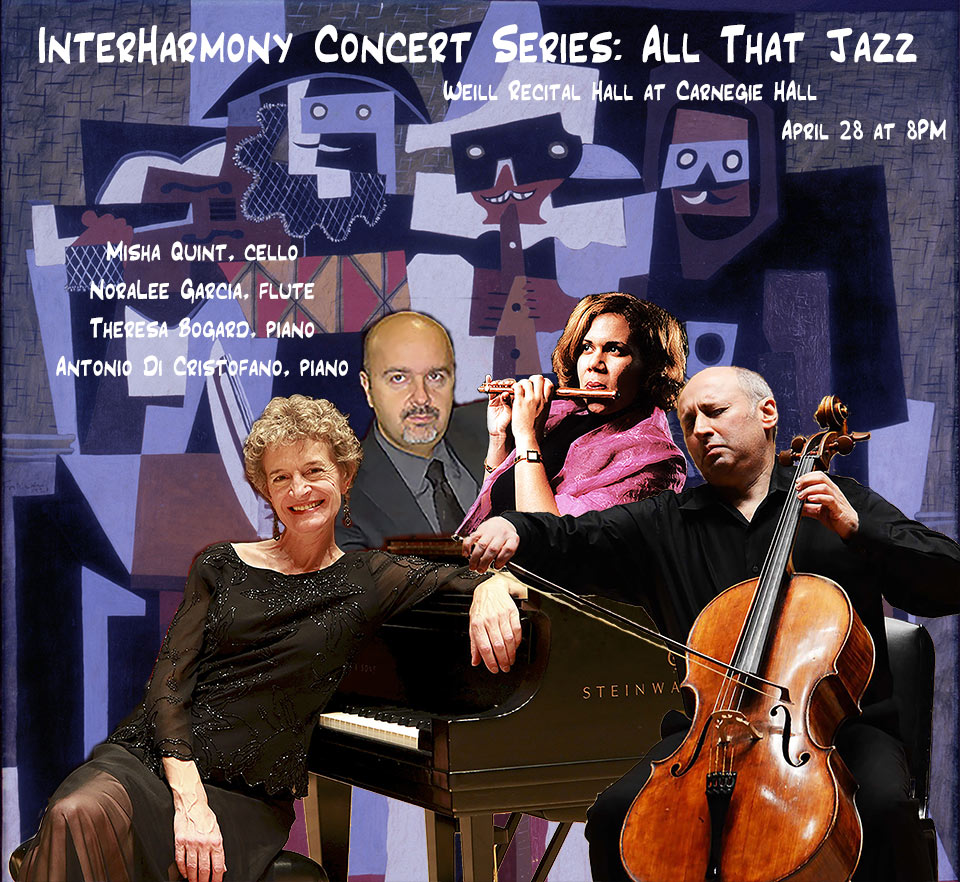
When somebody is looking for a jazzy evening, going to the “All That Jazz” final concert of InterHarmony Concert Series at the Weill Recital Hall at Carnegie Hall sounds like a very logical solution. This time InterHarmony® International Music Festival’s Director, cellist Misha Quint invites his virtuoso friends from around the world to bring the New York audience a bouquet of diverse styles of music, which, like a range of exotic flowers, will deliver a special taste of its rare, seductive aroma. Tickets are $40 and can be purchased by calling 212-247-7800, at www.carnegiehall.com, or at the box office on 57th and 7th Ave.
With “All That Jazz”, InterHarmony offers a program that embraces all musical genres and connects them with the theme of jazz: from the technically demanding and elegant Baroque gem, Cello Sonata by Valentini, to the extravagant, unusual flute and cello duo, The Jet Whistle, by Brazilian composer Villa-Lobos; from lyrical piano solos by Chopin, leaping to a rhythmically charged piece by leading American composer Libby Larsen based on the African Dance, Juba; and finally the jazz Trio for Flute, Cello, and Piano of the famous Russian composer, Nikolai Kapustin.
The opening of the Kapustin Trio immediately lets the listener know that they should expect absolutely anything, blasting with all possible virtuosic, almost classic jazz. Transitioning to a second slow movement, time stands still with deep emotion, showing the best singing qualities of each instrument, slowly spiraling to a finale, when the sudden realization comes that everything has still not been said. The third movement bursts into a spectacular dance of fiery passages, harmonies and chords, making the performers prove that the impossible is possible.
The performers are Misha Quint (cello), NoraLee Garcia (flute), Theresa Bogard (piano), and Antonio Di Cristofano (piano), and their incredible achievements will add an additional exciting dimension to this evening. More information is at www.interharmony.com.
Villa-Lobos (1887 - 1959): Jet Whistle for Flute and Cello
Nora Lee Garcia, flute
Misha Quint, cello
Libby Larsen (b.1950): Juba
Misha Quint, cello
Theresa Bogard, piano
Chopin (1810 - 1949): Polonaise, Op.26, No.1
Chopin (1810 - 1949): Polonaise Fantasie Op.61
Antonio Di Cristofano, piano
Valentini (1681 - 1753): Sonata for Cello and Piano in E major, Op.8
Misha Quint, cello
Antonio Di Cristofano, piano
Nikolaj Kapustin (b.1937) Trio for Flute, Cello, and Piano, Op.86
Nora Lee Garcia, flute
Misha Quint, cello
Theresa Bogard, piano
Buy Tickets
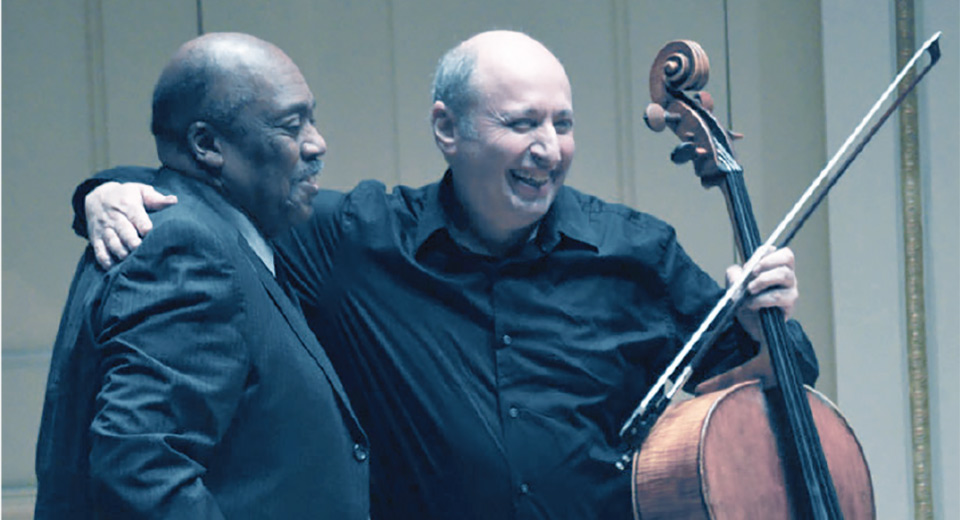
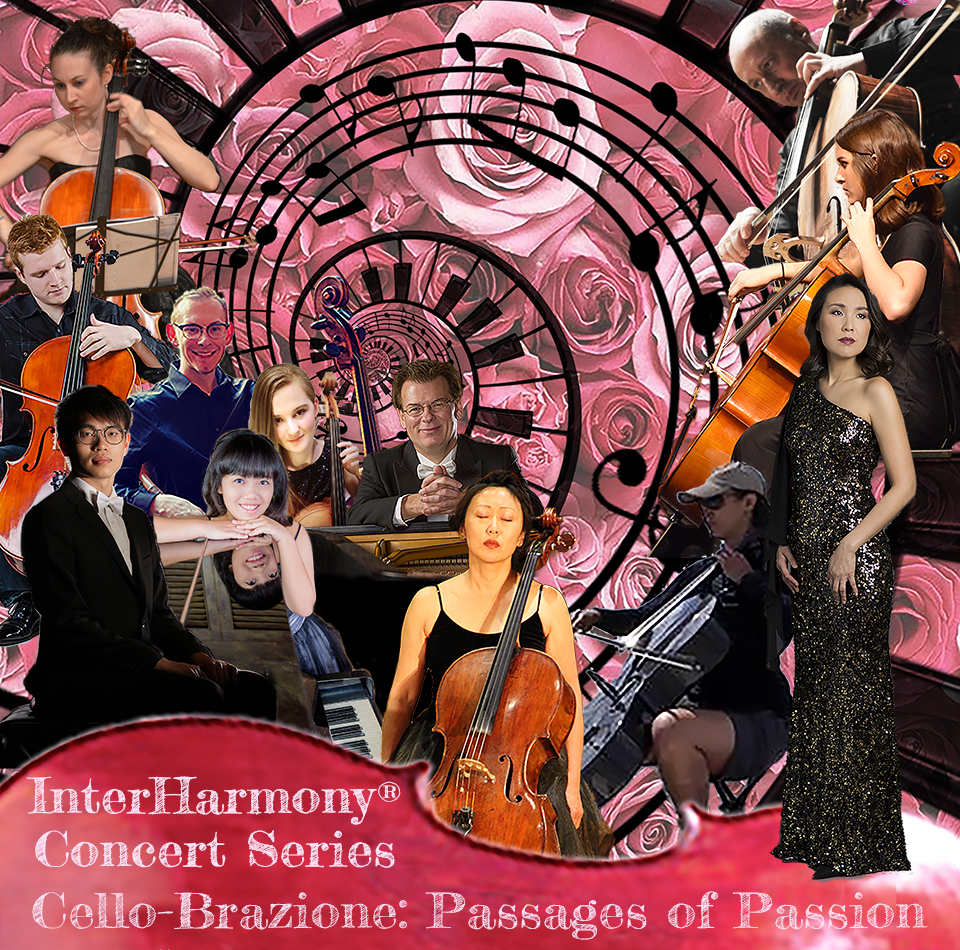
Like passages of running musical notes trying to reach desirable chords of emotions, the presentation of the InterHarmony Concert Series’ Cello-Brazione: Passages of Passion will give the audience a chance to find a special warm touch of sound lingering for days after the concert on November 3, 2018 at 8PM at the Weill Recital Hall at Carnegie Hall. Music Director Misha Quint started the InterHarmony Concert Series six years ago, showcasing the best and brightest international artists and young musicians who performed at the InterHarmony International Music Festival in Italy and Germany. Tickets are $40 and can be purchased by calling CarnegieCharge at 212.247.7800, at www.carnegiehall.com, or at the box office on 57th and 7th Ave.
The program will commence with young artist Shu-Han Shen performing Ravel's Gaspard de la Nuit, III.Scarbo, setting the energy level that will be persistent and even intensified as the concert progresses. Ravel was inspired by the poetic story describing the duplicitous nature of art by Bertrand entitled Fantasies in the manner of Rembrandt and Callot. The movement Scarbo portrays a goblin flitting about a darkened room, casting shadows in the moonlight.
One cannot ponder about passion without Ginastera's Pampeana No.2 to be performed by virtuosic cellist Chungsun Kim and pianist Zeru Wang. In Pampanea, the cello will sing, scream, and crash. Pampeana quotes folk songs from Ginastera’s native Argentina with hints of the malambo dance, evoking images of the pampa flatlands.
Pianist Robert Palmer whose illustrious solo career conquered the hearts of global audiences will perform Chopin's virtuosic Fantasie in f minor with its cascading harmonies intertwined into chords and limitless passages that could finish any concert, yet will only mark the end of the first half of the passionate passages prepared for the evening.
Soprano Hein Jung, acclaimed by the Boston Globe for her “superior vocal value”, together with pianist Zeru Wang will present not only the beauty of the most famous arias, such as Puccini's Quando m'en vo from La Boheme, and Rachmaninoff's Dream, but also contribute to the unraveling theme of passion as cellist Misha Quint joins for Rachmaninoff's Do not sing for me, my love, a Russian aria with cello obbligato.
A choir of 8 violoncellos led by Misha Quint will mark the grand finale of the evening, finishing this journey of passion with a Gershwin Cello Quartet, Villa-Lobos' Bachianas Brasileiras No.1, and a Mambo. Soprano Hein Jung will join the cellos for Villa-Lobos Bachianas No.5, a fiery aria in the Bachianas Brasileiras series, combining Brazilian folk and pop music and influences of J.S. Bach. The InterHarmony Cello Ensemble features InterHarmony artists Ruth Boden, Chungsun Kim, Misha Quint and young artists Genevieve Batman, Brianna Cantrall, Francis Fay, Caitlin McConnell, and Gordon Shaw.
Maurice Ravel (1874 - 1937): Gaspard de la Nuit, III.Scarbo
Shu-Han Shen, piano
Alberto Ginastera (1916 –1983): Pampeana for Cello and Piano, Op.21, No. 2
Chungsun Kim, cello
Zeru Wang, piano
Frédéric Chopin (1810 –1849): Fantasie in f minor, Op.49
Robert Palmer, piano
Giacomo Puccini (1858 – 1924): Quando m'en vo from La Boheme
Sergei Rachmaninoff (1873 –1943): Dream, Op. 38, No. 5
Hein Jung, soprano
Zeru Wang, piano
Ne poi krasavitsa mne, Do not sing to me, my love, Op. 4 No. 4
Hein Jung, soprano
Misha Quint, cello
Zeru Wang, piano
George Gershwin (1898 - 1937): Fragment for Cello Quartet
Heitor Villa-Lobos (1887 – 1959): Bachianas Brasileiras No.1 for 8 Cellos
Heitor Villa-Lobos (1887 – 1959): Bachianas Brasileiras No.5 for Soprano and 8 Cellos
Wilhelm Kaiser-Lindemann (1940 - 2010): Mambo for Ensemble di Violoncelli
InterHarmony Cello Ensemble:
Misha Quint
Ruth Boden
Chungsun Kim
Genevieve Batman
Brianna Cantrall
Francis Fay
Caitlin Quinn McConnell
Gordan Shaw
Buy Tickets

The core of the nature of creating melodic musical lines is the ability, with the sound of several notes, to express colorful feelings and images that make them personal to each listener - the invisible shape of music.
The program, The Invisible Shape of Music, on the 25th of January at 8PM, creates this invisible but powerful exhibition of a wide range of emotions, displaying all musical styles with the resolve of Beethoven, baroque Bach, capricious Schumann, and impressionistic Debussy. Cellist Misha Quint and pianist John Owings will perform this concert presented by InterHarmony® International Music Festival at the Weill Recital Hall at Carnegie Hall. Tickets can be purchased at carnegiehall.org or by calling CarnegieCharge at 212.247.7800.
Starting with the meditation-like opening of the first movement of Beethoven's late Sonata No.4, his invisible melodic lines transform into heroic struggle. It almost feels as though Beethoven is fighting his own feelings, where every movement resurfaces something that somehow has not yet been said.
Following the Beethoven, J.S. Bach's Unaccompanied Cello Suite No.2 brings solitude as emotions transfer into the shape of the invisible prayer where each person may hear a desirable note for their heart.
Robert Schumann's Adagio and Allegro brings you through the cascades of subtle nuances and delicate phrases full of passion that are reflected in his major works.
At the end of the evening, spent with emotion, suddenly Misha Quint and John Owings bring Debussy’s Clair de Lune to the stage, with its charm and finesse, melodic lines of Nocturne and Scherzo, and full fire of his Cello Sonata.
Mission finally accomplished.
Beethoven: Cello Sonata No.4, Op.102
J.S. Bach: Suite No.2 in d minor, BWV 1008
Robert Schumann: Adagio and Allegro, Op.70
Claude Debussy: Nocturne and Scherzo for Cello and Piano
Claude Debussy: Clair de Lune
Claude Debussy: Sonata for Cello and Piano
Misha Quint, cello
John Owings, piano
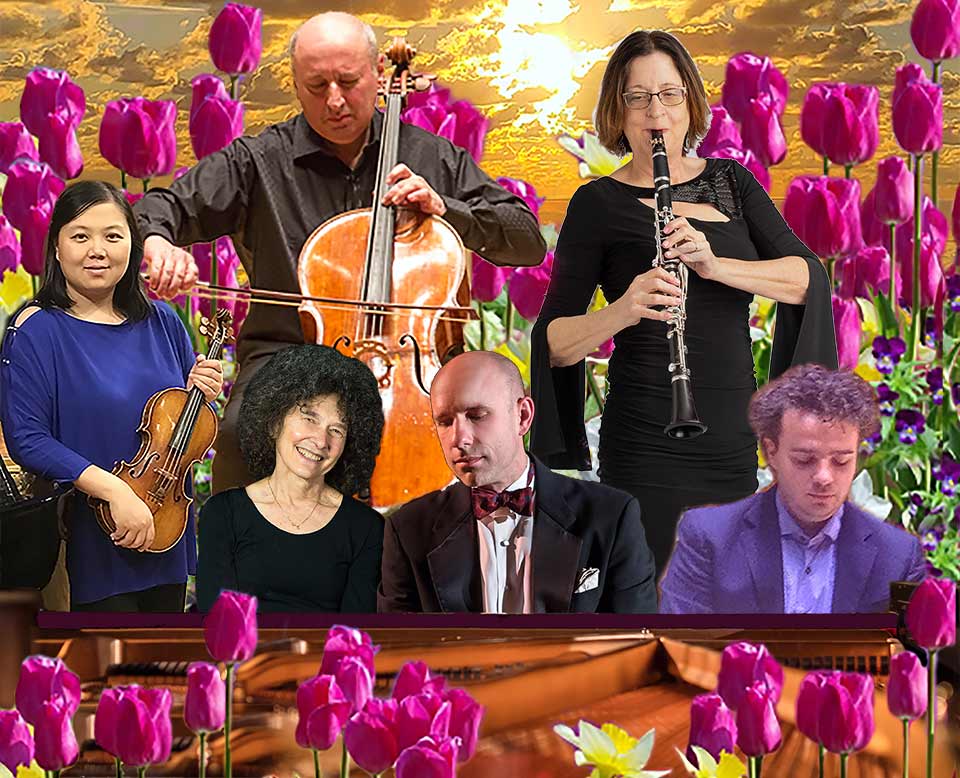
Like a collection of exotic flowers placed in a delicate crystal vase, generating the lush aroma of the coming spring equinox, InterHarmony concludes its 6th season at the Weill Recital Hall at Carnegie Hall, showcasing world-renowned and upcoming artists. The program, Spring Equinotes, will transport the audience into the romantic world of Liszt and Brahms, moving with the finesse of gliding light into Messiaen's art of synesthesia and the improvisational roulades of Kapustin. Tickets can be purchased at carnegiehall.org or by calling CarnegieCharge at 212.247.7800.
The evening will start with Sonata for Violin and Piano by Pulitzer Prize winning American composer John Corrigliano, performed by violinist Aihua Zhang and pianist Christopher Taylor. Sonata displays rare, expressive dynamics and virtuosic flavor, intertwined with a canvas of music lines that could be present through the whole evening.
Ravel’s compositional style, most associated with impressionism, developed through his life, incorporating elements of baroque, neoclassicism, and even jazz. After joining a group of avant-garde poets, artists, and critics called “Les Apaches”, Ravel dedicated Jester’s Aubade from Mirrors Suite to members of that group.
Franz Liszt was the rock star of the 19th century and ultimate soloist. The power of Liszt’s pianism is enhanced with cascades of rich harmonies, and virtuosic, acrobatic passages in Rigoletto Concert Paraphrase. Pianist Alvise Pascucci will perform Ravel and Liszt.
Olivier Eugène Prosper Charles Messiaen, who had almost as many middle names as Dumbledore, claimed to “hear” music as color - synesthesia. Known for his musical experimentation, the audience can imagine colors in his Contemplation of the Joyful Spirit fromTwenty Contemplations on the Infant Jesus.
Russian Jewish composer Nikolai Kapustin is famed for his pianistic improvisation and taking classical composition in the direction of jazz, as heard in his Twenty-Four Preludes in Jazz Style. Pianist Christopher Taylor will perform both works.
The program will finish with Brahm's epic Clarinet Trio, performed by Stacey McColley (clarinet), Misha Quint (cello) and Catherine Kautsky (piano). Anton Webern said “(Brahms) anticipated the developments of the Second Viennese School” and his innovations in the late romantic period led composers to break away from the old rules and flourish in progressive ideas. Trio summarizes all the colors, nuances, and ideas of developing melodic lines that the spectator found earlier in the program. Like sounding springs flowing into the waves of a raging ocean, the extraordinary craftsmanship of Brahms lets each instrument display their superior abilities. The four movements of music will tumble with the velocity of white water rapids streaming to the final chord, creating perfect harmony for InterHarmony's grand finale.
Maurice Ravel (1875 – 1937): Alborada del gracioso, The Jester’s Aubade from Miroirs Suite, Mirrors Suite
Alvise Pascucci, piano
John Corigliano (b.1938): Sonata for Violin and Piano
Aihua Zhang, violin
Christopher Taylor, piano
Franz Liszt (1811 – 1886): Rigoletto concert paraphrase, S.434
Alvise Pascucci, piano
Olivier Messiaen (1908-1992): From Vingt Regards sur l’Enfant-Jésus: Regard de l’Esprit de Joie
Nikolai Kapustin (b.1937): Twenty-Four Preludes in Jazz Style, Op.53
Christopher Taylor, piano
Johannes Brahms (1833 – 1897): Clarinet Trio in a minor, Op.114
Stacey McColley, clarinet
Misha Quint, cello
Catherine Kautsky, piano

InterHarmony International Music Festival opens the 6th season of the InterHarmony Concert Series at Carnegie Hall’s Weill Recital Hall with Echoes of Paradise Lost on November 2 at 8PM.
Times change. The clock’s hands are poised to make circles, but depth of feeling has its hands still with a concentration of intensity that cannot be affected by the heartbeat of the universe. Featuring works by Shostakovich, Schnittke, Chopin, Prjevalskaya, and a New York premiere of newly discovered songs by James Simon, “Echoes of Paradise Lost” evokes the rare condition when different epochs, genres and crucial dramatic moments of humanity symbiotically grow together from the same tree of sounds, passages, and chords.
The InterHarmony Concert Series, started by Music Director Misha Quint, showcases performers from the InterHarmony festivals that take place each summer in Italy and Germany. Tickets are $40 and can be purchased online www.carnegiehall.org or by calling CarnegieCharge at 212.247.7800.
Two contrasting works of Alfred Schnittke underscore the theme of the evening: Suite in the Old Style for Violin and Piano, where reflections of the Baroque are filled with a palette of old-school harmonies at times capricious, and Cello Sonata No.1, intoned with tragic, climactic passages, almost screams of the soul, as if glancing through a prism of the iconic 20th Century composer’s creativity. Sonata mirrors Schnittke’s own life, greatly affected by his experience of Soviet persecution. Cellist Misha Quint and pianist Marianna Prjevalskaya perform Cello Sonata, while Violinist Lydia Sviatlovskaya and pianist Ruoting Li perform Suite.
Chopin’s Scherzo No.2, performed by Marianna Prjevalskaya, naturally brings beauty and finesse to the program. In Prjevalskaya's La Valse a La Ravel, one feels a transformation that echoes Ravel’s impressionism.
After composer James Simon’s death in a Nazi concentration camp, his works survived and were recently found. Richard Novak (tenor) and Ruoting Li (piano) will give the New York premiere of Simon’s The Bell Tolls in the Ground and 5 Lieder.
Shostakovich released Piano Trio No. 2 in 1944. Trio commences with mysterious cello harmonics, then gradually ascends to a storm of devilish dances filled with Jewish melodic tonality in the third movement. Lydia Sviatlovskaya (violin), Misha Quint (cello), and Marianna Prjevalskaya (piano) perform this stellar work of chamber music.
Frederic Chopin (1810 – 1849): Scherzo No.2 in b-flat minor, Op.31
Marianna Prjevalskaya (b.1982):Valse a la Ravel
Marianna Prjevalskaya, piano
Alfred Schnittke (1994 – 1998): Suite in the Old Style for Violin and Piano
Lydia Sviatlovskaya, violin
Ruoting Li, piano
Alfred Schnittke (1934 – 1998): Sonata for Cello and Piano No.1
Misha Quint, cello
Marianna Prjevalskaya, piano
James Simon (1880 – 1944): Five Songs, Op. 4
James Simon (1880 – 1944): A Bell Tolls in the Ground
Richard Novak, tenor
Ruoting Li, piano
Dmitri Shostakovich (1906 – 1975): Piano Trio No.2 in e minor, Op.67
Lydia Sviatlovskaya, violin
Misha Quint, cello
Marianna Prjevalskaya, piano

InterHarmony® Concert Series returns to Carnegie Hall on January 23 with Songs Without Words, featuring cellist Misha Quint and pianist Alexei Volodin. Two virtuosos reunite for a concert framed around the simple idea: music doesn’t need lyrics for the highest expression, with poignantly romantic works by Mendelssohn, Rachmaninoff, Schubert, Davydov and Rostropovich. Tickets can be purchased at www.carnegiehall.org or by calling CarnegieCharge at 212-247-7800. More information can be found at carnegiehall.org or by calling 212.247.7800.
After the concert, Quint and Volodin’s new album, Paris Mirages, will be available for purchase. It will be the debut album for the new InterHarmony® Records label.
The concert will begin from Romance without Words, a piece written by Karl Dadvidov, a monumental cello virtuoso of the 19th century, with sweet and charming melodies. It will end with the music of of the 20th century icon of cello playing, Mstislav Rostropovich, with his Humoresque. These two pieces create a foundation for a bridge made of masterpieces of the cello and piano repertoire at the concert. That spirit will continue in Franz Schubert’s Sonata for Arpeggione and Piano. Originally written for the now-extinct arpeggione, a hybrid instrument that was part guitar and part bowed strings, this sonata is now only played on the cello, which allows the work to take on new warmth and depth.
Felix Mendelssohn’s Song without Words is next, which gave inspiration for the program theme. When Mendelssohn’s friend, Marc-André Souchay, tried to compose words to the music, the composer objected, saying: “There is so much talk about music, and yet so little said…With me it is exactly the reverse, and not only with regard to an entire speech, but also with individual words. These seem to me so ambiguous, so vague, so easily misunderstood in comparison to genuine music which fills the soul with a thousand things better than words. ”
At the heart of the program is Sergei Rachmaninoff’s Sonata for Cello and Piano, written after the composer experienced a severe bout of depression, and premiered with Rachmaninoff at the piano with his friend Antoliy Brandukov in 1901. Sonata is notable for treating piano and cello as equal soloists. Its thick chordal structure and use of the full range of both instruments allow for an intensity imitative of the dynamic expression only found in symphony orchestra performances.
In Rachmaninoff’s haunting Vocalise, originally written for wordless human voice, the cello and piano will recreate this familiar melody with profound emotional intensity without language. Rostropovich’s Humoresque is a perfect ending for the evening’s journey. This virtuosic, almost acrobatic piece is perfect for the duo, written as a birthday gift for Rostropovich’s teacher and famously learned overnight—showcasing brilliance, agility, and playful spirit.
All together with this romantic program in the setting of Carnegie Hall with two international performers, Songs Without Words is a night you can’t miss. More information can be found at interharmony.com.
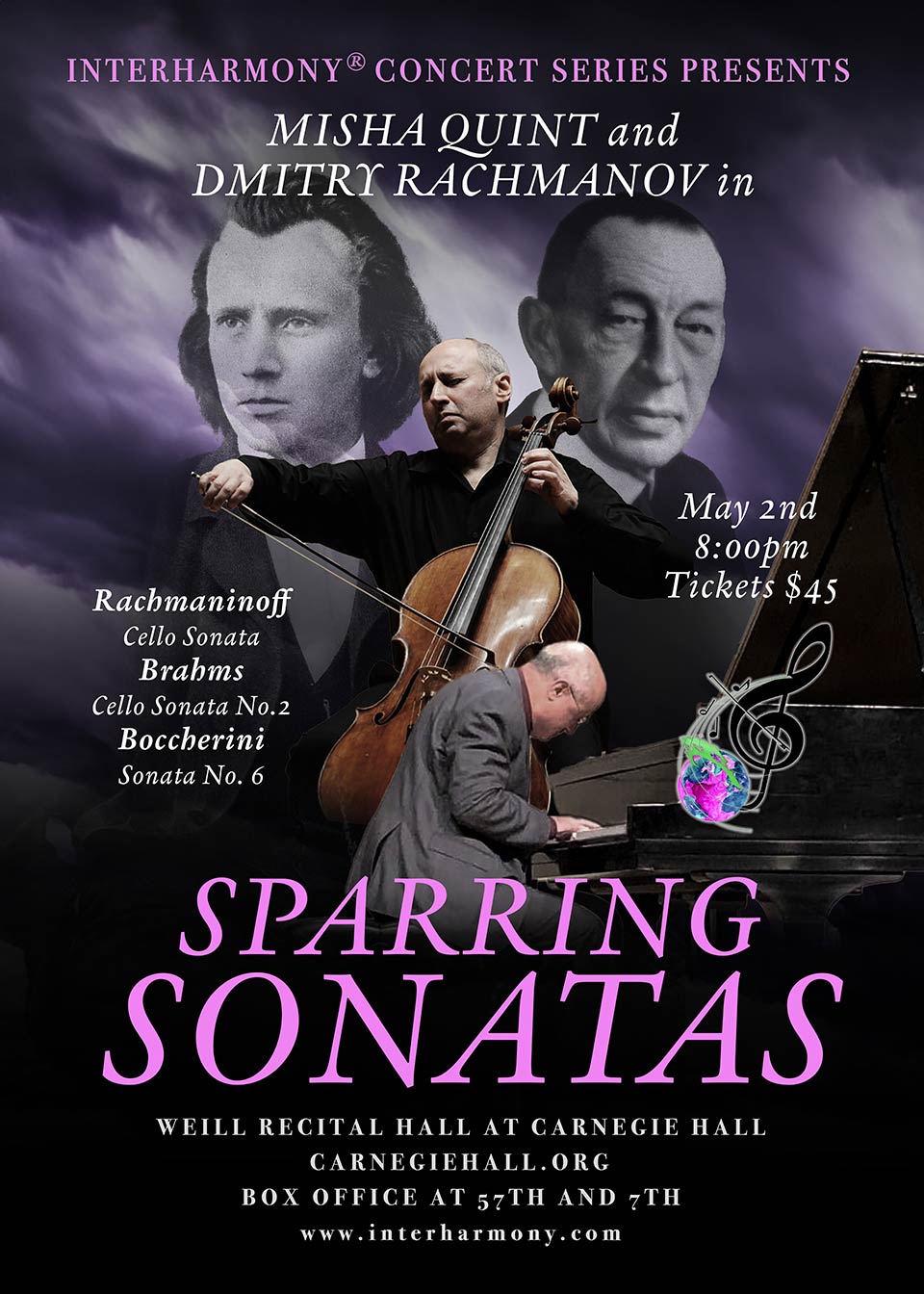
Cellist Misha Quint and pianist Dmitry Rachmanov will perform in “Sparring Sonatas” and battle3 larger-than-life sonatas with virtuosic cello and piano parts by Rachmaninoff, Brahms, and Boccherini at Carnegie Hall's Weill Recital Hall on May 2, 2024 at 8 PM as part of the InterHarmony Concert Series. Uniquely, all 3 sonatas were originally performed by the composers themselves, and all three composers were outstanding performers.Tickets are available for purchase online at www.carnegiehall.org or by calling CarnegieCharge at 212-247-7800. More information can be found at www.interharmony.com.
An aperitivo of Boccherini's Sonata No.6 in A Major will begin the concert. As the most popular of Boccherini’s sonatas, it is meant to showcase the composer-cellist’s ability to present something raucously difficult yet appear deceptively simple and elegantly pleasing to the audience. In Sonata, Quint and Rachmanov will cooperate before the real battle begins, a collaboration where both performer fighters are on the same side, taking on their “enemy” with grace and symmetric sincerity, at the same time staying within the bounds of the traditional sonata form.
After their classical Italian warm-up, Quint and Rachmanov will take on the Brahms Sonata No. 2 in F Major. Feverishly intense, the two fighters will spar together with the harmonic dissonance or conflict emerging as a seeming epic battle, oftentimes triumphant and others dark and brooding. Compared to the composer’s earlier Sonata in e minor, this one exudes the feeling of geniality and warmth, its melodies expressed by both instruments move through forms as a fighter or dancer with haunting themes or as a competition of emotional expression in the thicker, fast passages with remembrance of love lost or of past conquests. Brahms himself premiered Sonata in 1886 with his friend Robert Hausman, for whom the piece was written.
In the Cello Sonata, passion rules, fiery to the point of vehemence, now defiantly challenging, now painfully lamenting,” the critic Eduard Hanslick wrote of Brahms’s Sonata.
Following a brief respite for the fighters (a.k.a. performers), the final battle you’ve all been waiting for ensues. Quint and Rachmanov will take the stage in the fierce brawl that is Sonata in G Minor for Cello and Piano. (Actually, the 3rd slow movement is quite gorgeous, and considered by many to be one of the most beautiful and meaningful additions to the cello repertoire, used as an encore by many a soloist. But we’ll get to that.)
Following a huge disappointment with the adverse reaction to the premiere of his First Symphony, Rachmaninoff fell victim to a nervous breakdown for three years, and (in addition to his Second Piano Concerto)his only cello sonata served as his triumphant return and one of the final contributions to the collaborative realm of chamber music. After that he would focus solely on piano and orchestral compositions for the rest of his life.
Perhaps Sonata reflects Rachmaninoff’s creative struggle in the raging conflict between cello and piano: in its dramatic and elegiac first movement, dark second movement scherzo, the bittersweet lyricism of the third movement with its seemingly obsessive repetition of single notes in its main theme, and the triumphant fanfares in the finale fourth movement.
Will you imagine a battle or a dance, a friendly spar, or joyful collaboration? There’s only one way to find out. Come see “Sparring Sonatas: Quint and Rachmanov Battle Rachmaninoff and Brahms” at Carnegie Hall. More information can be found at www.interharmony.com.
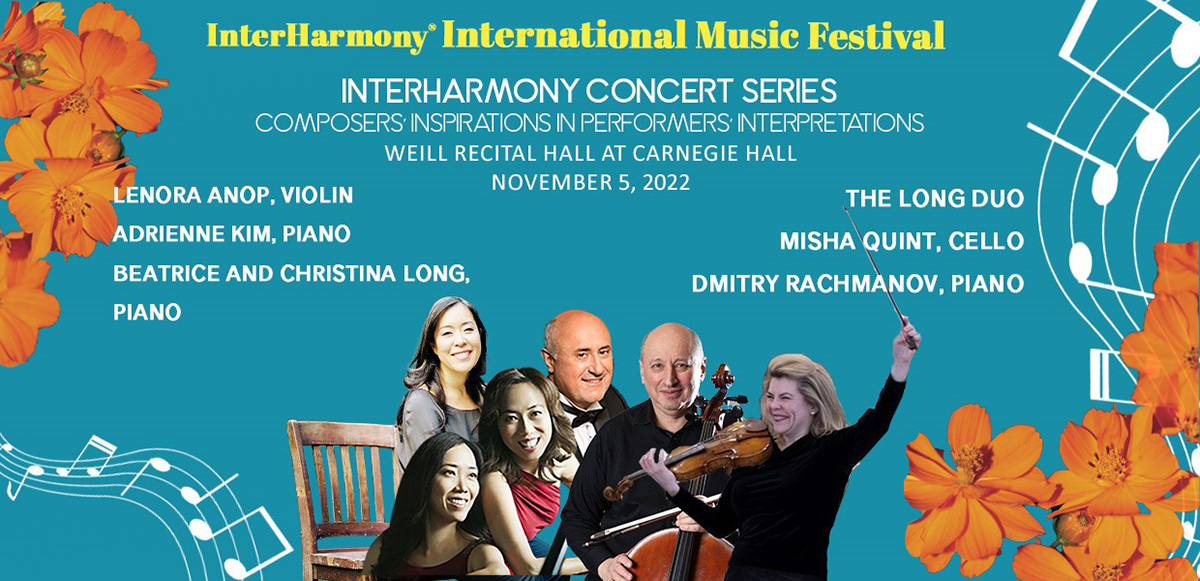
InterHarmony® International Music Festival is gearing towards a long-awaited autumn concert at Weill Recital Hall at Carnegie Hall on Nov 5 at 8PM. InterHarmony Concert Series’ 10th Anniversary Season will open with Composers’ Inspirations in Performers’ Interpretations featuring cellist Misha Quint, violinist Lenora Anop, and pianists Adrienne Kim, Dmitry Rachmanov, Beatrice Long and Christina Long (The Long Duo), all artists-in-residence during at InterHarmony’s summer festivals In Acqui Terme, Italy.
This concert will showcase the performers’ versatile abilities in distinct roles, from solo to piano 4-hands duos and trios; it will send the audience on a dichotomous musical journey of compositional interpretation and intent with pieces from the 18th to the 21st century by J.S. Bach, Rachmaninoff, Beethoven, Tchaikovsky, Mendelssohn, Ravel, Dvořák, Long, and Piazzolla. Tickets can be purchased online at www.carnegiehall.org, or by calling CarnegieCharge 212-247-7800. More information can be found at www.interharmony.com.
Do pieces change? What were composers thinking when writing them? Rachmaninoff’s Trio élégiaque No.1 in g minor opens the program. Composed by Rachmaninoff when he was only 18, élégiaque is an homage to his mentor Tchaikovsky in sonata form featuring 12 episodes filled with emotion and lyricism in under 15 minutes. Lenora Anop (violin), Misha Quint (cello), Dmitry Rachmanov (piano)
How is classical music transported to the modern world? Listeners will time travel back to the 18th century through a 21st century lens with Lenora Anop’s violin transcription of Bach’s Cello Suite no. 2 in d minor. The sonorous Prelude, filled with continuous echoing depth in the Allemande, somber yet creating a breath of uplifting spirit, will highlight the violin’s incredible, unmatchable timbre.
Tchaikovsky’s “youthful” Nocturne in F major is next. Its evocative, vocal-like dissonant chords will create an ethereal effect before Beethoven’s 6 Variations changes the mood with an original theme he later wrote into his famous Turkish March. Rachmaninoff’s Prelude in B-flat major, a rhythmically complex piece considered the “most daunting” of the preludes with a rhythmically complex left-hand ostinato against playing in contrast to a jagged right-hand melody line. Dmitry Rachmanov (piano)
Ravel’s La Valse is often linked to the visually artistic cubist movement. Premiered in 1920, early critics believed the composers’ inspiration for La Valse to be a musical commentary on the embodiment of disintegrating idioms or the demise of society in the aftermath of World War I. Ravel himself dispelled the controversy of his intent and described the dance merely as “a waltz…an ascending progression of sonority, to which the stage comes along to add light and movement”. Beatrice Long (piano)
Listeners will witness The Long Duo, two sister piano virtuosos, perform simultaneously. Inspired by Brahms’ Hungarian Dances, Dvořák’s Slavonic Dance, Starodávný, evokes the spirit of old folk dances or a cherished memory. Considered one of the most difficult in the piano duet repertoire, Mendelssohn’s Allegro Brilliant was dedicated to concert pianist Clara Schumann, and premiered by the composer and dedicatee. The music world was small, even in the 1800’s.
Then the Long Duo will perform their original composition, Fantasy on a Taiwanese Folk Song, Ali Mountan, incorporating jazz-influenced tonalities and end their set with Piazzolla’s versatile and popular Libertango. Beatrice Long, Christina Long (The Long Duo)
Penultimately, cellist Misha Quint will perform 3 heart-wrenching Tchaikovsky pieces with pianist Adrienne Kim. Both Nocturne and the Pezzo capriccioso, a combination of lighting speed and romantic melancholy, were first performed by Anatoly Brandukov on cello and Tchaikovsky conducting or playing piano. Pezzo was composed in a single week in 1887, and Valse sentimentale was originally for solo piano.
Mendelssohn’s Piano Trio No.2 in c minor will conclude the concert. A trio written for three soloists and the last chamber work that Mendelssohn saw published, the opening foreboding tone filled with rich harmonic language shifts to a lighter, more lyrical movement. The intricate, technically demanding Scherzo shifts the mood. Finale creates a musical link between the 19th and 16th centuries by quoting the melody from the psalm known colloquially as “Old Hundredth”. Lenora Anop (violin), Misha Quint (cello), Adrienne Kim (piano)
Music is always changing, forever different, and its new moment in time. Composers’ Inspirations and Performers’ interpretations dichotomy expresses how classical musicians do not just play music written on paper; they interpret it and make it their own.
Buy Tickets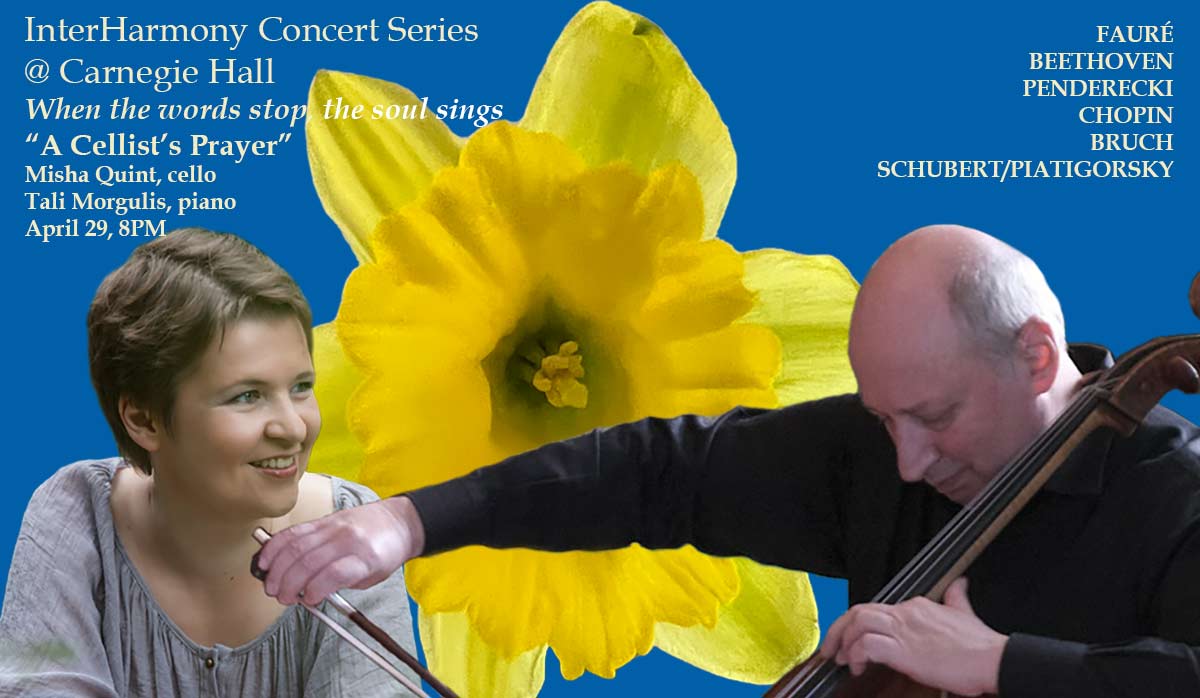
InterHarmony® International Music Festival is happy to present the triumphant return of the InterHarmony Concert Series with a performance by Russian-born cellist Misha Quint and Ukrainian-born pianist Tali Morgulis of “When the Words Stop, the Soul Sings. A Cellist’s Prayer”. This inaugural event, the first since 2020, follows on the heels of a successful summer of festivals in Italy and online. It is a musical expression of the many emotions people around the world are currently feeling, featuring pieces which allow the emotive nature of the cello to shine. The performance will take place on April 29, 2022 at 8 PM at Weill Recital Hall at Carnegie Hall. Tickets can be purchased online at www.carnegiehall.org, or by calling CarnegieCharge 212-247-7800. More information can be found at www.interharmony.com.
The program begins with Faure’s Elegie, the first movement of a never-realized sonata, and then segues into Beethoven’s Cello Sonata No. 2 in g minor, Op. 5, an expressive and artistically intricate piece which perfectly marries the piano and cello parts. Then, Quint pays homage to Krzysztof Penderecki, performing Per Slava using Penderecki’s sonoristic style. In these times, this piece takes on extra significance as it is dedicated to renowned Russian cellist and human rights advocate Mstislav Rostropovich.
Emotions continue to crescendo with a performance of Max Bruch’s Kol Nidrei, Op.47. The tune is an emotionally charged prayer which is sung throughout the world to open services on the holiest day of the Jewish year. It said with great devotion, with the hope that the next year will be one filled with happiness and redemption. Bruch’s adaptation retains both the solemnity and underlying optimism of the original. Misha Quint and Tali Margulis expertly voice this great breadth of emotion through their respective instruments, as though the cello and piano were crying out.
The performance continues with Chopin’s Cello Sonata in g minor, Op. 65. This Sonata, his last major work, has roots in the romantic style, but also evolves into tempestuous waves of virtuosity. Although the first movement was not played at the premiere, it is now considered ahead of its time.
The program concludes with Schubert’s Introduction, Theme, and Variations, arranged by Gregor Piatigorsky, a Ukrainian-born cello virtuoso who escaped from Russia to Poland before coming to the U.S. This piece showcases Misha Quint’s artistry and bow technique while continuing to propel the audience’s emotional journey.
Cellist Misha Quint and pianist Tali Margulis, each experts at their craft, will bring their knowledge and artistry to the Carnegie Hall stage in a breathtaking, not-to-miss event for when the words stop, the soul sings.
Gabriel Faure: Elegie
Ludwig van Beethoven (1770 – 1827): Sonata No.2 in g minor, Op.5, No.2
Krzysztof Penderecki (1933 – 2020): Per Slava for Solo Cello
Frédéric Chopin (1810 –1849): Cello Sonata in g minor, Op.65
Franz Schubert (1797 –1828)/
Gregor Piatigorsky (1903 – 1976)
Introduction, Theme, and Variations
Misha Quint, cello
Tali Morgulis, piano
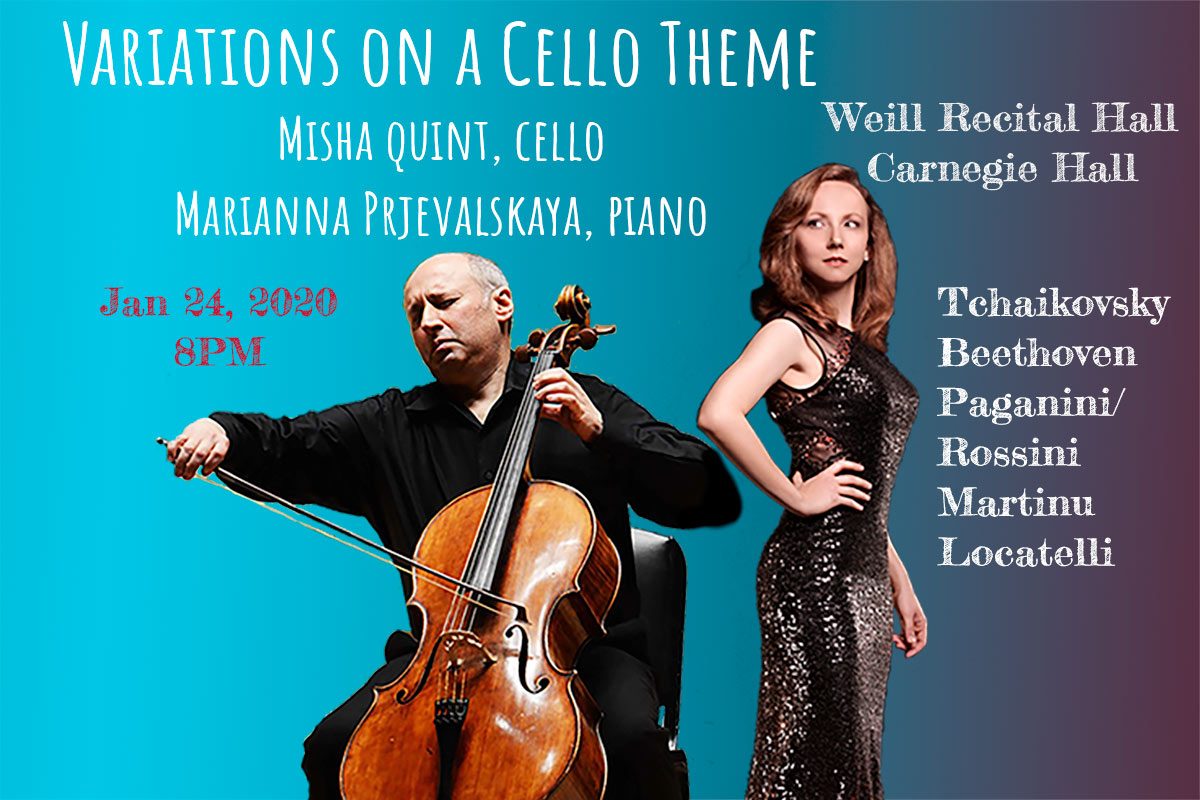
InterHarmony® International Music Festival presents “Variations on a Cello Theme” with Russian born cellist Misha Quint and pianist Marianna Prjevalskaya as part of the InterHarmony Concert Series at the Weill Recital Hall at Carnegie Hall on January 24 at 8PM.
Like a symphony enriched with famous melodic delicacies and sparkling virtuosity, “Variations on a Cello Theme” offers New York’s music lovers a rich, versatile program grasping the whole range of the cello playing art, perfectly reflecting the theme and variations musical form, gradually unraveling from Beethoven to Tchaikovsky, and eventually becoming a variation in itself. Tickets can be bought online at www.carnegiehall.org, or by calling CarnegieCharge 212-247-7800.
Each half of the concert opens with two sets of Variations by Beethoven on themes of Mozart's The Magic Flute, as part of Beethoven’s 250th birthday celebration. The original form of the duet – with each singer presenting the tune separately, then both singing together – is preserved in the variations that follow. Both sets give the opportunity to showcase the best of their timber qualities and dialogue between instruments.
Locatelli’s famous Sonata in D Major, rarely performed because of the presence of the virtuosic staccato bow stroke and originally written for violin, evinces themes with evolving fireworks of virtuosic roulades so known to variation form.
Martinů’s fiery Variations on a Slovak Theme, with its open melodic lines and impressive rhythmical combinations, injects an eastern flavor and makes the anticipation of the second half of the concert even more intriguing. Martinů peppered indigenous Czech folk songs into this piece.
The presence of Paganini’s Variations on a Theme of Moses by Rossini on One String, especially when it’s a cello string, means that the moment has arrived - gloves off. With all the harmonics and passages encompassing the whole fingerboard, one could think that it is the best selection for the finale. Instead, Tchaikovsky’s Variations on a Rococo Theme pours the breath and wrath of the ocean into the program. Though this iconic composition is mostly performed with orchestra, it was originally written for cello and piano, adding a more intimate element to Tchaikovsky’s canvas and at the same time still possessing its monumental nature as the last showpiece of the exhibition of variations. More information can be found at www.interharmony.com.
Beethoven: 7 Variations on In men who know the feeling of love from Mozart's The Magic Flute
Locatelli: Sonata in D Major for Cello and Piano, Op.6
Martinu: Variations on a Slovak Theme
Beethoven: 12 Variations from Mozart's The Magic Flute, Papageno's Aria
Paganini/Rossini: Variations on a Theme on One String by Rossini, Moses
Tchaikovsky: Variations on a Rococo Theme for Cello and Piano
Misha Quint, cello
Marianna Prjevalskaya, piano
Photography: David Milkis, Abby Gaudette, Clemente D'Alessio.
The first 10 photos can be downloaded as high resolution press photos.